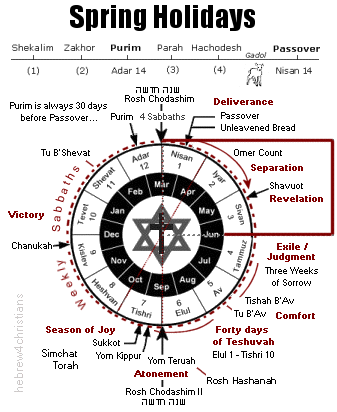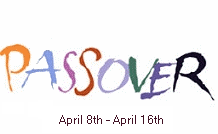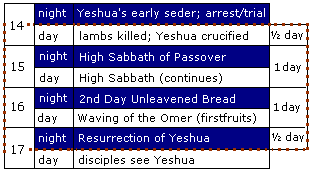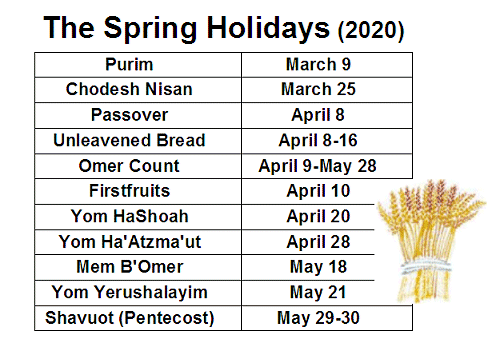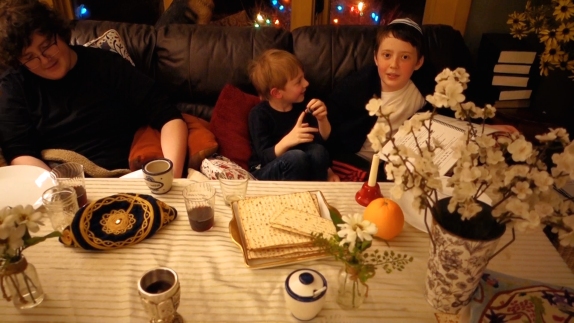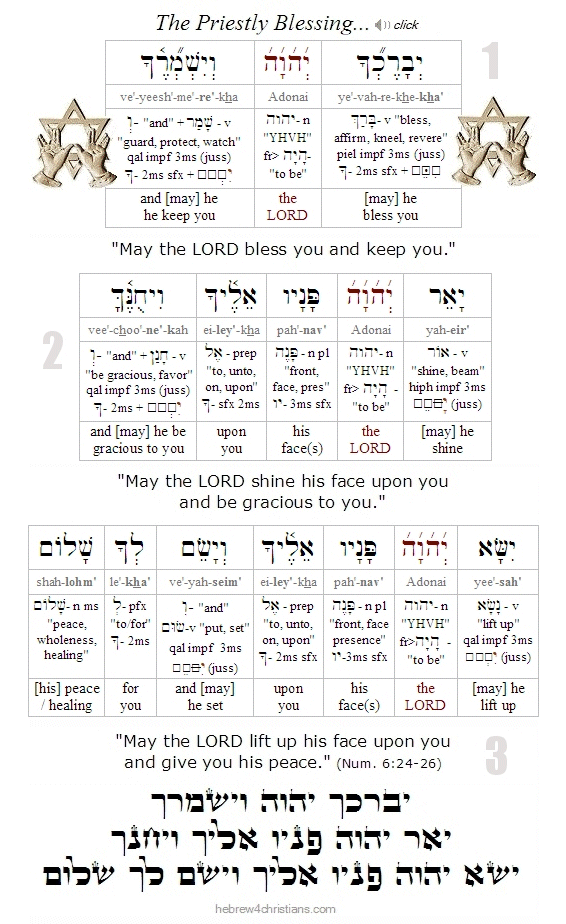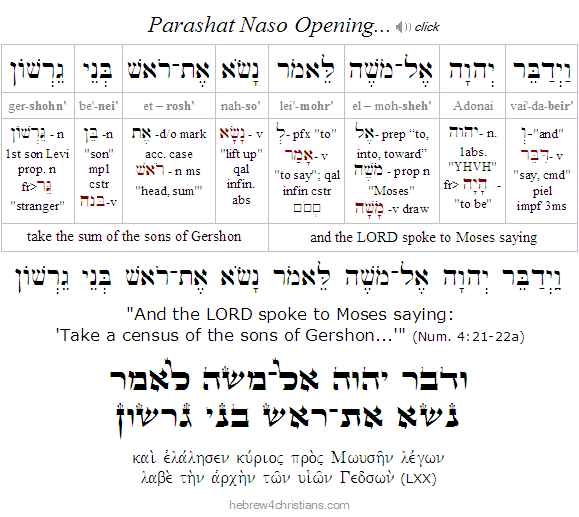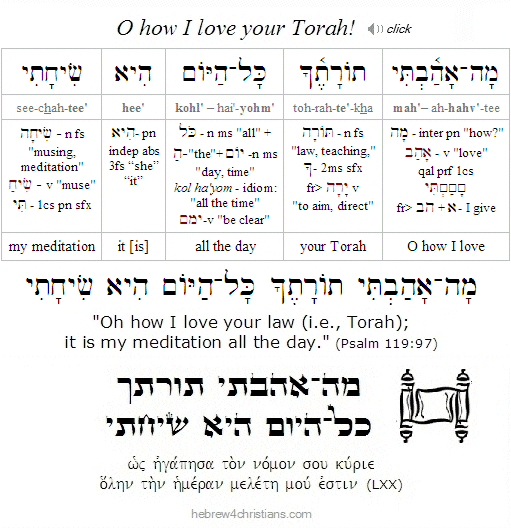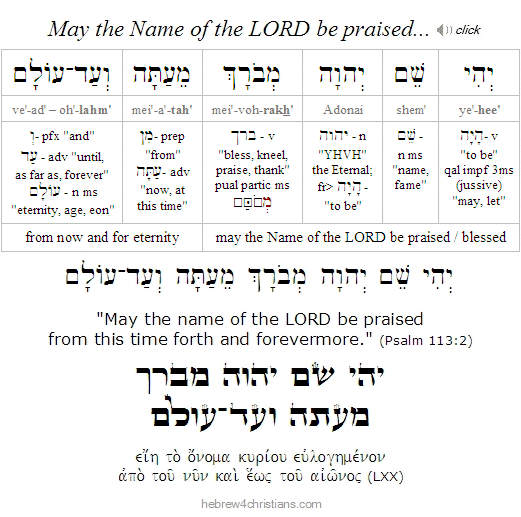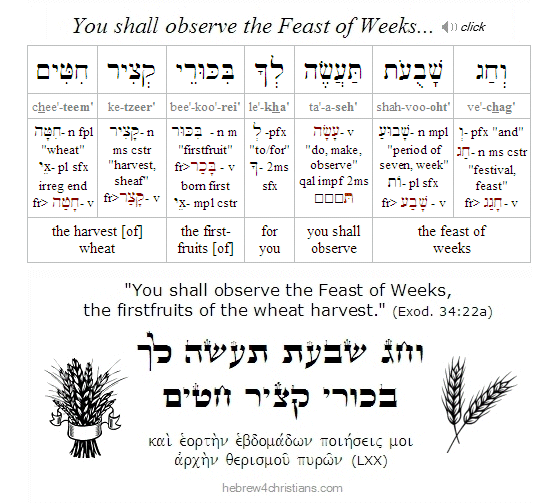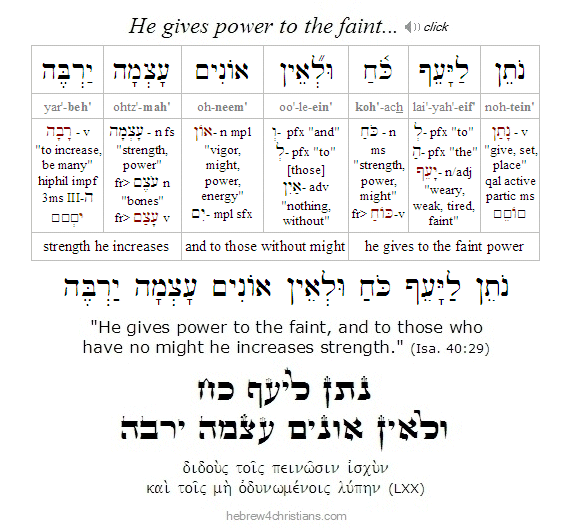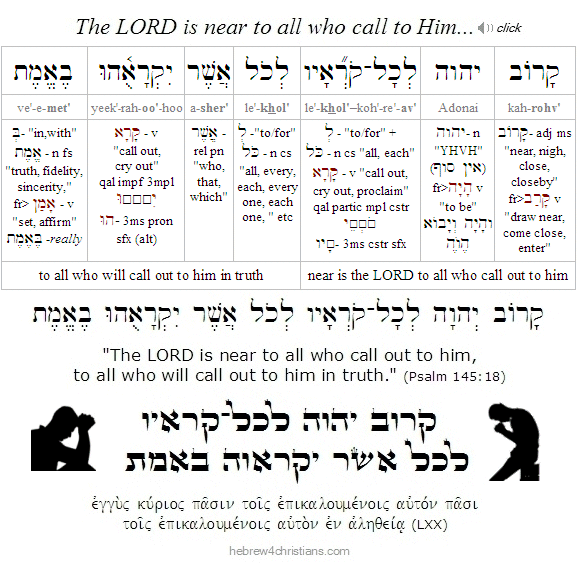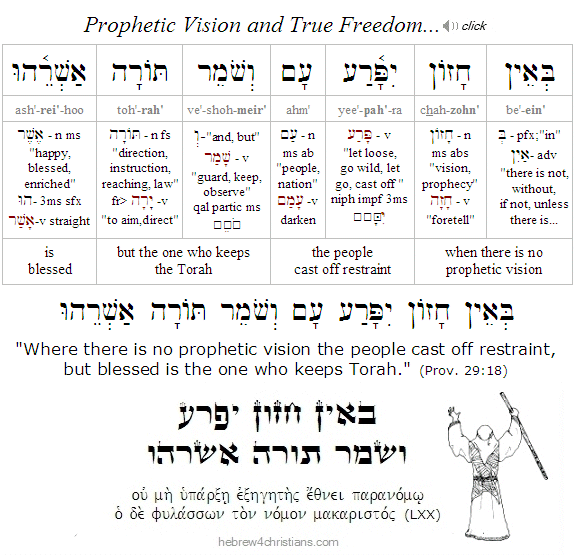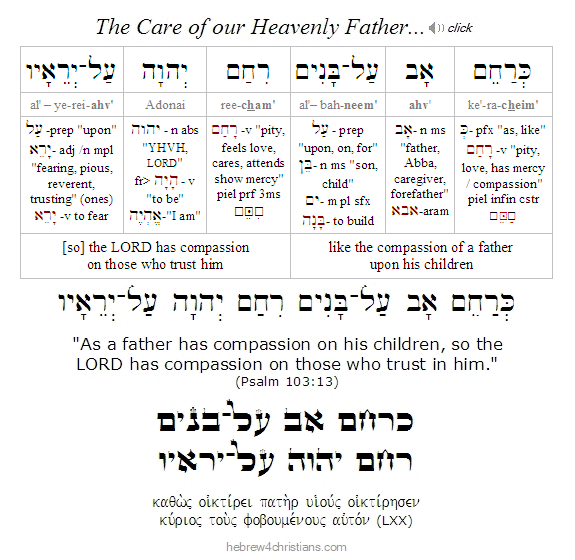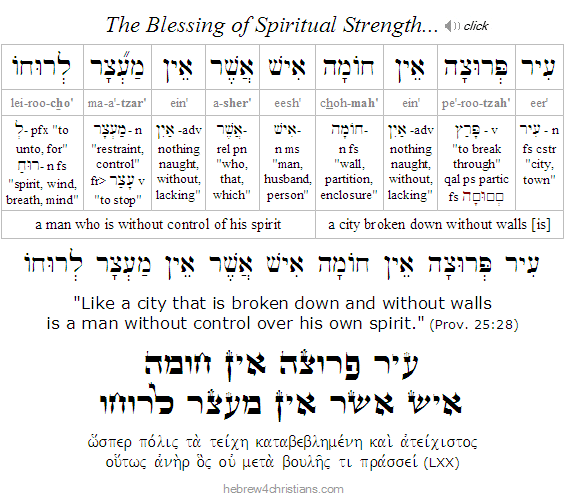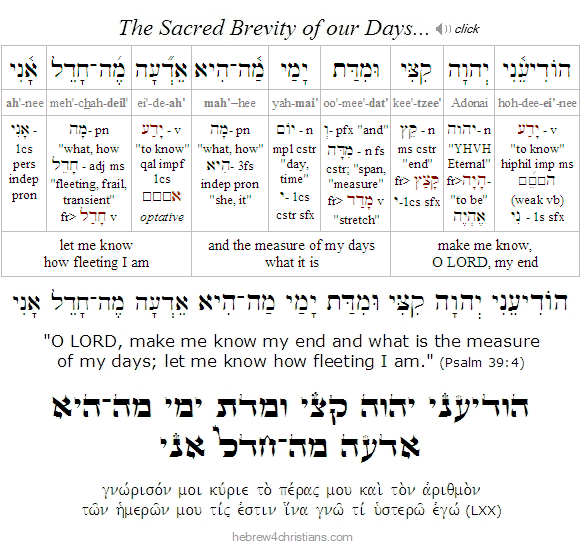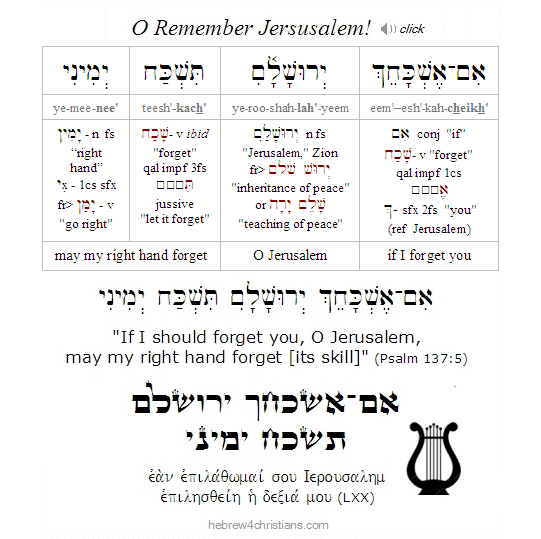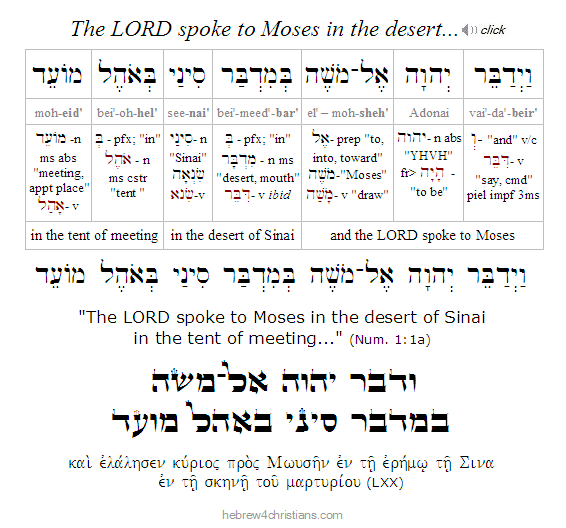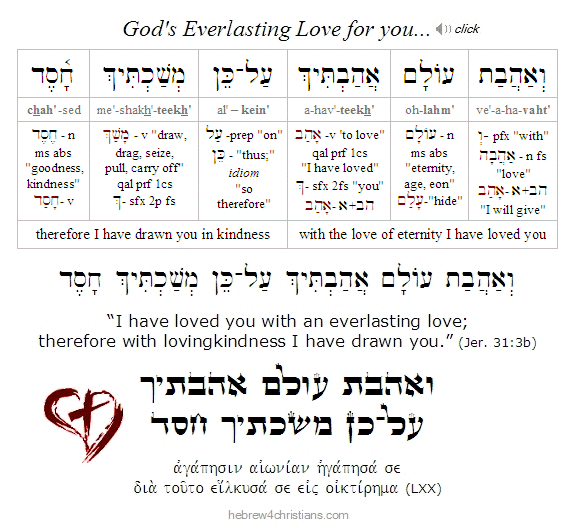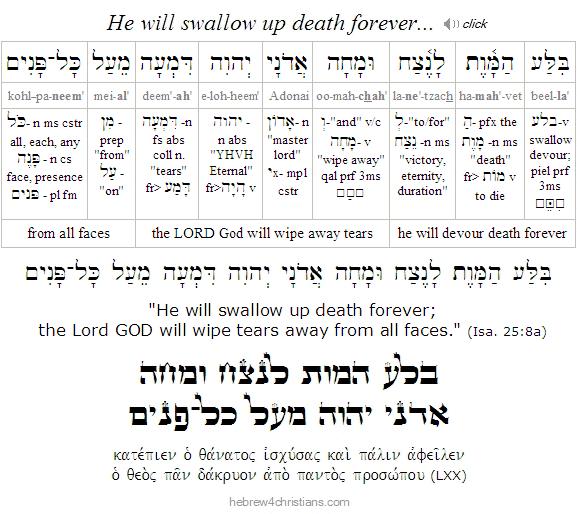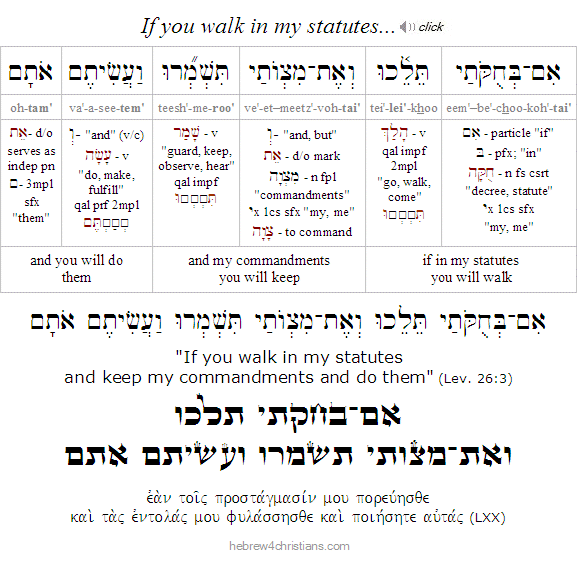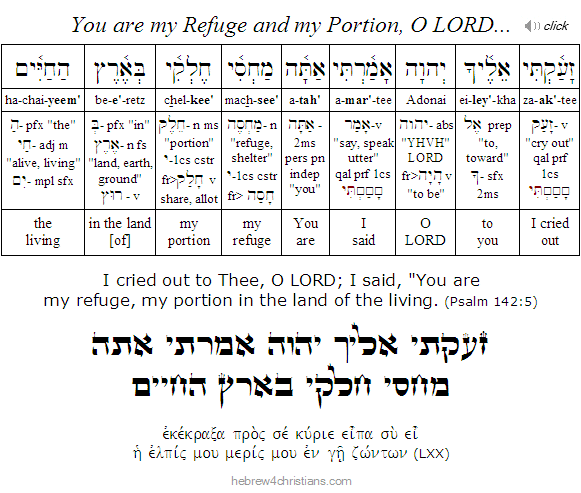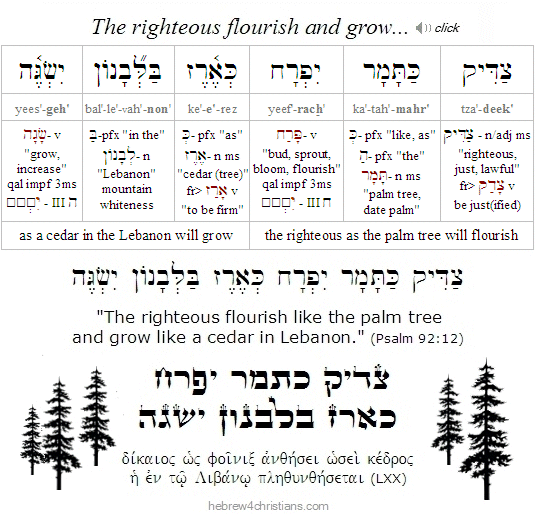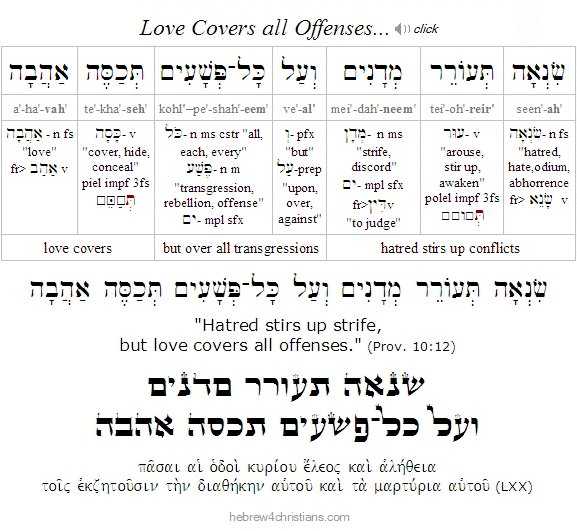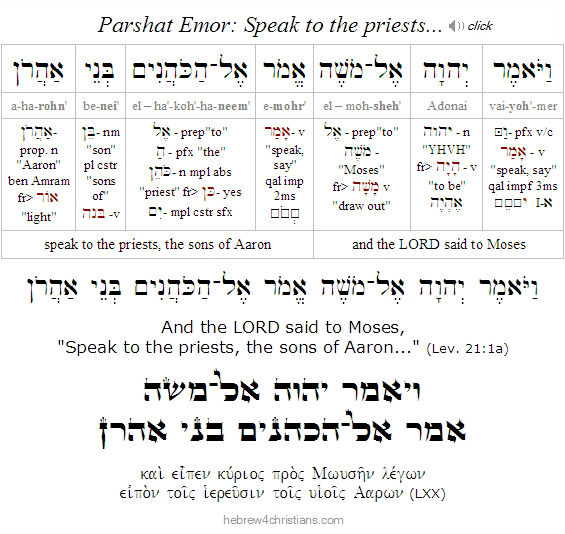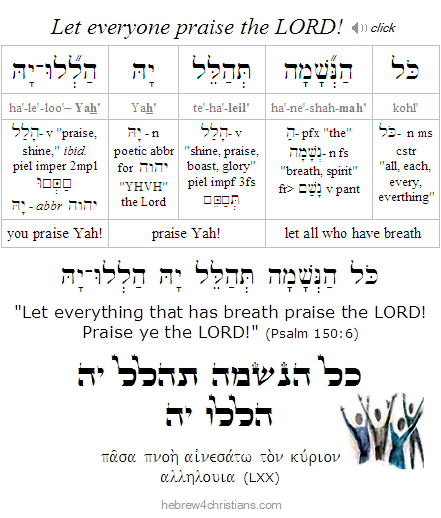|
Jewish Holiday Calendar
For May 2020 site updates, please scroll past this entry....
Spring is the start of the Biblical Year and is marked by two of the Shelosh Regalim (three annual pilgrimage festivals): Pesach (Passover) and Shavuot (Pentecost). The holiday of Shavuot is held seven weeks (or fifty days) following the morning after Pesach.
Dates for Passover 2020:
Passover Seder Guide
The Spring Holidays:
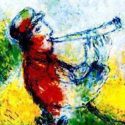
The spring holidays (חגי האביב) provide a portrait of the death, burial, and resurrection of the Messiah: Yeshua was crucified on erev Pesach (during the time of the sacrifice of the Passover lambs), buried during Chag Hamotzi (the festival of Unleavened Bread), and was resurrected from the dead on Yom Habikkurim (the Day of Firstfruits). Fifty days after Passover, on the climactic holiday of Shavuot (i.e., the feast of Pentecost), the Ruach HaKodesh (Holy Spirit) fell on the believers in fulfillment of the promise given by our Lord. Note that the giving of the Holy Spirit occurred precisely according to the calendar countdown given in the Torah (Lev. 23:15-16), and that it occurred after the resurrection of Yeshua -- just as our Messiah foretold (John 16:7; Acts 1:6-8, 2:1-4). This proves that the feasts of the LORD (מוֹעדי יהוה) were not abolished after the crucifixion. The meaning of the gospel is prefigured in the holidays given in Torah. See Luke 24:27, 24:44; John 5:46; Acts 26:22, etc.
Kindly note that in accordance with both Torah and Jewish traditon, the following holiday dates begin at sundown (ויהי־ערב ויהי־בקר; Gen. 1:5).
- Month of Nisan (Wed. March 25th [eve] - Thurs. April 23rd [day])
- Month of Iyyar (Thurs. April 23rd [eve] - Sat. May 23rd [day])
- Month of Sivan (Sat. May 23rd [eve] - Sun. June 21st [day])
Note: For more information, see the Calendar Pages....

Happy Passover, friends! (click photo for more)
May 2020 Updates
Note: If any page content appears to be missing, please refresh the page...
This Week's Torah Reading (נשא)
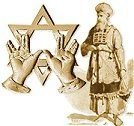
05.31.20 (Sivan 8, 5780) Shavuah tov friends... Our Torah portion for this week (i.e., parashat Naso, "lift up!") includes the cornerstone blessing that Aaron and his sons (i.e., the priests) were instructed to declare over the people of Israel: "The LORD bless you and keep you; the LORD shine his face upon you and be gracious to you; the LORD lift up his face upon you and give you his peace" (Num. 6:24-26). Notice that the Hebrew text of the blessing (see below) begins with three words, is comprised of three parts, invokes the divine Name three times, and is therefore appropriately called "the three-in-one blessing" (שלוש בברכה אחת). Notice also that the words are spoken in the grammatical singular rather than plural because they are meant to have personal application, not to be a general benediction over a crowd of people. The phrase, "the LORD lift up his face upon you..." (ישא יהוה פניו אליך) pictures the beaming face of a parent lifting up his beloved child in joy... The repetitive construction of God "lifting up His face" (יהוה פניו אליך) indicates that he gazes upon you in love and blessing. Undoubtedly Yeshua recited this very blessing over his disciples when he ascended back to heaven, though He would have spoken it in the grammatical first person: "I bless you and keep you (אני אברך אותך ואשמור לך); I shine upon you and am full of grace toward you; I lift up my face toward you and give you my shalom" (see Luke 24:50-51).
יברכך יהוה וישמרך
יאר יהוה פניו אליך ויחנך
ישא יהוה פניו אליך וישם לך שׁלום
ye·va·re'·khe·kha' · Adonai · ve·yeesh'·me·re'·kha
ya·eir · Adonai · pa·nav · e·ley'·kha · vee·khoon·ne'·kah
yees·sa · Adonai · ph·nav · e·ley'·kha · ve·ya·seim · le·kha · sha·lom

"The LORD bless you and keep you;
The LORD shine his face upon you and be gracious to you;
The LORD lift up his face upon you and give you his peace."
(Num. 6:24-26)
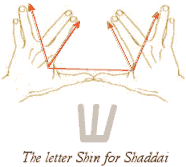
Download Hebrew Study Card
Note: The verbs in this blessing are all "jussive," usually expressing wish, desire, or command, though understood in context (i.e., as part of the blessing recited by the kohanim during ceremonial occasions), the verbs should be regarded as declarative or oracular. The idea of God "lifting up his face" is an idiomatic expression meaning that he gazes upon you in peace and blessing... To learn more about this blessing, click here.
The Importance of Law...
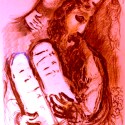
05.29.20 (Sivan 6, 5780) The importance of the Torah, or "law" of God, cannot be overstated, friends, and the holiday of Shavuot recalls and celebrates its importance in our lives. Yeshua plainly said to his followers: "Do not think that I have come to abolish the Law or the Prophets; I have not come to abolish them but to fulfill them. I tell you the truth, until heaven and earth pass away not the smallest letter or even a stroke of a letter (קוצו שׁל יוד) will pass from the law until everything comes to pass. So anyone who breaks one of the least of these commands and teaches others to do so will be called least in the kingdom of heaven, but whoever obeys them and teaches others to do so will be called great in the kingdom of heaven" (Matt. 5:17-19). He further solemnly warned: "Not everyone who says to me, 'Lord, Lord,' will enter into the kingdom of heaven– only the one who does the will of my Father in heaven. On that day, many will say to me, 'Lord, Lord, didn't we prophesy in your name, and in your name cast out demons and do many powerful deeds?' Then I will declare to them, 'I never knew you. Go away from me, you workers of lawlessness' (Matt. 7:21-23).
To the ungodly, "freedom" means being lawless, that is, acting under their own authority apart from the will of God. This of course was the original temptation in Eden, when the nachash (serpent) told Eve that if she acted under her own authority, her eyes would be "opened" and she would be "like God," knowing both good and evil (Gen. 3:5). That is always the creed of the wicked: "Do as thou wilt..." True freedom, however, is not the supposed right to do whatever you want, but instead is the power to do what is right, living in harmony with moral reality, and being liberated from the slavery of impulses to do evil. The law of God, then, is the blessing of having boundaries, order, and moral sanity within our lives, and that is why the Holy Spirit inscribes the law "within" us - to help guide our steps, protect our way, and to empower us to live in obedience to the truth of God (Jer. 31:33). If you are led by the Spirit, you are no longer enslaved to the law of sin and death -- that is, the lower nature and its idolatrous impulses -- but you will bear the fruit of righteousness, goodness and truth (Gal. 5:18; Eph. 5:9). Let no one deceive you with vain words. You cannot serve two masters... If you know that the Messiah is righteous, you know that every one that does righteousness is born of God (1 John 2:29).
God did not send the Savior to suffer and die on the cross so that people would disregard his moral will and go right on sinning. No, by his sacrifice Yeshua delivers us from the power of sin and death and thereby empowers us to do his will: "For we are his workmanship, created in Messiah for good works that God prepared beforehand" (Eph. 2:10). Followers of Messiah are to be "filled with the knowledge of his will in all spiritual wisdom and understanding, to live our lives in a manner worthy of the Lord, fully pleasing to him, bearing fruit in every good work and increasing in the knowledge of God" (1 Cor. 1:9-10). Therefore the message of Shavuot is that we should walk worthy of God, who has called us unto his kingdom and glory (1 Thess. 2:2). Chag Shavuot Sameach.
Chaos and the End of Days...

05.29.20 (Sivan 6, 5780) We are living in stressful times; the world is drunk with its delusions and truth has fallen in the streets... Outrage and unthinking stupidity are dark motifs of our moribund and cowardly culture. The Apostle Paul wrote that the time before the "End of Days" would be "perilous" and full of unrelenting human depravity and lawlessness (2 Tim. 3:1-5). Yeshua warned that apostasy would abound and that the hearts of many would run cold as ice (Matt. 24:12). In light of the raging spiritual war going on all around us, the following needs to be emphatically restated: "The important thing is to not lose your mind..."
The mind is the "gateway" to your heart, and it is therefore essential to guard your thinking by immersing yourself in the truth... "Not losing your mind" therefore means being grounded in what is real, and it therefore means understanding your identity and provision as a child of God. "God has not given us the spirit of fear, but of power (גבורה) and of love, and of a "sound mind" (σωφρονισμός), lit. a "delivered" mind, "healed" from chaos and despair (2 Tim. 1:7). The Greek word "sound mind" (σωφρονισμός) comes from the verb sodzo (σῴζω), meaning "to save," from saos (σάος) "safe," in the sense of being under restraining influence of the Spirit of God... The closest Hebrew word might be musar (מוסר), moral "discipline."
Part of the task of "guarding your mind" is being able to discern between good and evil. "The fear of the LORD is to hate evil (יראת יהוה שׂנאת רע); I hate arrogant pride and the evil way and perverse utterances" (Prov. 8:13). As the prophet Amos cried out, "Hate what is wrong, love what is right" (Amos 5:15). We are called to love the truth and abhor the lie (Psalm 119:163, Zech. 8:19; Prov. 12:22). Tolerating sin in a world ripe for judgment is a tacit form of "collaboration" with the enemy... Indeed, the only thing regarded as intolerable in the devil's world is the objection that people have a supposed "liberty" to sin. But the LORD is clear on this point: "Woe to those who call evil good and good evil, and who turn darkness into light and light into darkness, to those who turn bitter into sweet and sweet into bitter. Woe to those who are wise in their own eyes, and shrewd in their own sight!" (Isa. 5:20-21).
Lo ta'amod al dam re'ekha: "You must not stand idly by when your neighbor's life is at stake" (Lev. 19:16). The principle of lo ta'amod (לא תעמד) means that we have a moral duty to speak the truth when others are victimized. "Standing idly by" can therefore mean refusing to come forward with the truth about a situation from fear of the consequences, but it can also mean excusing the sin of our culture and of our friends. "A truthful witness (עד אמת) rescues lives, but the one who breathes lies (ויפח כזבים) brings deception" (Prov. 14:25).
It is the truth that sets people free to serve God, but this presupposes the ability to discern how we all become enslaved to deception. "You are to distinguish between the holy (i.e., ha'kadosh: הקדוש) and the common (i.e., ha'chol: החל), and between the unclean (i.e., ha'tamei: הטמא) and the clean (i.e., ha'tahor: הטהור)" (Lev. 10:10, see also Ezek. 44:23). Just as God separated the light from the darkness (Gen. 1:4), so we are called to discern between (בֵּין) the realms of the holy and the profane, the sacred and the common, and the clean and the unclean. Indeed, the Torah states "God called the light Day, and the darkness he called night," thereby associating His Name with the light but not with the darkness (Gen. 1:5).
A good friend will hold your "feet to the fire" and help you stay honest with yourself... He or she will encourage you to "press on" to realize your true identity as God's child. As it is written in Proverbs: "One who rebukes a person shall in the end find more favor than the one who flatters with words" (Prov. 28:23). Tokhechot may be likened to a good Father's moral correction of a son that leads to life (Prov. 6:23).
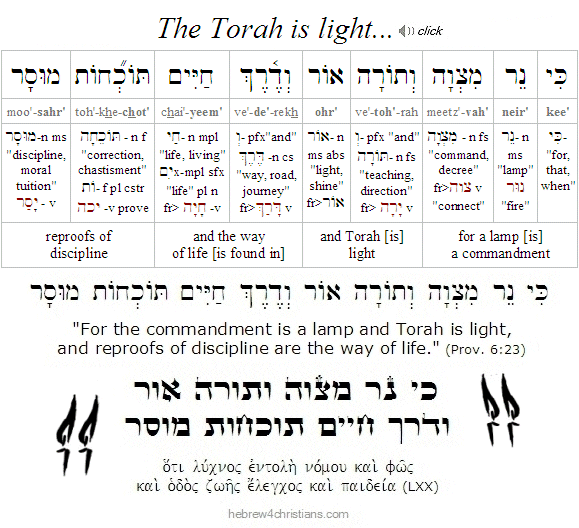 |
Ultimately the problem we have with "holiness" is that we are decidedly unholy people. This is similar to the idea that the Law is "holy, just, and good," but we are "sold into slavery to sin" (Rom. 7:12-14). But thank God for our Savior Yeshua, who graciously imparts holiness to us and sets us free from the tyranny of vanity (1 Cor. 1:30; Titus 3:5; Rom. 8:1-2). Because of Him, we do not work toward a place of victory, but rather from the place of His victory (1 Cor. 15:57)! Our LORD Yeshua -- the Killer of death; the Slayer of the Serpent; the final Victory of God's awesome love for us! יהי שם יהוה מברך מעתה ועד־עולם - "May the Name of the Lord be praised from this time forth and forevermore" (Psalm 113:2).
Evil and Stupidity...
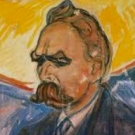
05.29.20 (Sivan 6, 5780) Dietrich Bonhoeffer (1906-1945), a German pastor who was surrounded by the atrocious evil of Nazi Germany and who was murdered at their hands, regarded stupidity as more dangerous than outright evil, since stupidity is a type of irrationality, a chosen ignorance of what is real and true. Against such willed ignorance we are often defenseless, since any reasoning that appeals to transcendental moral truth finds no traction, carries no weight, and has no effect. The devil, then, seeks first of all to stupefy people, that is, to drug them or flatter and persuade them to think that there is no need to engage in serious thinking or to humbly question their assumptions... As William James observed: "A great many people think they are thinking when they are merely rearranging their prejudices." The antidote to unthinkingly accepting the biases and inculcated prejudices of the world is to humble ourselves by learning to sincerely respect the Reality of God: "The fear of the LORD is the beginning of knowledge; but fools despise wisdom and correction."
Soren Kierkegaard had earlier defined stupidity to be a category of the "group-think" of the crowd. He wrote: "Wherever the crowd is, there is untruth, so that, for a moment to carry the matter out to its farthest conclusion, even if every individual possessed the truth in private, yet if they came together into a crowd (so that "the crowd" received any decisive, voting, noisy, audible importance), untruth would at once be let in... Indeed, the crowd is untruth. There is therefore no one who has more contempt for what it is to be a human being than those who make it their profession to lead the crowd. ... For to win a crowd is not so great a trick; one only needs some talent, a certain dose of untruth and a little acquaintance with the human passions" (Upbuilding Discourses).
Those who deny that moral truth exists are themselves making a truth claim, namely the claim that there is no such thing as objective truth (or that knowledge of the world is not possible). This self-inflicted incoherence is a sign of irrationalism, of course, the abandonment of reason, which perhaps is the ulterior motive for such manner of thinking, after all. The person who denies moral truth does so to escape the demands of truth – to flee from personal responsibility before moral and spiritual Reality. It is a form of "wish-fulfillment" to deny that people are not responsible for what they believe and how they live their lives. The ancient pagan world at least esteemed honor and believed in the pursuit of virtue and truth, but today's post-Christian world is nihilistic, anarchist, and therefore marks a return to barbarism.
The ground of all right thinking about reality is "wonder," or the sense that life itself is something mysteriously beautiful, amazing, and therefore inherently sacred. This is sometimes called yirat Adonai (יראת יהוה), "the fear of the LORD" that leads to wisdom. Right thinking therefore begins with consciousness of the good (i.e., hakarat ha'tov: הכרת הטוב), that is, with the awareness that life itself a gift, a mystery, and a hallowed question... We seek our origin, our essence, and our purpose -- and in our seeking we seek the LORD. We long for deliverance from what keeps us from healing, from love, from real hope. And as we seek, the wonder of the LORD God never ends. As Yeshua said, "Ask, and it will be given to you; seek, and you will find; knock, and it will be opened to you" (Matt. 7:7).
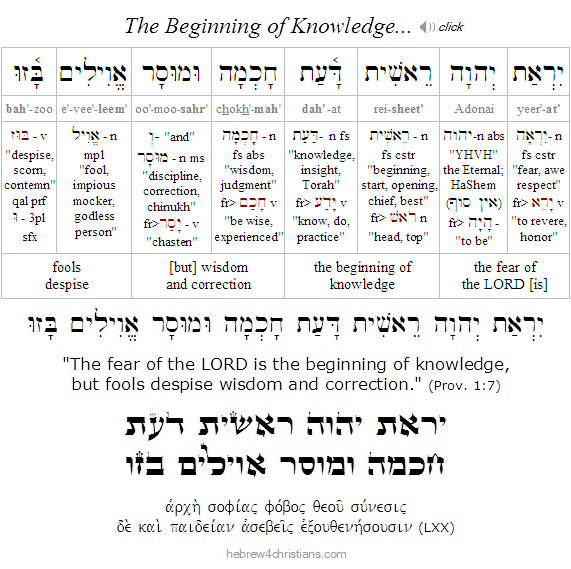 |
 |
Everyday Revelation...
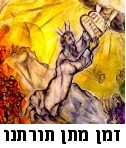
05.29.20 (Sivan 6, 5780) The Kotzker rebbe asked, "Why is Shavuot ("Pentecost") called 'zman mattan torateinu,' the time of the giving of our Torah, rather than 'zman kabbalat torateinu,' the time of the receiving of our Torah? The reason is that on that momentous day at Sinai, only the giving of the Torah occurred, whereas the receiving of the Torah must take place each and every day, as it says, "Trust in the LORD 'bekhol libbekha' (בְּכָל־לִבֶּךָ) - with all your heart; and know Him 'bekol derakhekha' (בְּכָל־דְּרָכֶיךָ), in all your ways" (Prov. 3:5-6). The giving of the Torah is described as a "loud and never-ending voice" (Deut. 5:22), though it is our constant responsibility to shema – to receive the invitation of God's heart.
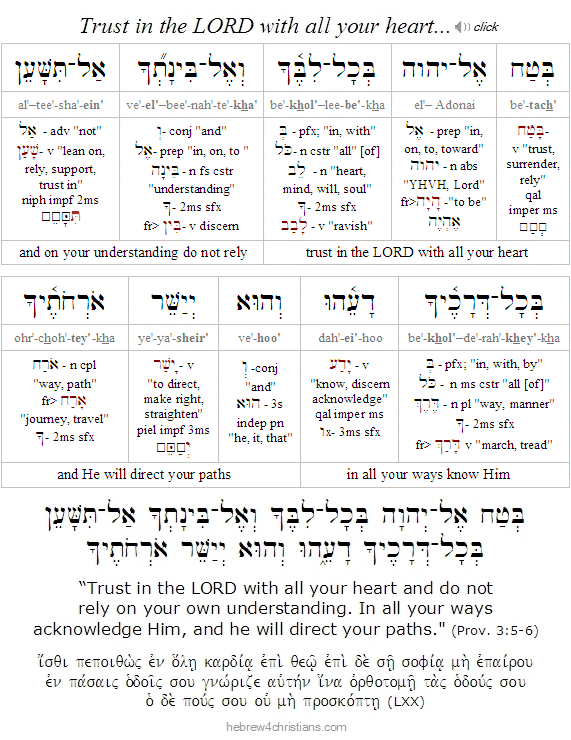 |
"Trust in the LORD with all your heart... know Him in all your ways." The Hebrew word for trust is "bittachon" (בִּטָחוֹן), from a root word (בָּטָח) that means "to lean upon," to feel safe and secure.... Bittachon describes emotional acceptance of the goodness of the LORD. Some of the sages have said that while emunah (אֱמוּנָה), or "faith," represents a state of cognitive understanding (בִּינָה) that God is involved in all the events of the universe, bittachon means emotionally trusting that the Lord is present in every situation for your good.... Rabbi Bechaya put the distinction this way: "Everyone who trusts has faith, but not everyone with faith trusts." Bittachon is an intuitive awareness of the personal love of God for your life, coupled with complete trust that He deeply cares for you (Rom. 8:28). It is an expectation that the love of God is "I-AM-always-with-you," too.
The Kingdom Within You...

[ Despite the chaos and insanity of our world, we are celebrating the great holiday of Shavuot, the climax of Passover... May Glory be ascribed to the Name of the LORD! ]
05.28.20 (Sivan 5, 5780) Shavuot is the culmination of Passover in another sense. Passover represents "God with us" (עִמָּנוּ אֵל), as the Word made flesh, and "God for us" (אֱלהִים לָנוּ), as the sacrificial Lamb of God, but Shavuot adds another dimension by representing "God within us" (אֱלהִים בְּתוֹכֵנוּ), the indwelling Presence, the "breath of God" that forever abides in our hearts. Yeshua was eager for us to partake of this miracle: "I tell you the truth: it is to your advantage that I go away, for if I do not go away, the Helper (i.e., ὁ παράκλητος, one "called alongside to help) will not come to you. But if I go, I will send him to you" (John 16:7). As it is written, "By this we know that we live in him and he in us, because he has given us of his Spirit" (1 John 4:13). Or don't you know that your body is a temple of the Holy Spirit within you (רוּחַ הַקּדֶשׁ בְּתוֹכֵנוּ), whom you have from God? "For all who are led by the Spirit of God are the children of God" (Rom. 8:14). Amen, בוא רוח הקודש, "Come, Holy Spirit," and set us free by the truth and power of the LORD!
 |
Advent of the Spirit...
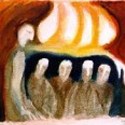
[ The holiday of Shavuot ("Pentecost") begins this evening at sundown... ]
05.28.20 (Sivan 5, 5780) "The Spirit of the Lord GOD is upon me, for the LORD has anointed me to bring good news to the poor; he has sent me to bind up the brokenhearted, to proclaim liberty to the captives, and the opening of the prison to those who are bound" (Isa. 61:1). The Spirit of the Lord GOD (רוח אדני יהוה) heralds "good news" and therefore centers on the glory of the Messiah (see John 15:26; John 16:13-14). The root meaning of the Hebrew verb basar (בשר) is "to bring tidings, especially pertaining to military encounters," and hence both the Septuagint (and the New Testament) renders it as "εὐαγγελίσασθαι" - "to proclaim the victory [of God's redemption]." Interestingly, the word basar can also mean "meat" or "flesh," whereas besorah (בשורה) means "good tidings." Perhaps the connection between the two words has to do with the proclamation of a feast during times of "good news" after a significant military victory. In the New Testament, the connection between the flesh of Messiah offered in sacrifice for our sins should also be noted, especially since the "good news" concerns deliverance from the devil and the sickness of spiritual (i.e., eternal) death.
Something radically changed with the advent of the Holy Spirit, friends. Something inward, as the Torah was written upon the tablets of the heart, as it was written: "Behold, the days are coming, says the LORD, when I will make a new covenant (i.e., brit chadashah: ברית חדשה) with the house of Israel and the house of Judah, not like the covenant that I made with their fathers on the day when I took them by the hand to bring them out of the land of Egypt, my covenant that they broke, though I was their husband, declares the LORD. For this is the covenant that I will make with the house of Israel after those days, declares the LORD: I will give my Torah within them (נתתי את־תורתי בקרבם) and will engrave it on their hearts (ועל־לבם אכתבנה). And I will be their God, and they shall be my people" (Jer. 31:31-33). Note especially that this covenant would not be "like the covenant I made with the fathers" during the time of the Exodus from Egypt (i.e., Sinai), but it would be something far greater, regenerating human nature, when the truth of Torah would become part of the inner life and passion of the heart. Amen. The LORD is not only "God-with-us" but "God-within-us."
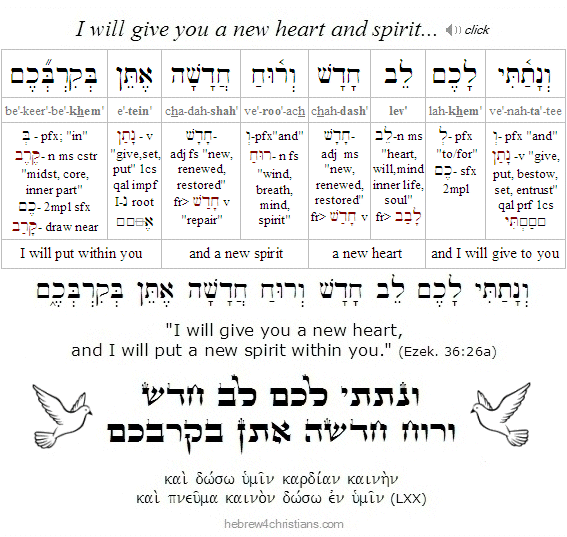 |
 |
Lawlessness in Minneapolis...

05.28.20 (Sivan 5, 5780) On this erev Shavuot, this evening before the great holiday of Shavuot, rioting and chaos has erupted in Minneapolis and its surrounding areas, with looting, arson, various acts of violence, and multiple protests because of the unjust killing of George Floyd, a black man, by a white Minneapolis police officer. The governor of Minnesota has called in the National Guard to hopefully keep matters from escalating. Please pray for true justice to be served -- that those responsible for the unjust death of Mr. Floyd will be held accountable and tried in a lawful criminal case -- and that those who are protesting will show some patience for the prosecution of the officers to be put together. Above all pray that the LORD God Almighty will intervene and bring healing peace. Thank you, chaverim.
Giving of the Torah (מתן תורה)
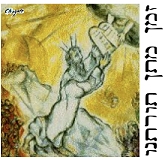
[ The holiday of Shavuot ("Pentecost") begins this evening at sundown... ]
05.28.20 (Sivan 5, 5780) During the holiday of Shavuot ("Weeks," "Pentecost") we remember how the LORD graciously condescended to meet with the Jewish people at Sinai, and how all the people heard the Voice of God (קול האלוהים) speaking from the midst of the fire (Deut. 4:33). This awesome event foreshadowed the great advent of the King and Lawgiver Himself, when the Eternal Word (דבר יהוה) became flesh to dwell with us (Phil. 2:6-7; John 1:1,14), and it further foreshadowed the advent of the Spirit of Truth given to the disciples of Messiah (Acts 2:1-4). Any theology that regards God as entirely "transcendent" will have a problem with divine immanence, since the highness, holiness, and perfection of God will make him seem distant, outside of us, far away, and even unknown... Incarnational theology, on the other hand, manifests the nearness of God to disclose the divine empathy. Indeed, the LORD became Immanuel (עמנו אל), "one with us," to share our mortal condition, to know our pain, and to experience what it means to be wounded by sin, to be abandoned, alienated, forsaken. The "Eternal made flesh" bridges the gap between the realm of Ein Sof (אין סוף), the Infinitely transcendent One, and the finite world of people lost within their sinful frailty. Of course we believe Adonai Echad (יהוה אחד) - that the "LORD is One" - both in the sense of being exalted over all things but also in the sense of being compassionately involved in all things (Rom. 11:36). During Shavuot we celebrate the giving of the Torah both at Sinai, at Bethlehem (בית לחם), and within our hearts. We celebrate that God is indeed the King and Ruler over all, but we further affirm that God's authority and rule extends to all possible worlds - including the realm of finitude and even death itself.
כי יהוה שפטנו יהוה מחקקנו
יהוה מלכנו הוא יושיענו
kee · Adonai · sho·fe·tei'·noo; Adonai · me·kho·kei'·noo
Adonai · mal·kei·noo; hoo · yo·shee·ei·noo

"For the LORD is our judge; the LORD is our lawgiver;
the LORD is our king; He will save us."
(Isa. 33:22)
Hebrew Study Card

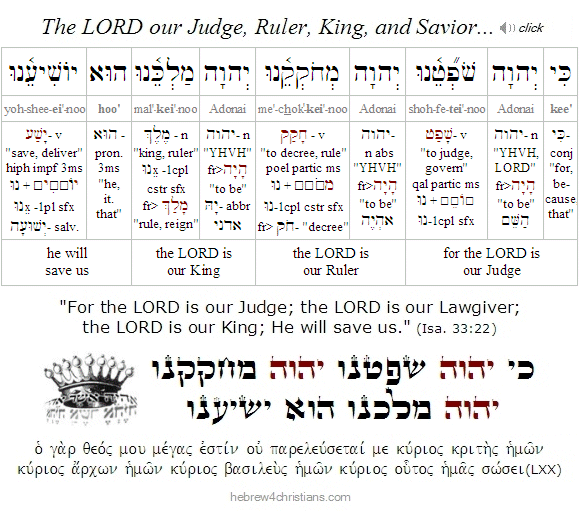
Why Shavuot Matters...
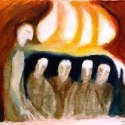
[ The great holiday of Shavuot (Pentecost) begins tomorrow at sundown.... ]
05.27.20 (Sivan 4, 5780) The holiday of Shavuot (חג השבועות) is called "Pentecost" in Christian tradition. The Greek word Pentecost (πεντηκοστή) means "the holiday of fifty days" that refers to the 50th day after the crucifixion of Yeshua when the Holy Spirit descended upon the disciples and when Peter first proclaimed the truth of salvation in Jerusalem (Acts 2:1-43). The Torah teaches that Shavuot is a major biblical holiday (it is one of the three "required festivals" of the LORD, see Exod. 23:14-17; Deut. 16:16) and therefore it behooves us to understand its significance as the climax of Passover itself -- 'the endpoint' of the redemptive experience. Indeed, just as the blood of the lambs smeared on the door posts led directly to Sinai 50 days later, so the crucifixion of Yeshua led directly to the descent of the Holy Spirit to empower His followers to serve God under the new covenant of Zion.
 |
There are two basic priestly rituals commanded for Shavuot: 1) the waving (i.e., tenufah: תנופה) of the two loaves of (new) wheat bread (called shtei ha'lechem: שתי הלחם), and 2) the offering of peace sacrifices (i.e., korban shelamim: קורבן שלמים). Both of these aspects of the priestly service were fulfilled in the greater sacrifice of Yeshua made on our behalf. Moreover, just as worshipers at the Temple would present bikkurim (בכורים) - their choicest first fruits - and attest to God's faithfulness before the altar (Deut. 26:3), so we are called to walk in the fruit of the Spirit (פרי רוח הקודש) and to proclaim the message of God's faithful love for us.
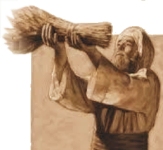
Though it is not explicitly mentioned in the five books of the Torah, the early sages have long associated the revelation of the Torah at Sinai (מתן תורה) with the holiday of Shavuot. This comes from a careful study of the chronology of the exodus itself, calculating the time of the Passover from Egypt (i.e., Nisan 15) to the arrival of the Israelites at Sinai 45 days later on Sivan 1 (Exod 19:1). The earliest extrabiblical source that explicitly links Shavuot with the revelation of the Torah at Sinai is the Book of Jubilees (i.e., Sefer ha'Yovelim: ספר היובלים), dating from the 2nd century BC. Extant manuscripts of this book were found among the Dead Sea Scrolls (מגילות ים המלח), indicating that the Shavuot-Sinai connection was made before the advent of Yeshua. The (non-canonical) book is a parallel account of Genesis and parts of Exodus, and includes the observance of Shavuot by Noah before the time of the Flood. In the Book of Jubilees, Noah is told to observe the festival of Weeks and to offer Firstfruits every year as a commemoration of God's covenant to renew the earth (Jubilees 6:15;22). Likewise Abraham and the original patriarchs were said to observe it, though it was forgotten by the Jews in Egypt until Moses was said to have reinstated it at Sinai. Shavuot is also mentioned in the apocryphal Book of Tobit (טוביה) and the Book of Maccabees, c. 2nd century BC.
 |
The Talmud (i.e., traditional oral teaching) also connects Shavuot with the giving of the Torah at Sinai. The earliest Talmudic statement on the date of the revelation at Sinai is found in Tractate Shabbat 86b. According to these sages, the Israelites left Egypt on Friday, Nisan 15, and the Torah was given exactly 50 days later on Saturday, Sivan 6th. This corresponds exactly with God's instructions to count 50 days from the day after Passover (Lev. 23:15-16). This date later became fixed in the Jewish calendar, and was further supported by reference to Exodus 19:1: "On the third new moon after the people of Israel had gone out of the land of Egypt, on that day they came into the wilderness of Sinai." (For details about the exact timing for this event, see the main Shavuot article here.) The Midrash Rabbah also explicitly makes the Shavuot-Sinai connection as well. The later rabbis refer to Shavuot as "Atzeret" (עצרת), a word that means "withdrawal" (i.e., to the desert to receive the law) and "conclusion" (or the goal of the Passover redemption). Today Jewish tradition regards Shavuot as Zman Mattan Torateinu (זמן מתן תורתנו) - "the anniversary of the giving of the Torah." Shavuot is also called Yom Ha'Kahal (יום הקהל) - the "Day of Assembly" (Deut. 18:16).
Jewish custom affirms that in every generation each person should consider himself as having personally received the Torah at Sinai. The climax of the Shavuot morning service is the recitation of the famous Akdamut poem followed by the reading of the Ten Commandments, when all the congregation stands to "relive" the experience at Sinai. A second Torah scroll is then taken out of the ark and the portion is read (Num. 28:26-31) that describes the sacrificial offerings made at the Temple during Shavuot, and the Haftarah (Ezek. 1:1-28; 3:12) concerns the stunning revelation of God in the form of the Throne/Chariot.
The Scroll of Ruth (מגילת רות) - a beautiful story about God's redemptive love - is read on the second day of Shavuot. As the "kinsman redeemer" (i.e., go'el karov: גואל קרוב), Boaz was a wealthy man of the tribe of Judah (Bethlehem) who married a Gentile bride. Boaz's name (בועז) means "in Him [בו] is strength [עז]," a picture of Yeshua the Messiah, his greater Descendant, who also redeemed for himself a bride from among the nations. Among traditional Jews, the Book of Ruth is is read since the events recounted took place during the time of the spring harvest (linking it to the agricultural aspect of Shavuot), and Ruth is a picture of willing acceptance of a Jewish lifestyle (linking it to the events of Sinai).
Paradoxically, the conversion of Ruth was actually against the law given in the Torah itself! According to the Torah (Deut. 23:3), an Ammonite (or Moabite) was forbidden to enter into the family of Israel, and therefore the question arose regarding how Ruth was accepted. Indeed, not only was Ruth accepted, she became the great grandmother of King David through whom the Messiah Yeshua would come (Ruth 4:17). There is a wonderful message hidden here!
Shavuot is often portrayed metaphorically as a marriage ceremony (קִדוּשִׁין) between God and the children of Israel. The LORD is the Heavenly chatan (groom) who said, "Accept Me"; the Jewish people represent the beloved kallah (bride); and the Torah represents the ketubah (marriage contract). In some Sephardic traditions, a ketubah is literally read under the traditional chuppah (חוּפָּה) or wedding canopy, that is set up in the synagogue. Some of the sages note that the idea of marriage comes from the resemblance of the word Shavuot with shevuot (שבועות), the word for "oaths." On Shavuot two oaths were taken. One was from God who pledged that He would not exchange the children of Israel for another people, and the other was from the Jews who pledged they would not exchange God for another deity...
This is analogous to the wedding cup that Yeshua offered us in the upper room, before His crucifixion. The Holy Spirit was given to escort us into the heavenly bridal chamber... Collectively, the followers of the Messiah are called Kallat Mashiach (כלת המשיח) - the Bride of Messiah (Rev 21:2,9), and we eagerly await the marriage supper to come (Rev 19:9).
Shavuot marks the time when God entered into covenant with the Jewish nation. During the first Shavuot at Sinai, God instituted the Mosaic covenant and gave the Torah in written form, but during the Shavuot at Zion, after the resurrection of Yeshua, God established the New Covenant (הברית החדשה) when He wrote the Torah on the hearts of Yeshua's followers.
- Shavuot at Mount Sinai is sometimes considered the day on which Judaism was born. Shavuot in Jerusalem (Mount Zion) is the day on which the church was born when the Holy Spirit was poured out upon the followers of the Messiah Yeshua.
- Just as the resurrection of Yeshua represents the Firstfruits of those who have died (1 Cor. 15:20) and fulfills the prophetic ritual of the waving of the omer on the festival of First Fruits, so the giving of the Holy Spirit to the followers of Yeshua fulfills the wave offering of the leavened wheat loaves on the day of Shavuot.
- At Mount Sinai the Ten Commandments were written on tablets of stone by the "finger of God" (Exod. 31:18), but at Mount Zion, the Torah is written on tables of the heart by the Spirit of God (2 Cor. 3:3; Heb. 8:10).
- Just as the Israelites were affirmed as God's chosen people on Shavuot with the giving of the Torah, so the followers of the Messiah are affirmed as God's chosen people at Shavuot after Yeshua's ascension into heaven as the Mediator of a Better Covenant (Hebrews 8:6). The 3,000 that were added to the church that day were firstfruits of the redeemed people of God.
Again, the holiday of Shavuot is one of the shelosh regalim (three pilgrimage festivals) given in the Torah (Exod. 23:14-17; Deut. 16:16) and therefore reveals profound spiritual truth for followers of Yeshua (Luke 24:44; 2 Tim. 3:16). God did not want us to miss the significance of this holiday, since it expresses the freedom and truth of the New Covenant of Zion. Friend, may this be a time of renewal and great joy in your life....
Broken and Remade...

05.27.20 (Sivan 4, 5780) No one wants to say they are needy, broken, weak, and so on, and indeed such a confession is blasphemy to the heart of the proud. The truth, however, is that we are indeed all these things, and Yeshua told us we were blessed if we understood this (Matt. 5:3-6). There is great danger to pretend you are strong and capable of living life on your own terms, since eventually you will be blindsided by the truth about your condition. On the other hand, the confession of our weakness opens the way to God's power, as Yeshua said to Paul in his affliction: "My grace is sufficient for you, for my power is made perfect in weakness" (2 Cor. 12:9). Paul came to see that the various trials and afflictions in his life taught his profound dependence on God: "for when I am weak, then I am strong."
Access to this grace, however, comes at the expense of our pride. We must humbly confess who and what we are, and therefore we must entirely abandon hope in our own strength and virtues. "We are only as sick as the secrets we keep," especially those secrets we keep from ourselves - those self-deceptions and illusions we use to defend ourselves.
Suppose, for instance, that you have the bad habit of complaining and even cursing when you are beset by troubles, and you want to stop doing these behaviors. You may resolve to be more optimistic and grateful, or you may read self-help books -- or even take anger management classes -- but nothing will do you any lasting good until you know "in your bones" that you are powerless to change your heart. That is the first step to being set free. Or suppose that you are habitually unhappy, troubled, anxious, and in pain, yet you want to find inner peace and joy. Again, apart from the miracle of God there is no lasting remedy. You must be honest with yourself and confess the truth of your condition, asking God to do in you what you cannot do for yourself. As Yeshua said: "What is impossible with man is possible with God." So in this way God uses your sins to correct you or bring you to the end of yourself, and in that way awareness of your personal weakness is a blessing from God.
Recall that Yeshua said out of the heart proceed "evil thoughts," or more literally, "evil dialogs" or reasoning within yourself (διαλογισμοι πονηροι). You are tethered to yourself - you cannot escape yourself - yet a divided house cannot stand. Attempting to relate to yourself apart from a relationship with God leads to ongoing despair -- either the despair of resigning into yourself or else the despair of fleeing from yourself -- but either way, to a condition of anxiety derived from not being grounded in the life of God... "Unless a seed of wheat falls to the ground and dies, it abides alone..." (John 12:24). Yeshua is the source of all life, and we find nourishment, strength, and the meaning of who we are as we connect with him. By faith we affirm: "I have been crucified with Messiah, and it is no longer 'I' who live, but Messiah who lives in me" (Gal. 2:20). There is a new self that comes from above, known only in spiritual relationship with the Savior. The miracle of the exchanged life comes as we surrender to the truth of what God does for us (2 Cor. 5:17). That is the essence of the gospel, "the power of God for salvation for all who believe" (Rom. 1:16). Therefore we do not attempt to crucify ourselves, or labor to reform our corrupted lower nature, but we instead accept that we already have been crucified and healed by the mercy and miracle of God. We clothe ourselves in the robes of His righteousness as we celebrate God's redeeming love for our lives. Only then are we miraculously empowered by the Spirit to truly "love the LORD and keep his charge" (see Deut. 11:1).
The gate is narrow that leads to life, and few there be that find it (Matt. 7:14). That is part of the offense of the cross, after all - the confession you are lost, in darkness, and in need of salvation. Few receive this truth into their hearts because they want to be in control and refuse to let go; few regard their weakness as a blessing that opens the gate to God's strength. Let the weak say "I am strong" because of what the LORD has done. God's grace is sufficient, and his strength is perfected in weakness: "So then, I will boast most gladly about my weaknesses, so that the power of Messiah may reside in me" (2 Cor. 12:9). "I can do all things through the Messiah who strengthens me" (Phil. 4:13). Amen.
 |
Heirs of the Spirit (יורשי הרוח)

05.27.20 (Sivan 4, 5780) "Not all who are (physically) descended from Israel (οἱ ἐξ Ἰσραήλ) are (spiritually) Israel, nor are all (physical) descendants (σπέρμα) of Abraham his (spiritual) children (τέκνα); but ביצחק יקרא לך זרע - 'in Isaac shall your seed be called'" (Rom. 9:6-7; Gen. 21:12, 32:28), which is to say that a child of promise is brought forth by the power of God, and not by means of human agency (see John 1:12-13). Though both Ishmael and Isaac were physical descendants of Abraham, the former was born of the flesh (κατὰ σάρκα) whereas the latter was born of the Spirit (ἐκ τοῦ πνεύματος), and this is why Isaac was the true heir of the faith.
Note how faith expresses the direction of life. Isaac surrendered himself as a sacrifice to God, whereas Ishmael contended for worldly power. The "children of the flesh" often regard themselves as "free" when in fact they are slaves since they do not know the blessing of true surrender to God. Friend, if you are depending on your own inner strength, your resolve, or your "religion" to save you, then you have not taken hold of the promise, for it is receiving the promise of God that imparts life. You may regard yourself as a "spiritual" person but be a stranger to the heart of Reality. We are healed from the sickness of spiritual death only by the power of God, by being reborn with a radically new nature though the agency of the Spirit, not by attempting to "reform" our lower nature nor by taking pride in our lineage, religion, or our status in this world (Matt. 3:9, John 8:39-45).
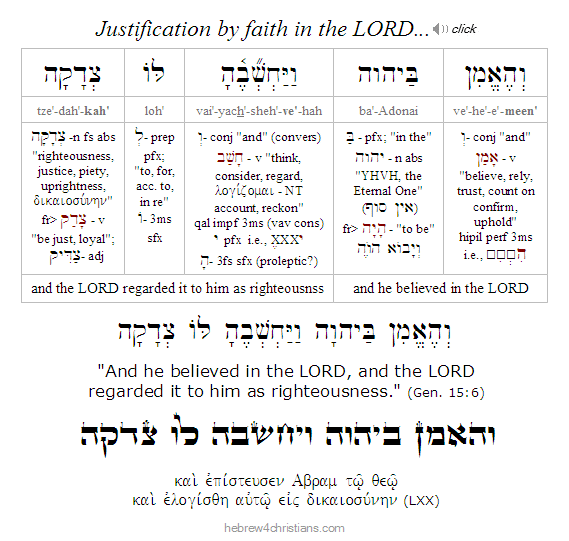 |
For more on this topic see "Paul's Allegory of Flesh and Spirit."
Awakening to Revelation...

[ The great holiday of Shavuot (Pentecost) begins this Thursday at sundown.... ]
05.26.20 (Sivan 3, 5780) On the evening of Shavuot (i.e., erev Shavuot) it is a Jewish tradition to stay up all night reciting various selections from Torah until sunrise. This custom is called tikkun leil ha'shavu'ot: תיקון ליל השבועות, the "Rectification for Shavuot Night," and the vigil was recommended by the sages as a "remedy" for Israel's failure to be awake on the morning of the revelation (the midrash reprimands the people who overslept on the morning of the revelation for needing to be roused to salute the King). Philosophically considered, the theme of "wakefulness" (עֵרוּת) is central to revelation, for without it we lose our consciousness as God's people. We must understand our history to order our lives according to the truth. The God of our Salvation, the Redeemer of our people, the LORD YHVH, must be distinguished from the gods of the nations; the covenant we have with God must retain its sanctity; there is a real testimony and direction to our lives. Salvation does not mean being "absorbed" into some sort of nirvana or unconsciousness, but instead focuses on concreteness, historical events, our heritage, our future, and the story of our lives...
It is important to understand that the Torah is received in words, which require a sequence of time and logic to form intelligible connections and unity of understanding. Faith comes by hearing the message of God (Rom. 10:17), not by seeing the miraculous or experiencing the "numinous." As Moses later said of the Sinai revelation, "You saw no matter of form" (Deut. 4:15) indicating priority of the inner witness of truth over outer appearance. Even the visions of the prophets held no authority until God revealed the meaning.
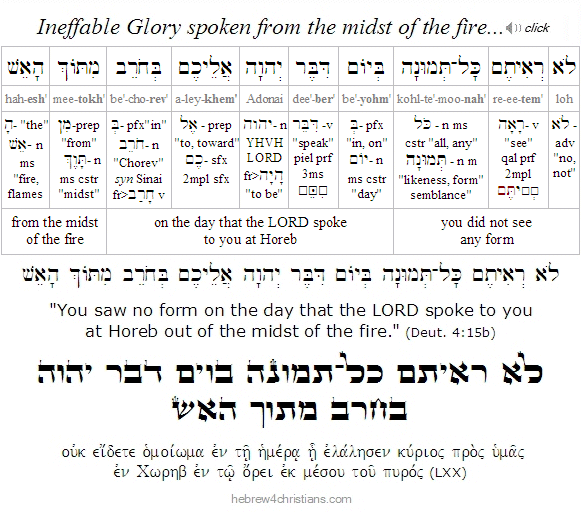 |
Shavuot is about mattan Torah (מתן תורה), the "giving of the Torah," and therefore it reminds us of our duty to "stay awake" to receive its message. Torah, as of course you know, does not mean "law" but rather "direction" or "teaching," and studying Torah therefore involves personal response, commitment, and intense focus. It is not "book learning" more than it is a type of "holy listening," heeding the story of our redemption and discovering its application and goal for our lives. Hearing the "Song" of God's Truth (שיר האמת), is more important than the intellectual "seeing" of classical Greek tradition. Hearing is connected with time and not to timeless forms or Ideas (εἶδος) of reality; it is dynamic and "intrudes" upon the moment to be witnessed. That is part of the reason the Sinai revelation was attended with shofar blasts and thunder: to awaken the heart to arise and the mind to hear... Torah study, then, implies a dialog or discourse ranging over the centuries, stretching back to the time of Moses (and through him, to Adam), through the establishment of the network of judges (Exod. 18:13-26), through the words of the prophets of Israel, all leading to the life of Yeshua the Messiah and the message he gave to his disciples... Our faith, then, is rooted and bound up with history, with the fathers and mothers who went before us, with the lives of scribes, the sages, the prophets, the apostles, including the ongoing dialog of the people of God over the millennia.
Shavuot has no specific ritual observance for us today other than to be awake to revelation, consciously remembering the truth of our heritage and holding steadfast to the promises of our ultimate healing. The very first commandment of the Ten Commandments begins: anochi Adonai Elohekha (אָנכִי יְהוָה אֱלהֶיךָ), "I am the LORD your God who brought you out of the land of Egypt" (Exod. 20:2). The very first commandment, then, is faith in the message of God's love and blessing. Torah study (understood in its broadest sense) is therefore of primary importance, because faith in its truth is the precondition of all that follows. The basic commandment of Shavuot, then, is the mitzvah (i.e., blessing) that precedes all the other mitzvot, namely, to wake up and believe the miracle of God is for you....
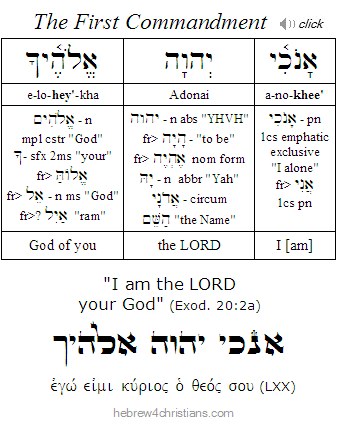 |
In light of this, ask yourself whether you need to understand before you will believe... The Midrash Rabbah says that God offered the Torah to each of the 70 nations, but each nation first asked to understand what was required of them, and then rejected the offer... Finally God approached Israel and asked: "Will you accept my Torah?" And they replied, kol asher dibber Adonai na'aseh (כל אשׁר־דבר יהוה נעשׂה), "all that the LORD has spoken we will do" (Exod. 19:8). In other words, Israel was willing to accept the Torah even before they understood what was required of them. Later they reaffirmed their simplicity of heart by saying na'aseh ve'nishma (נעשה ונשמע) "We will do and then we will understand" (Exod. 24:7). Praise the LORD God of Israel: You don't have to work to receive the light - it comes to you as you are, requiring only that you open your eyes to behold it... God is the inner radiance of reality; by his light we are able to see light (1 John 1:5; Psalm 36:9).
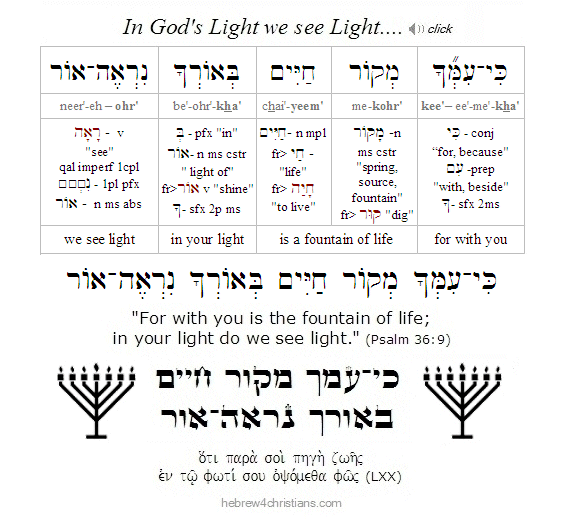 |
 |
Unshakable Direction...

05.26.20 (Sivan 3, 5780) Where it is written, "cast all your anxiety on him because he cares for you" (1 Pet. 5:7), the word translated "anxiety" (μέριμνα) comes from a Greek verb (μερίζω) that means to be fragmented or divided into parts and pieces. Being anxious is therefore the uneasy state of being unfocused and divided within oneself... King David understood the need for a unifying principle for his life: "One thing I ask of the Lord; that is what I will seek" (Psalm 27:4). He understood that walking in the truth required "uniting his heart," or "repairing the breach" within his inner affections so that he could experience reverence and awe before the Divine Presence (Psalm 86:11). King David knew that "right desire" is the deepest form of prayer.
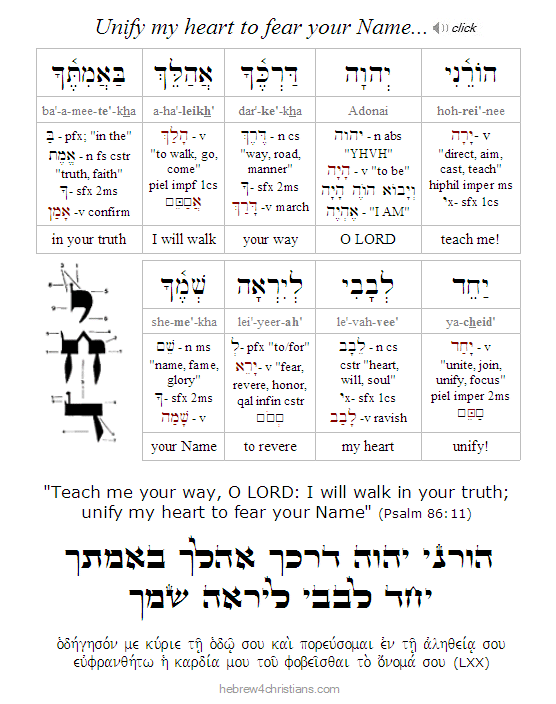 |
Kierkegaard said that "purity of heart is to will one thing..." When we are anxious, we become inwardly shaken and divided, and thereby lose our sense of identity and purpose in this world. God invites us to come boldly before Him to find help (Heb. 4:16). He is a "very present help in trouble" (Psalm 46:1). We cast our burdens upon the LORD so that He can sustain us (Psalm 55:22) and so that we may have a "right spirit" (רוח נכון) renewed within us (Psalm 51:12). We can bring our brokenness to God - including those distractions that tear us away from Him and that make us inwardly "two-souled" - to find healing for our hearts. When we do so, we will discover the Source of Power that makes us "unshakable and always able to abound in every good work" (1 Cor. 15:58).
Walking in the Light (אור התורה)

05.26.20 (Sivan 3, 5780) While it is wonderfully true that Yeshua died to free us from our sins, the corollary is that he calls us to walk in the light of his glorious Divine Presence (2 Cor. 5:15). The two go together. You are redeemed by God to serve him. Simply believing (or hoping) that "Jesus died for your sins" doesn't mean walking through your days without any thought of where you are going. Our teshuvah must make traction with our feet as we go forward by faith. This means we have a responsibility to practice the truth of Messiah, partaking his vision, hashkafah (philosophy) and compassion. Indeed each of us will give account for his or her life before God, as it is written: "For we must all appear before the judgment seat of the Messiah (כסא־דין המשיח), so that each one may receive what is due for what he has done in the body, whether good or evil. Therefore, knowing the fear of the Lord (יראת יהוה), we persuade others" (2 Cor. 5:10-11).
Amen, we must learn to be conscious of life's great sanctity its eternal significance... Each of us is "on the road" of life going someplace; each of us has an appointment with the full revelation of the truth.... Therefore, since we only have this hour, understand today to be "the day of salvation" (יום הישועה). "No creature is hidden from His sight, but everything is naked and exposed to the eyes of him to whom we must give account" (Heb. 4:13). Therefore the Spirit admonishes those who have ears to hear: "Take care, friends, lest there be in any of you an evil, unbelieving heart, leading you to fall away from the living God, but exhort one another every day, as long as it is called "today," that none of you may be hardened by the deceitfulness of sin. Today - if you hear His voice - harden not your hearts (Heb. 3:12-13,15).
Friend, everything matters; nothing is trivial; and there is a weight of glory that surrounds our lives... Therefore act as if your choices have eternal significance, because they really do; pray as if your life depends on it, because it really does. Praying in accordance with the will of God - namely, for you to know God, to walk in the light of love, joy, peace; to be filled with wisdom, patience, kindness, and so on, will assuredly move heaven and earth (1 John 5:14). God is forever faithful and always hears those who call out to him with sincerity of heart: "The LORD is near to all who call out to him, to all who call out to him in truth" (Psalm 145:18).
קרוב יהוה לכל־קראיו
לכל אשר יקראהו באמת
ka·rohv · Adonai · le·khol · ko·re·av
le·khol · a·sher · yeek·ra·oo'·hoo · ve·e·met

"The LORD is near to all who call to him,
to all who call to him in truth."
(Psalm 145:18)

Showing up in our Need...
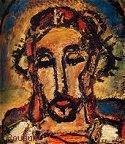
05.25.20 (Sivan 2, 5780) We have to "show up" in order to experience the blessing of God. That is our part - to "set the LORD" before us, to open our hearts and minds to hear his message speaking... We look with expectation, we direct our most intimate thoughts to him, we surrender in our hope. What good is learning about God apart from the heart?
King David prayed: "Search me, O God, and know my heart; test me and know my thoughts, and see if there be any hurtful way in me, and lead me in the everlasting way" (Psalm 139:23-24). Note that this prayer is not a confession of sin but rather an appeal for God's testing and examination of the heart; it is a cry for healing and deliverance from unknown sins and secret pains that impede the flow of the Spirit of God. But how can God know the language of our anguish, our sorrows, our pain? Because he became the "Man of Sorrows" (איש מכאבות) to know our sickness (וידוע חלי)... he clothed himself with our desolation and fell on behalf of our fall. God knows the language of our hearts better than we do, and he has overcome all that destroys us. Because of this, the Lord can lead us in the way of eternity.
It seems all we can do is offer the cry of our heart to God; all we can do is offer our need! When you are stricken and brought low, your very lament becomes praise, since it expresses your earnest longing for God who alone is your only true good. "Out of the depths" the heart cries - in its need, in its unknowing, and in its hope.
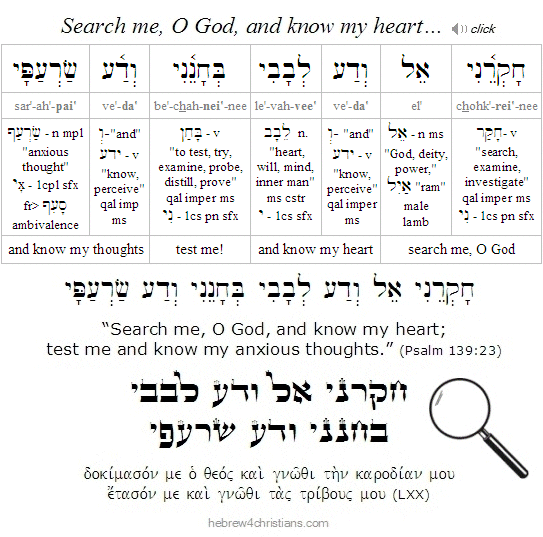 |
 |
Memorial Day...

05.25.20 (Sivan 2, 5780) In the United States, Memorial Day is a national holiday observed on the last Monday of the month of May, that commemorates the sacrifice of those men and women who died in military service for their country. For those who have lost a loved one during their military service, please accept our heartfelt condolences and appreciation for your great sacrifice... And may the LORD God Almighty have mercy upon all the nations of the world by imparting the revelation of His Living Torah, Yeshua, as it says, "Where there is no prophetic vision the people cast off restraint, but blessed is the one who keeps Torah" (Prov. 29:18). If there is no prophetic vision, no apprehension of revelation, there is no direction, and this can lead to moral and spiritual disorder, chaos, and bondage.
Living in the Light...
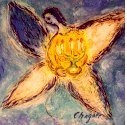
05.24.20 (Sivan 1, 5780) Most of our negative emotions come from fear, including anger, frustration, and rage. On a spiritual level, fear and worry can cause people to question God's love, to doubt His promises, and to succumb to despair. The devil knows that frightening people causes them to be unsettled, off-balance, and vulnerable to all sorts of manipulation and deception. Indeed logicians call illegitimate appeals to fear the "appeal to the stick" (argumentum ad baculum). When someone plays on your fears, it's wise to discern whether there's any basis in Reality for the supposed threat, or if the appeal is simply a rhetorical "scare tactic" intended to persuade you to accept some sort of conclusion. Unscrupulous people (such as advertisers and especially politicians) regularly use fear to manipulate public opinion, of course, and they're only too glad to tell you exactly what you should fear. They are delighted to prey upon your anxieties and then offer you a supposed "remedy."
Living in fear is a form of slavery (Heb. 2:15), but where the Spirit of the LORD is there is liberty and peace (2 Cor. 3:17). Therefore "fear no evil," for God is with you (Psalm 23:4). There is no fear in God's love, but perfect love (אַהֲבָה שְׁלֵמָה) throws out fear (1 John 4:18). The LORD repeatedly tells us not to be afraid – not of man, nor of war, nor of tribulation, nor even death itself (Rom. 8:35-39). Indeed, one of the most frequent commandments in Scripture is simply al-tirah (אַל־תִּירָא), "Be not afraid."
 |
 |
Torah Readings for Shavuot...

05.24.20 (Sivan 1, 5780) Chodesh tov, chaverim. Recall that the Torah instructed (Lev. 23:15-16) that we count 49 days (i.e., seven "weeks of days") from the day after Passover until the 50th day, a holiday called "Shavuot" (or "Pentecost" in Christian tradition). This countdown period commemorates the the Exodus from Egypt and the revelation of the Torah given 49 days later at Mount Sinai, and therefore the sages refer to Shavuot as Atzeret Pesach (עצרת פסח), or the concluding "rally" of Passover. For followers of Yeshua, Shavuot marks the time celebrating the new covenant of Zion when the divine fire of the Ruach HaKodesh (Holy Spirit) was poured out in fulfillment of the ministry of Messiah (Acts 2:1-4; Jer. 31:31-33).
 |
Now this coming Thursday, May 28th (at sundown) marks the end of the 49 day countdown, and therefore the following Friday marks the great "Jubilee" of Shavuot. The usual weekly Torah Reading Cycle is therefore suspended (because the holiday falls on the Sabbath) and instead we will read the following portions of Scripture:
- Erev Shavuot (evening of Thurs. May 28th to sunrise)
Tikkun Leil Shavuot: Reading assorted passages of Torah, Talmud, etc.
- Shavuot Day 1 (Friday, May 29th)
Torah: Exod. 19:1-20:23; Num. 28:26-31 (M)
Haftarah: Ezek. 1:1-28; 3:12; Jer. 31:31-34; Ruth (K)
NT: Luke 24:49; Acts 1:1-9-2:1-41; John 14:26;16:7-11; Gal. 5:22-23
- Shavuot Day 2 (Sat. May 30th)
Torah: Deut. 14:22-16:17 Num. 28:26-31 (M)
Haftarah: Hab. 3:19; Jer. 31:31-34; Ruth (K)
NT: Matt. 3:11; Gal. 5:22-23; Rom. 14:17; 1 Cor. 4:20; John 7:38-39; Acts 2:38
During the holiday of Shavuot, it is customary for young adults to recommit themselves to Talmud Torah (the study of Torah) and to renew their decision to live as faithful Jews. In addition to formal "confirmation ceremonies" often scheduled at synagogues, some other Shavuot customs include decorating the home and synagogue with greenery, eating dairy foods and sweets (as samples of the "milk and honey" of the promised land), and staying up the entire night of Shavuot to read selections from the Torah and from the Talmud (this custom is called tikkun leil ha'shavuot: תיקון ליל השבועות, "Rectification for Shavuot Night").
 |
At the synagogue, it is customary to start the Shavuot evening service later than usual, to ensure that the 50th day has arrived (see "counting the omer"). As mentioned above, many people stay at the synagogue throughout the entire night listening to poems and favorite portions of Scripture, or reading from a special book (sefer tikkun leil ha'Shavuot) that includes key verses of each Torah portion and passages of each tractate of the Mishnah. This custom is observed to "repair" the night of Shavuot from the error of sleeping so soundly before the Torah was revealed at Sinai that God had to awaken the Jews with piercing shofar blasts, thunder, and lightning the following morning (Exod. 19:16).
Jewish tradition teaches be'chol dor vador (בכל דור ודור) - that in every generation each person should consider him or herself as having personally been delivered from Egypt to receive the Torah at Sinai. The climax of the Shavuot morning service is the recitation of the famous Akdamut poem followed by the reading of the Ten Commandments, when all the congregation stands to "relive" the experience at Sinai. A second Torah scroll is then taken out of the ark and the portion is read (Num. 28:26-31) that describes the sacrificial offerings made at the Temple during Shavuot, and the Haftarah (Ezek. 1:1-28; 3:12) concerns the amazing revelation of God in the form of the Throne/Chariot.
The Scroll of Ruth (מגילת רות) - a beautiful story about God's redemptive love - is traditionally read on the second day of Shavuot. As the Goel (kinsman-redeemer), Boaz was a wealthy man of the tribe of Judah (Bethlehem) who married a Gentile bride. Boaz's name means "in Him is strength," a picture of the Yeshua the Messiah, his greater Descendant, who also redeemed for himself a bride from among the nations. Among traditional Jews, the Book of Ruth is is read since the events recounted took place during the time of the spring harvest (linking it to the agricultural aspect of Shavuot), and Ruth is a picture of willing acceptance of a Jewish lifestyle (linking it to the events of Sinai).
The holiday of Shavuot is one of the shelosh regalim (שלוש רגלים) or three major "pilgrimage festivals" commanded in the Torah (see Exod. 23:14-17; Deut. 16:16) and therefore it reveals profound spiritual truth for followers of Yeshua (Luke 24:44; 2 Tim. 3:16). God did not want us to miss the significance of this holiday, since it expresses the blessed truth of the New Covenant of Zion. From my family to you: Chag Shavuot Sameach (חג שבועות שמח) - "Happy Shavuot!" May this be a time of renewal and great joy in your lives...
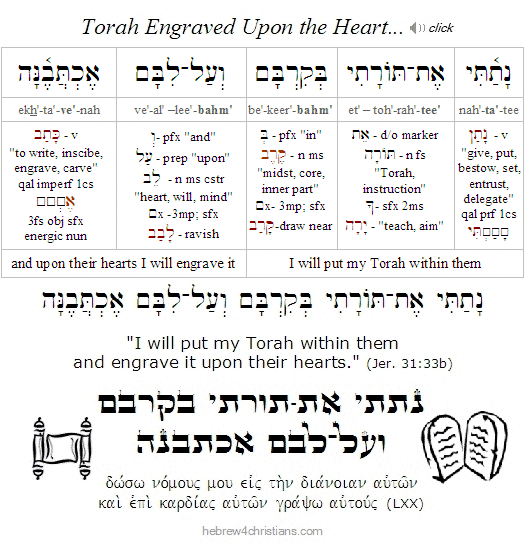 |
 |
Found in our Depths...

05.22.20 (Iyyar 29, 5780) It is written in our Torah, "The LORD your God will return as you return (ושׁב יהוה אלהיך את־שׁבותך), and will have mercy upon you, turning to gather you back..." (Deut 30:3). This has both a present and prophetic application. First, in the present hour, if you turn to God, he will show you compassion, and he will "gather back" all those distant and fragmented parts of yourself into shalom and wholeness. He will restore your lost days; he will bring you out of exile and give you comfort in Yeshua. He makes all things new. "Draw near, therefore to God, and he will draw near to you" (James 4:8). Second, the LORD will return to earth as the Jewish people return from their captivity, and he will restore Zion during the time of the final redemption. The LORD will turn captivity into mercy; he will turn in his compassion to his people. As it is written: "I will be found by you, declares the LORD... (והשׁבתי אתכם אל־המקום) and I will bring you back to the place..." (Jer. 29:14).
The language of the Torah here is emphatic: "even if your exile is at the farthest edge of heaven (בקצה השמים), from there the LORD your God will gather you..." (Deut. 30:4). Note that this prophecy is written in the singular and therefore pertains to each individual exile. God will "gather you," that is, he bring you back to make you whole. Even if your exile (singular) is to the uttermost, the LORD will take you and deliver you, as it is written, "He is able to save to the uttermost (σῴζειν εἰς τὸ παντελὲς) those who draw near to God through him, since he always lives to make intercession for them" (Heb. 7:25). As long as you have breath within you and an iota of hope in Him, God will bring you through the darkness.
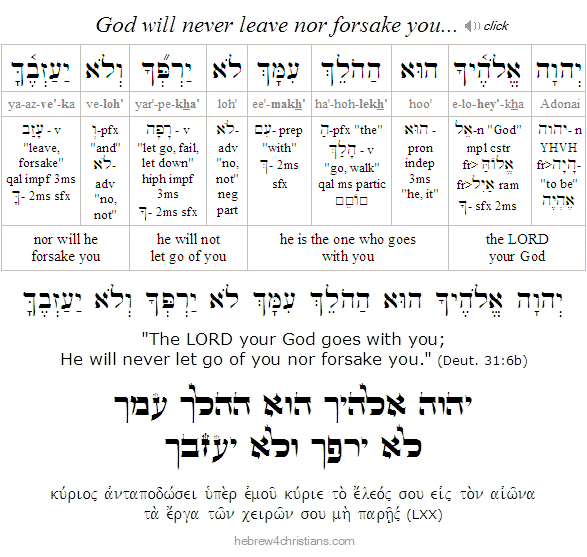 |
 |
He Descends for our Ascent...
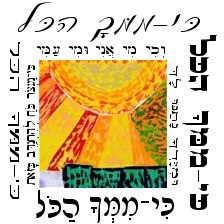
05.22.20 (Iyyar 29, 5780) Some imagine spirituality as a climb upward, an "ascent of the soul" that aims to reach God through the performance of good deeds or religious rituals. But God does not say "at the end of the way you will find me," but rather, "I AM the way, the very road under your feet, the Place (המקום) where you are, and the Bridge to the Father (John 14:6). "For from You are all things (כי־ממך הכל), and from your hand we give to you" (1 Chron. 29:14). The LORD is Present in every "here" and every "now," the Source of all we are. And no matter what our circumstances, we will find God if we search bekhol levavkha - with all our being, as it says: "You will seek me and find me, when you seek me with all your heart."
The Work of Faith...

05.22.20 (Iyyar 29, 5780) You are invited to come before the Divine Presence - you are welcomed with joy - because of the glory of God's love given to you in Yeshua... And while you can never "earn" God's love, of course, you must take hold of it by faith, as Yeshua said: "This is the work of God - that you believe in the One whom God sent (John 6:29). This is the great work of the heart: learning to believe that Yeshua was given for your sake, because you are redeemable and have infinite value in the eyes of heaven. Faith finds courage to accept God's love, despite whatever tempts you to feel unworthy or unacceptable. It pushes past the superficial view that you can please God by what you do, instead of enjoying God by knowing who He is: God is love; God is Light; He is Faithfulness, the Savior of your life... Faith works through his love (Gal. 5:6).
Shabbat Shalom and love to you all, to each one of you... I thank the LORD God for you and esteem you as part of my spiritual family. May you be strong in the LORD and the power of his might; may you be happy and blessed and know God's great peace; may you be filled to overflowing with God's healing love and grace and kindness and beauty and wonder... This is my prayer for this season of our lives: That we will all wake up to behold the love of God in the face of Yeshua our LORD... May he come speedily, and in our days. The King is coming!
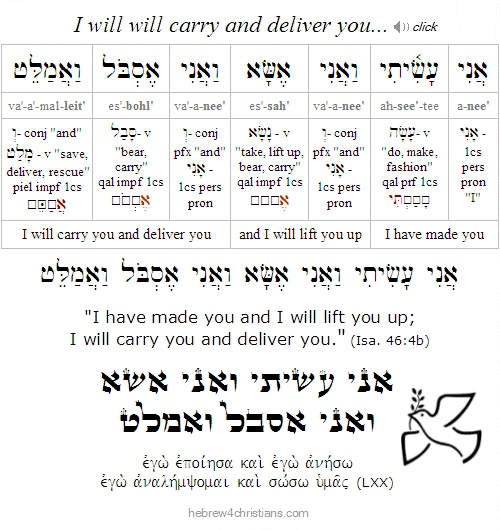 |
 |
Hearing the Whisper...

[ The following is related to our Torah reading for this week, parashat Bamidbar... ]
05.22.20 (Iyyar 29, 5780) The Hebrew word midbar (מדבר), "desert," shares the same root as davar (דּבר) which means "word." We often need to be alone to hear God speaking kol demamah dakkah (קול דממה דקה) - "the sound of a low whisper" (1 Kings. 19:12), and the journey into the desert was God's way of separating His people to speak with them "privately," so to speak (Jer. 2:2). But to hear the word we must humble ourselves, and the desert (i.e., "word") of Sinai is therefore first of all the word of humility (ענוה). When God spoke Torah to Israel, it was from a nondescript mountain - a place of emptiness, brokenness and need. Indeed, another word for Sinai is "chorev" (חרֵב), a word that means dryness and desolation. That is the starting point -- not the lush places of a future paradise. We receive Torah "bamidbar" because we can only hear God's davar in a place of lowliness and inner quiet. God brings us to an arid place -- inhospitable, and dangerous -- to reveal our need for Him, to show Himself as our Sustainer. The way to Sinai is a necessary excursion to prepare us to look for the greater hope of Zion. May God help us heed the whisper of His Spirit...
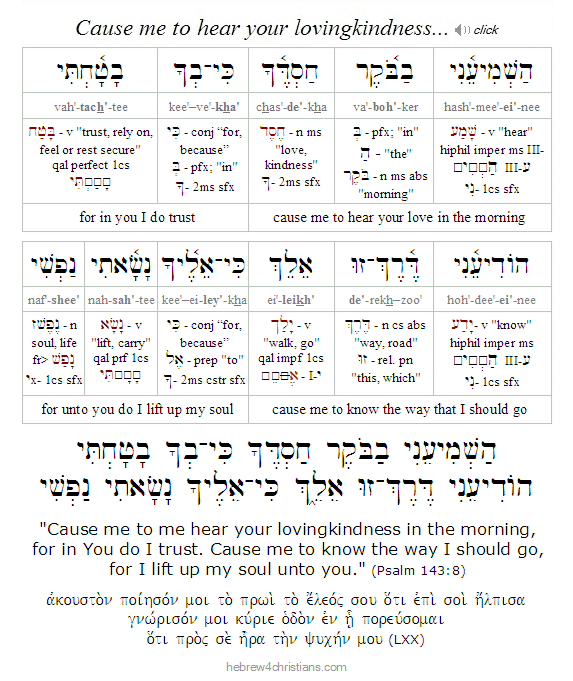 |
 |
Happy Jerusalem Day (יום ירושלים שמח)
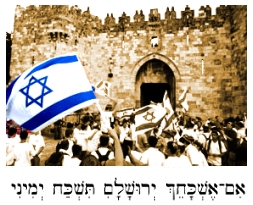
[ Yom Yerushalayim, or Jerusalem Day, is observed May 22nd this year... ]
05.21.20 (Iyyar 28, 5780) Yom Yerushalayim, or Jerusalem Day, is the most recent addition to the Jewish calendar, marking the prophetic day when Israeli soldiers victoriously recaptured the Old City of Jerusalem from Jordanian control during the Arab-Israeli Six Day War (on June 7th, 1967, or Iyyar 28, 5727). It is customary to recite a blessing for Jerusalem (Zion) before the Torah is read during synagogue services, though praying for the welfare of Jerusalem is always an appeal of the Ruach Hakodesh (Holy Spirit), especailly at this time. "Father of mercies, do good in Thy good pleasure unto Zion, build Thou the walls of Jerusalem (Psalm 51:18). For in You alone do we trust, O King, God exalted and uplifted, Master of the universe" (from the traditional prayerbook):
 |
Jerusalem is central to the Jewish heart. When religious Jews pray three times a day, they always turn toward Jerusalem (they also keep a small section of an eastern wall in their house unplastered and unpainted (called a mizrach: מזרח) as a sign of mourning for the destruction of the Holy Temple). The Jewish people close the Passover Seder with the words BaShanah Haba'ah Bi Yerushalayim (בשנה הבאה בירושלים) - "Next Year in Jerusalem!" These same words are invoked to conclude the holiest day of the Jewish year, Yom Kippur. During a Jewish wedding ceremony, the groom breaks a glass as yet another token of mourning for the loss of the former glory of the Temple in Jerusalem.
For followers of Yeshua the Messiah, Jerusalem is the "City of the great King" (Matt 5:35), sometimes understood allegorically to be heaven on earth. It is the place where our Savior was crucified, buried, resurrected, and ascended to heaven in fulfillment of the words of the prophets and the testimony of the Jewish holdays (mo'edim). It is the birthplace of the church (i.e., kehillat ha'mashiach: קהילת המשיח). And it is also the place where Yeshua will one day return as Mashiach ben David to restore the throne of David in Israel.
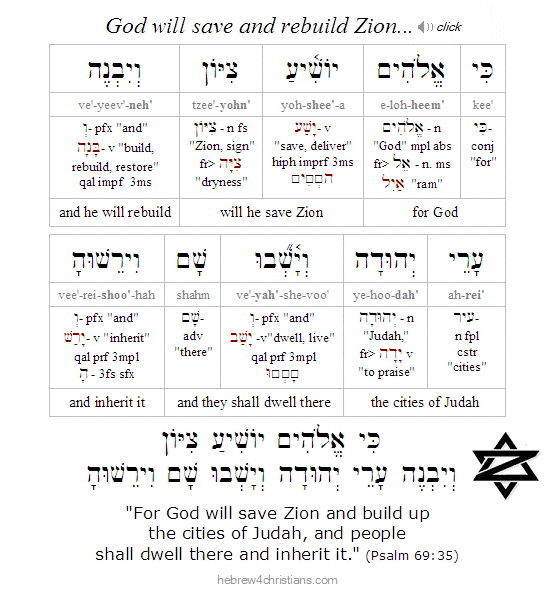 |
Some Related Topics:
Heeding the Call of Hope...
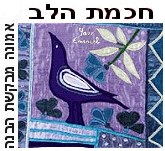
05.21.20 (Iyyar 28, 5780) The only way out of the painful ambiguity of life is to hear a message from the higher world, the Heavenly Voice, that brings hope to our aching and troubled hearts: "Faith comes by hearing the word of Messiah - ῥῆμα Χριστοῦ" (Rom. 10:17). And yet what is the meaning of this message if it is not that all shall be made well by heaven's hand? There is hope, there is hope, and all your fears will one day be cast into outer darkness, swallowed up by God's unending comfort... "Go into all the world and make students (תַּלְמִידִים) of all nations" (Matt 28:19), and that means sharing the hope that what makes us sick - our depravity and despair - has been healed by Yeshua, and that we escape the gravity of our own fallenness if we accept his invitation to receive life in him. "For it is you who light my lamp; the LORD my God outshines my darkness."
כי־אתה תאיר נרי
יהוה אלהי יגיה חשׁכי
kee · a·tah · ta·eer · nei·ree
Adonai · E·loh·hai · ya·gee'·ah · chosh·kee

"For it is you who light my lamp;
the LORD my God will outshine my darkness."
(Psalm 18:28)


Hebrew Study Card
Exercising faith means actively listening to the Eternal Voice, the Word of the LORD that calls out in love in search of your heart's trust... To have faith means justifying God's faith in you, that is, understanding that you are worthy of salvation, that you truly matter to God, and that the Voice calls out your name, too.... Living in faith means consciously accepting that you are accepted by God's love and grace. Trusting God means that you bear ambiguity, heartache, and darkness, yet you still allow hope to enlighten your way.
Therefore we "walk by faith, not by sight," as if the invisible is indeed visible. We must stay strong and keep hope, for through hope we are saved (Rom. 8:24). Faith is the "argument" (ἔλεγχος) from things unseen (Heb. 11:1). Do not be seduced by mere appearances; do not allow yourself to be bewitched into thinking that this world should ever be your home. No, we are strangers and pilgrims here; we are on the journey to the reach "the City of Living God, to heavenly Jerusalem, to the assembly of the firstborn who are enrolled in heaven" (Heb. 12:22-23). Therefore do not lose heart. Keep to the narrow path. Set your affections on things above since your real life is "hidden with God" (Col. 3:1-4). Do not yield to the temptation of despair. Look beyond the "giants of the land" and reckon them as already fallen. Keep pressing on. Chazak, chazak, ve-nit chazek - "Be strong, be strong, and let us be strengthened!" Fight the good fight of the faith. May the LORD our God help you take hold of the eternal life to which you were called (1 Tim. 6:12).
 |
The Center of our Journey...
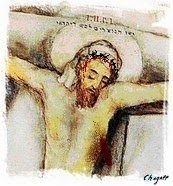
[ The following is related to our Torah reading for this week, parashat Bamidbar... ]
05.21.20 (Iyyar 28, 5780) Just as the Jewish people encamped in the desert around the holy Ark of the Covenant, the throne of the Word of God that was sprinkled with sacrificial blood for atonement, so we sojourn our days focused on the Living Word of God, who offered up his own blood upon the heavenly kapporet for our eternal atonement. "For by a single offering (קרבן אחד) he has perfected for all time those who are being sanctified" (Heb. 10:14). The sacrificial love of God is the centermost truth of reality: "For I decided to know nothing among you except Yeshua the Messiah and him crucified" (1 Cor. 2:2).
What You Really Need...
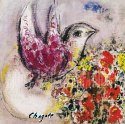
05.21.20 (Iyyar 28, 5780) We don't pray to attempt to change God's mind, but rather to change our own: "Your Father knows what you need before you ask him" (Matt. 6:8). Prayer is not a means of getting your Father's attention, but rather of getting your attention fixed on reality. It is a confession of your great need to find out who you really are. And while it is indeed true that "God knows everything," He does not know anything apart from his love. God does not "know" you in some "abstract" sense, like a computer that stores data and information, but rather as a parent who loves and cares for you (Psalm 103:13). Your heavenly Father knows the number of hairs on your head; he knows the word on your tongue before you utter it, and he perfectly sees your beginning and end. He has intimate understanding of who you are and what you really need.
Blessing of Inner Strength...
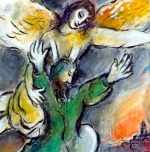
05.20.20 (Iyyar 27, 5780) Do you sometimes feel out of control with your emotions? Have you ever felt overwhelmed by fear, anger, or inordinate desire? Yeshua said "out of the heart come evil thoughts" (i.e., διαλογισμοὶ πονηροί, literally, evil "dialogs") that result in bad feelings, wicked actions, and despair, and therefore we must understand the connection between how we think (and what we believe) and the emotional condition of our inner life. Have you ever heard the saying, "Hurt people hurt people?" The word for "evil" in Hebrew (i.e., ra': רע) comes from a verb (רעע) that means to injure or harm others, though the word also connotes a despair of the heart that gives up and chooses to turn "hard" and difficult (קשה). Evil is also connected with cowardice, since the conscience (i.e., moral awareness) reveals judgment for sin, and therefore evil thinking leads to rationalizations, self-deception, and a running away from the truth about who we are...
The Scriptures say that a person without self-control (i.e., מעצר לרוּחוֹ, "rule over his spirit") is like an ancient city without walls - vulnerable to attack and easily overcome by hostile forces (Prov. 25:28)... If you are impulsive or easily agitated, you are rendered defenseless before the enemy of your soul, and therefore it is essential to repair any breach within your heart and to become unified in your thinking and resolve. The Holy Spirit is called the "Comforter" (παράκλητος) because he imparts strength that fortifies the heart. Therefore the fruit of the Spirit (פרי הרוח) is "self-control" (ἐγκράτεια), a word that means "inner strength" (from εν-, "in" + κράτος, "power") referring to mastery over one's desires and passions.
A person without self-control is easily overcome by evil. For example, a person who cannot control his anger cannot control what he says, and this reveals subjection to the lower nature. If a person says anything or everything that enters his mind, he is without boundaries, and there will be no door to close his lips... The same can be said of emotions that rise up with in the soul. Some strong emotions, of course, are appropriate to a given situation, but others are not, and without "taking every thought captive" by exercising self-control, we are liable to be brought into bondage to alien passions and obsessive thinking (2 Cor. 10:4). This is the source of addiction and all manner of self-destructive behavior in our lives. Being a "spirit without restraint" is to surrender yourself to dark forces that disregard the glory of your Creator.
God has not given us the spirit of fear but of "power and love and self-control" (2 Tim. 1:7). The Greek word used to translate "self-control" means to be sane, disciplined, restrained from the oppression of inner urges and impulses, and so on. The root word (σῴζω) means to healed from the tyranny of darkness, to be rescued and delivered from evil.... If you find yourself losing your temper or getting fearful when considering the rumors and "news" of this evil world, understand the limitations of your understanding and ask God for the blessing of self-restraint. King David asked the Lord to create in him a new heart that was willing to say "yes" to God's will, but we also need a new heart to say "no" to those impulses that seduce us to look away away from the truth. A double-minded person is "two-souled" (δίψυχος), living out the inner conflict of heart that has not decided what is most important.
"If there is no seed, there is no fruit;" and the type of seed always determines the type of fruit (1 Pet. 1:23; 1 John 3:9). We can sow to the flesh – and reap corruption - or we can sow to the Spirit - and reap life everlasting (Gal. 6:7-8). The formation of "Messiah-like character" is the result of discipline (παιδεία), a word that means to instruct or rear a child (παιδεύω) and is therefore connected with discipleship and education. Indeed, the Hebrew word for "discipline" is musar (מוסר), a term that refers to moral instruction and guidance, whereas the word for "education" is chinukh (חינוך), a term that shares the same root as the word "dedication" (i.e., chanukah: חנוכה). Unlike the Greek view that regards education as a pragmatic process of improving one's personal power or happiness, the Hebrew idea implies dedication/direction to God and His concrete purposes on the earth. Disciples of Yeshua are therefore called talmidim (תלמידים), a word that comes from lamad (למד) meaning "to learn" (a Hebrew word for teacher is melamed (מלמד), a word that shares the same root). There can be no discipline apart from education...
In the New Testament we read, "For the moment all discipline (παιδεία) does not seem full of joy but of sorrow, but afterwards it yields the peaceful fruit of righteousness (פרי הצדק) to those who have been exercised by it" (Heb. 12:11). The Greek word used for "exercised" is gumnadzo (γυμνάζω), often used to refer to training for competitive gymnastic events. Despite the analogy of training or "exercising" the physical body to comply with the directives of the spirit, however, it is important to remember that the life of God is a miracle that comes from God's own source of Life. It is the fruit of the Spirit, after all, and not the result of human effort or moral reformation. See John 15:1-8. Our lives are sanctified in the manner in which they were initially justified: wholly by faith in the love and grace of God... Just as we are unable to "crucify ourselves," so we are unable to produce fruit for God in ourselves. As Yeshua said, "Without me you can do nothing..." (John 15:5).
The Scriptures state twice: שרש למטה ועשה פרי למעלה / "Take root downward and bear fruit upward" (2 Kings 19:30; Isa. 37:31). As Yeshua said, "unless a grain of wheat falls to the ground and dies, it abides alone; but if it dies, it will produce abundant fruit (John 12:24). We pray we might surrender ourselves to the Lord fully, being immersed in His passion, "bearing fruit in every good work (ἐν παντὶ ἔργῳ ἀγαθῷ καρποφοροῦντες) and growing in da'at Adonai (ידיעת יהוה) - the knowledge of God" (Col. 1:10). The "fruit of the righteous is a Tree of Life" lit., etz chayim (עץ חיים), "the Tree of lives" (Prov. 11:30). It is the fruit of Yeshua, the Righteous One, who bears fruits of healing for the lives of those who turn to Him in trust...
All of us have "hidden faults" of which we are not fully aware. Therefore king David prayed, "Who can discern his errors? cleanse me from secret faults" (Psalm 19:12). We are cleansed by confession, that is, by looking within our hearts to uncover deeper motivations... If we are honest with ourselves we may discover, for example, that we are angry or covetous people, despite how we otherwise wish to regard ourselves. If you find yourself unable to let something go, for instance, some pain or failure of the past, remind yourself that you must do so if you want to move on with your life. Focusing on how things could have been different is to be enslaved to the past. The goal of teshuvah (repentance) is to turn us back to God for life, but to do this, we must be be willing to let go of what makes us sick.
Ha'cholash yomer gibbor ani (החלשׁ יאמר גבור אני) - "Let the weak say I am strong." The LORD "gives power to the faint, and to him who has no might he increases strength" (Isa. 40:29). Confess: "I can do all things through the Messiah who strengthens me," not "some things," or a "few things," but ALL things (Phil. 4:13). Yeshua is the Source of all our strength. "May you to be strengthened with power through his Spirit in your inner being" (Eph. 3:16). Let's remember to pray for one another and ask the LORD to help make each of us fruitful to the glory of our Heavenly Father (John 15:8). Amen.
 |
Teshuvah of the Mind...
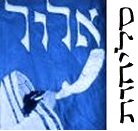
05.20.20 (Iyyar 27, 5780) We are responsible to walk in truth and to reject what is false (1 John 4:6). This implies that we have a moral and spiritual duty to think clearly and not to abuse our minds (Phil. 4:8; Rom. 12:2). The LORD our God will help us to do this, as Yeshua said: "I will ask the Father, and he will give you a Helper (παράκλητος, someone "called to one's side"), to be with you forever, even the Spirit of Truth (רוּחַ הָאֱמֶת), whom the world cannot receive, because it neither sees him nor knows him" (John 14:16-17). The Spirit of Truth helps us "discern what is the will of God, what is good, acceptable, and perfect" (Rom. 12:2) and empowers us to take "every thought captive" to the reality of the Divine Presence (2 Cor. 10:4-5). Truth is connected to memory - both in our personal histories as well as the history of God's redemptive actions performed on our behalf. Truth is ἀλήθεια, "a-letheia," not forgetfulfulness... Hence we are constantly commanded to remember what God has done for us and to "diligently repeat" the truth to our children (Deut. 6:4-9). Similarly, the Spirit of Truth brings to remembrance the words of Yeshua to our hearts (John 14:26).
Followers of Yeshua are commanded to love the truth and to think clearly about their faith. The ministry of reconciliation itself is defined as "the word of truth, by the power of God, through weapons of righteousness" (2 Cor. 6:7). Indeed, the word of truth (τὸν λόγον τῆς ἀληθείας) is a synonym for the "gospel of salvation" itself (Eph. 1:13; Col. 1:5; James 1:18). We are saved by Yeshua, who is the "way, the truth, and the life" (John 14:6). God commands all people to believe this truth (Acts 17:30-31; 1 Tim. 2:4). People perish because "they refuse to love the truth and so be saved" (2 Thess. 2:10-12). Therefore we see that the issue of truth is central to salvation itself....
Genuine teshuvah (repentance) implies that we will change our thinking in order to be transformed by God's truth. The follower of Messiah "cannot do anything against the truth, but only for the truth" (2 Cor. 13:8). During this Season of Teshuvah, may God help us all to think clearly and to turn our thoughts to Him. May He protect us from the vanity of a darkened mind and from all distractions that attempt to seduce us away from Him. May the LORD give us the purity of heart to know and do His will in the truth. Amen.
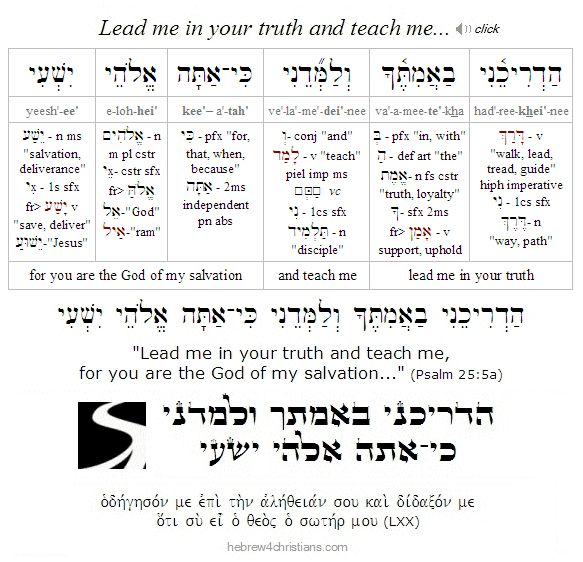 |
Note: For more on this subject, see "Teshuvah of the Mind."
Clear Thinking and Teshuvah...

05.20.20 (Iyyar 27, 5780) "As a man thinks in his heart, so is he" (Prov. 23:7). Consider for a moment how your thinking defines your inner reality and the quality of your spiritual life. Thinking is inextricably linked to faith, and therefore we are responsible not only for what we believe, but for how we think (Acts 17:30-31). Sinful thinking creates "negative energy" that brings pain to yourself and others. Left unchallenged, such impaired cognitive function leads to slavery of the mind, hopeless addictions of thought, and distressing captivity. The first step to freedom is to confess our sin, acknowledging the reality of our own negativity – and bringing that truth to the light. Therefore teshuvah – turning to God – involves cheshbon hanefesh (חֶשְׁבּוֹן הַנֶּפֶשׁ), accounting for our soul and yielding it to the love of God for rectification: "If we confess our sins, he is faithful and just to forgive us our sins and to cleanse us from all unrighteousness" (1 John 1:9). For freedom we have been set free, and that means freedom from the power of the lie. If we are blind to our own sin, we cannot confess the truth to find lasting healing (James 5:16).
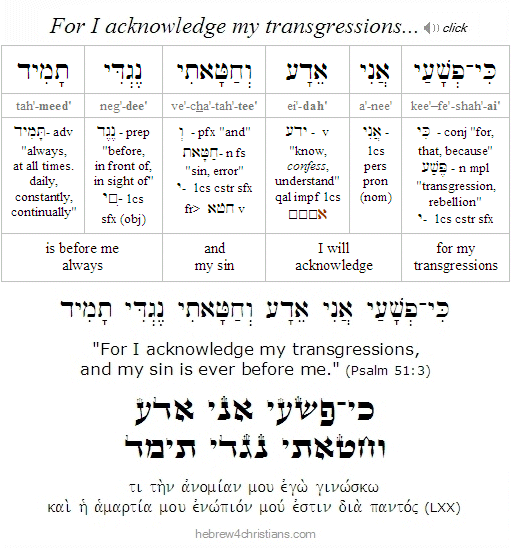 |
 |
Blessing of the desert (ברכת המדבר)

05.19.20 (Iyyar 26, 5780) Our Torah portion this week (Bamidbar) begins: "The LORD spoke to Moses in the desert of Sinai, in the tent of meeting (ohel mo'ed), on the first day of the second month, in the second year after they had come out of the land of Egypt" (Num. 1:1). Note again that the LORD spoke in the desert (ba-midbar) of Sinai, and that the Hebrew word for "desert" (i.e., midbar: מדבר) shares the same root as "word" (i.e., davar: דבר), which suggests that we hear the Word of God in a place of emptiness, brokenness and ongoing need. But note further that the LORD spoke in the "tent of meeting" (אהל מועד), which may be read as the tent of "mo'ed" (מוֹעֵד), or "holiday." We celebrate our need for God's healing and turn to him in a state of gratitude, even despite our sinful condition (Psalm 119:71). We take courage and draw near, renewed in trust. That is why the verse says it was "the first day of the second month" (חדש השני בשנה) -- the word "month" (chodesh) can be read as "new" (chadash), suggesting it was a time of renewal, a time to celebrate a new beginning (Acts 2:1-4). When David prayed in his need: "Create in me a clean heart, O God, and renew a right spirit within me" (Psalm 51:10), the Hebrew may be read: "Create in me a pure heart, O God, and renew within me ruach nachon (רוח נכון) - a spirit of "Yes" (כן). As Paul said of Messiah our Healer: "For all the promises of God find their Yes in him" (2 Cor. 1:20).
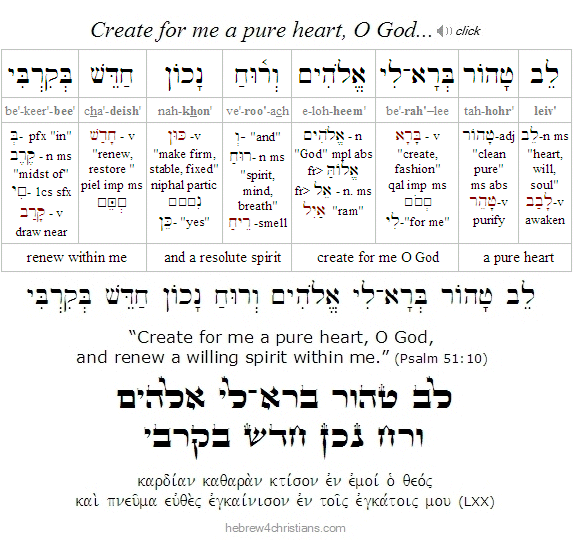 |
Our Heavenly Father sees in secret... "The deepest thing in our nature is this region of heart in which we dwell alone with our willingnesses and our unwillingnesses, our faiths and our fears" (William James). It is there, in the secret place of the heart, that the sound of the "knock" is either heard or disregarded (Rev 3:20). May the Lord give us the willingness to do His will and the courage to believe in His love. May we all be strong in faith, not staggering over the heavenly promises, but giving glory to God for the miracle of Yeshua our LORD. May we all be rooted and grounded in love so that we are empowered to apprehend the very "breadth and length and height and depth" of the love of God given to us in Messiah, so that we shall all be filled with all the fullness of God.
Accounted by God...

05.19.20 (Iyyar 26, 5780) Our Torah reading for this week, parashat Bamidbar, is always read just before the holiday of Shavuot (i.e., Pentecost), which is the time we celebrate "mattan Torah" -- the giving of the Torah of the LORD (first at Mount Sinai, later at Mount Zion). Central to sefer Bamidbar, or the Book of Numbers, is the counting of the person, identifying his "place" within Israel (Num. 1:52), and therefore the sages link the idea of being counted by God with the giving of the revelation itself. In other words, as we come to know who we are as God's redeemed people, as we learn to reckon ourselves as his beloved, so we will receive Torah and be accounted among his people. Our heads will be "lifted up," and we will receive the first blessing of Torah, namely: אנכי יהוה אלהיך - "I AM the LORD your (singular) God" (Exod. 20:2).
 |
"The LORD spoke to Moses in the desert of Sinai... saying 'Lift up the head' (i.e., count) of the children of Israel (Num. 1:1-2). The Torah commentator Rashi insightfully noted that as we are counted, so we are lifted up and beheld by God. In other words your life matters to heaven, and you are counted worthy because of God's great redeeming love. The sages say that each of us is as a letter of Torah; each of us counts in God's book. Indeed our beloved Savior Yeshua said, "Even the hairs on your head are numbered" (Matt. 10:30).
May you lift up your head and be counted as one of God's own, friend....
I am with you always...
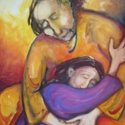
05.19.20 (Iyyar 26, 5780) The great Name of the LORD is "I-WILL-BE-WITH-YOU-ALWAYS" (אני אהיה עמך תמיד), which implies that we always live within God's Presence and care (Deut. 31:8, Josh. 1:9, Isa 41:10, Matt. 28:20; etc.). The Name YHVH (יהוה) signifies God's indomitable love and unfailing compassion. The LORD says to the trusting heart, hen al kapayim hachotikh: "Behold I have engraved you on the palms of my hands" (הֵן עַל־כַּפַּיִם חַקּתִיךְ; Isa. 49:16). Remember the One who stretched out his hands and died for your healing; remember that he said, "Don't be anxious about tomorrow, for tomorrow will be anxious for itself. Sufficient for the day is its own trouble." Again, "do not be anxious for any reason, but in everything by prayer and supplication with thanksgiving let your requests be made known to God, and the peace of God (שלום יהוה), which surpasses all understanding, will guard your hearts and your minds in Yeshua the Messiah" (Phil. 4:6-7). God keeps in perfect peace (lit. "the peace of peace") those whose lean on Him (Isa. 26:3).
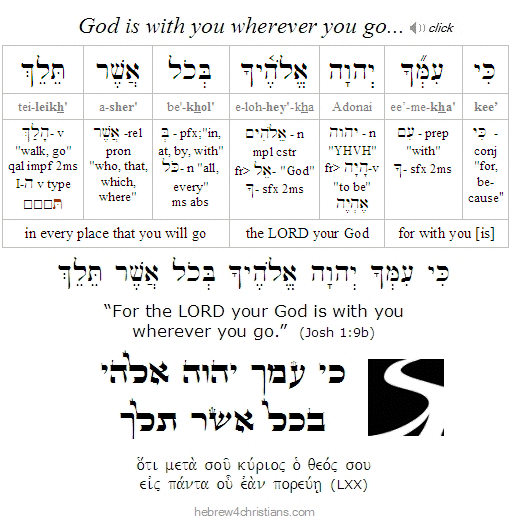 |
 |
Chayei Sha'ah - Fleeting Life

05.19.20 (Iyyar 26, 5780) Do any of us know the measure of our days? Can we truly appreciate the limited amount of time we are given in this life? When we are young we believe we will live forever; when we get older, we begin to understand that life goes by so quickly, and there never seems to be enough time... David prayed, "make me know my end and what is the measure of my days; let me know how fleeting I am" (Psalm 39:4).
Life in this world is called chayei sha'ah (חיי שעה, "fleeting life") in Jewish thought. Chayei sha'ah is the realm of "vanity of vanities" (הבל הבלים), life regarded as a vapor that soon dissipates in the winds of time (Eccl. 1:1; Job 8:9; Psalm 144:4). In light of eternity, King David reminds us that our days are as a few "handbreadths" (טפחות). We walk as "shadows" through the byways of this world (Psalm 39:5).
Many of us make the mistake of looking to the "what" of life instead of looking to the "who." We look superficially at things, at our present circumstances, and tend to forget that God is in control of all our days. Often we are looking for something rather than for Someone.
God sometimes may allow affliction and distress into our lives to help us regain a godly perspective. This is meant to shock us out of our lethargy. King David was at the point of death itself. He felt frail and alone. Like Solomon, he questioned the meaning of life. What good were riches or the esteem of others when everything is fading like a flower of the field (Job 14:2; Psalm 103:15)? David realized that life itself is a kind of suffering. The whole of creation groans and sighs....
The turning point came when David realized he was asking the wrong kind of question. Since the things of life are fleeting and empty, a mere change of circumstance is never enough. It is not a question of seeking a "what," but rather a "Who." Instead of focusing on external circumstances, David inwardly accepted the Presence of God in everything: tochaltee lekha hee: "my hope is for you."
וְעַתָּה מַה־קִּוִּיתִי אֲדנָי
תּוֹחַלְתִּי לְךָ הִיא
ve·a·tah · mah- kee·vee'·tee · Adonai?
to·chal·tee · le·kha · hee

"And now, O Lord, to what do I look?
my only hope is for You." (Psalm 39:7)
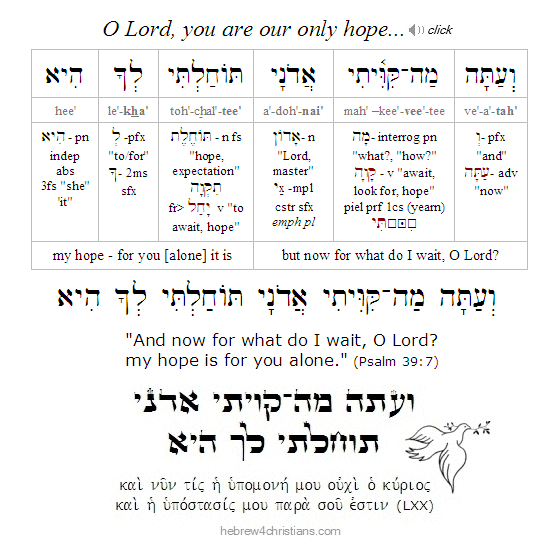
Hebrew Study Card
Creation was made subject to vanity, but it was done so for the sake of hope (Rom. 8:20). Hope (tochelet) is the substance of chayei olam (חיי עולם), or eternal life (Rom. 8:24). Because God ordered creation this way, we must turn our attention away from the flux of life to discover the Rock of Israel (צור ישראל), who is the abiding Substance of our hope. "Let this be recorded for a generation to come, so that a people yet to be created (עם נברא) may praise the LORD: that He looked down from His holy height (ממרום קדשו); from heaven the LORD looked at the earth, to hear the groans of the prisoners (לשמע אֶנקַת אָסיר), to set free those who were doomed to die (בני תמותה), that they may declare in Zion the Name of the LORD (לספּר בּציון שם יהוה), and in Jerusalem His praise" (Psalm 102:18-21).
The Spirit of the Word...
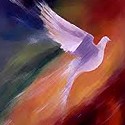
05.19.20 (Iyyar 26, 5780) Hebrew is written using only consonants; the vowel sounds are supplied by the one speaking the words (i.e., by inhaling/exhaling). "For the word is very near you" – כי־קרוב אליך הדבר מאד - "it is in your mouth and in your heart" (Deut. 30:14). Note that the word "breath" is ruach (רוח) in Hebrew (i.e., wind, spirit), and the word for "heart" is lev (לב), which is the center of volition. It is out of the desires (περίσσευμα) of the heart the mouth speaks (Luke 6:45). The spirit breathes life into what is spoken (John 6:63). "Behold, I will cause breath (רוח) to enter you, and you shall live" (Ezek. 37:5).
In the New Testament, the Apostle Paul identified "the word that is very near you" with the "word of faith" (τὸ ῥῆμα τῆς πίστεως), or the message of the gospel that offers salvation (Rom. 10:8). Note, however, that when Paul quoted from the Torah (i.e., Deut. 30:14), he deliberately omitted the phrase "so that you can do it" (לעשתו), because the message of the gospel is precisely that you cannot "do it," but (thanks be to God) Yeshua can and indeed already has finished the work on your behalf (John 19:30). Instead of attempting to merit your own righteousness through religious striving, you now confess your faith that Yeshua is the LORD (יהוה) who vanquished the power of sin and death on your behalf (Rom. 10:8-10). By faith you are "justified" in Yeshua - regarded by God as "just-if-I'd" never sinned - and "just-if-I'd" always obeyed. This is the miracle of the "exchanged life" based on the korban principle of the sacrifice of Messiah for our deliverance (2 Cor. 5:21). You are now set free to live by the power of the Holy Spirit according to the law of love. "For the law of the Spirit of life has set you free in Yeshua the Messiah from the law of sin and death" (Rom. 8:2). The Messiah alone is your Savior, the Substance of your hope. He "hears the groaning of the prisoner and sets free those who are subject to death" (Psalm 102:20).
"The righteousness of God" is revealed to the heart of faith, since "the righteous shall live by his faith" - tzaddik be'emunato yicheh (צדיק באמונתו יחיה) [Rom. 1:17; Hab. 2:4]. This is the righteousness of God manifested apart from the law (Rom. 3:21), or the "righteousness [of God] imputed apart from works" (Rom. 4:6). Faith in God's righteousness is the essence of all true Torah from heaven, since apart from faith we are spiritually dead and "powerless (ἀδύνατος) to please God" (Heb. 11:6).
The way of salvation (דרך הישועה) is always a matter of the heart and will, and therefore the Holy Spirit always cries out: Choose Life! "For this commandment (of teshuvah) is not too hard (lit. "too wonderful") for you, neither is it far away. It is not in heaven...nor across the sea.... Rather, the Word (הדבר) is very near you - in your mouth and your heart.... If you are willing to open you heart and believe, you will discover that "the kingdom of God is inside of you - ἐντὸς ὑμῶν ἐστιν (Luke 17:21), and that Yeshua is the breath of your life.
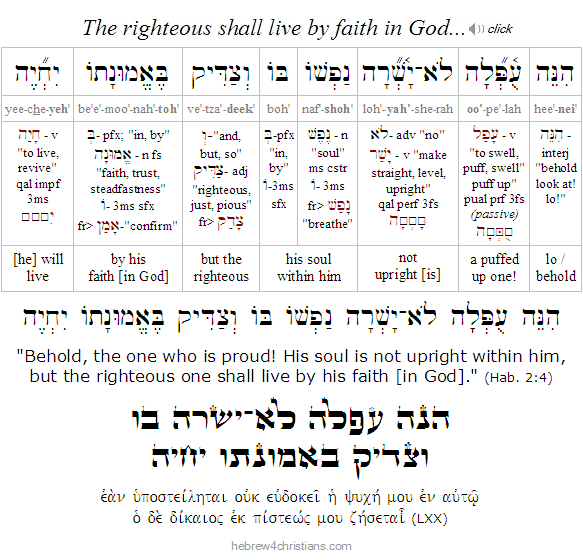 |
 |
Effective Spiritual Warfare...
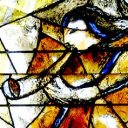
05.19.20 (Iyyar 26, 5780) There are two basic approaches to "spiritual warfare." The first is to look for the presence of evil and then pray for God's intervention, deliverance, protection, and so on. The second is to use the good eye (i.e., ha'ayin ha'tovah: העין הטובה) and focus on the truth and Reality of God instead - to "set your thoughts on things above" (Phil. 4:8). Whereas the former approach may at times seem necessary to repudiate encroaching darkness to find inner peace, the latter approach has the decided advantage of trusting in the Divine Presence that pervades and overrules all things (Psalm 16:8). When David was surrounded by the enemy, he kept focused on the glory of the LORD. David knew that God would shelter him and elevate him above the powers of darkness (Psalm 27:1-6). The highest form of spiritual warfare, then, is to consciously turn away from fear by choosing to praise the LORD God, magnifying His Name, and walking before Him in awe...
Counting our Days....
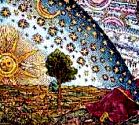
05.18.20 (Iyyar 24, 5780) Moses prayed to God: "teach us to number our days," that is, help us understand how to make our days count for eternity, to have a weight of glory that will shine in the world to come... The sages say on the day of death, one considers one's life as if it had been a single day. Life goes by so quickly, and we never know when our personal Rosh Hashanah will come. "No one knows the day or hour..." That's why it is so vital to be healed and to turn to God while there is still time. So turn to him today and bacharta ba'chayim – "choose life!" "For this commandment (of turning to God in teshuvah) is not hidden from you, and it is not far away. It is not in heaven... nor across the sea.... Rather, the matter is very near you - in your mouth and your heart - to do it" (Deut. 30:11-14; cp. Rom. 10:8-13).
לִמְנוֹת יָמֵינוּ כֵּן הוֹדַע
וְנָבִא לְבַב חָכְמָה
leem·noht · yah·mei'·noo · kein · hoh·da'
ve·na·vee · le·vav · chokh·mah

"Teach us to number our days
that we may get a heart of wisdom."
(Psalm 90:12)

Hebrew Study Card
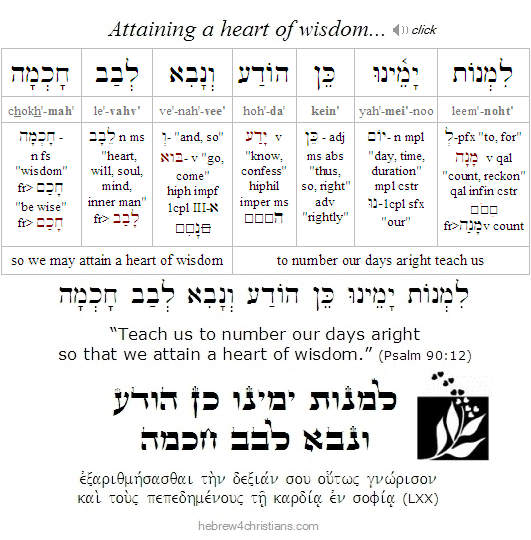
Remembering Jerusalem...
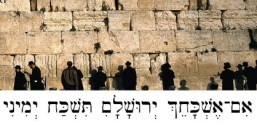
[ Yom Yerushalayim, or Jerusalem Day, begins Thursday, May 21st (after sundown) and will be observed throughout the following day (i.e., Friday, May 22nd). ]
05.18.20 (Iyyar 24, 5780) In Israel, "Jerusalem Day" (i.e., Yom Yerushalayim: יום ירושלים) commemorates the re-unification of old city of Jerusalem on June 7th, 1967 during the Six Day War. In 1968 the Chief Rabbinate of Israel declared Iyyar 28 to be a minor holiday to thank God for answering the 2,000-year-old prayer of "Next Year in Jerusalem." On March 23, 1998, the Knesset passed the Jerusalem Day Law, making it an annual national holiday.
Jerusalem is central to the Jewish heart. The Hebrew word "Zion" (ציון) is mentioned over 160 times in the Scriptures. That's more than the words faith, hope, love, and countless other key words... And since Zion is a poetic form of the word Jerusalem (ירושלים), the number of occurrences swells to nearly 1,000! Since it's the most frequently occurring place name in all the Scriptures, it's no overstatement to say that God Himself is a Zionist.... "Out of Zion, the perfection of beauty, God shines forth" (Psalm 50:2). "The LORD loves the gates of Zion more than all the dwellings of Jacob. Glorious things are said of you, O City of God" (Psalm 87:2-3). Indeed, Yeshua our Savior called Jerusalem the "City of the great King" (Psalm 48:2; Matt 5:35): It is the place (המקום) where He was crucified, buried, resurrected, and ascended to heaven; and is it furthermore the place where He will return to earth (Zech. 14:1-9).
In Psalm 122:6 it is written, "Pray for the peace of Jerusalem," a phrase that reveals prophetic truth about our Savior and Messiah. The word sha'alu (שאלו) means "you ask" (as in ask a sheilah, a question), shalom (שׁלוֹם) is the name of Yeshua, the Prince of Peace (i.e., Sar Shalom: שר־שלום), and Jerusalem means "the teaching of peace" (Jeru- comes from the same root as the word Torah [ירה], which means "teaching"). The phrase sha'alu shelom Yerushalayim can therefore be construed, "ask about the Prince of Peace and His Teaching." Amen. Yeshua the Messiah is indeed the rightful King of Jerusalem (Matt. 5:35) who is coming soon to establish Zion and to reign over all the earth.
שַׁאֲלוּ שְׁלוֹם יְרוּשָׁלָםִ
יִשְׁלָיוּ אהֲבָיִךְ
sha·a·loo · she·lohm · ye·roo·sha·la'·yeem
yeesh·la'·yoo · o·ha·va'·yeekh

"Pray for the peace of Jerusalem;
May those who love her be at peace" (Psalm 122:6).
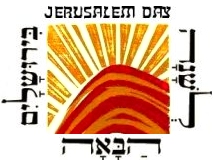
Download Study Card
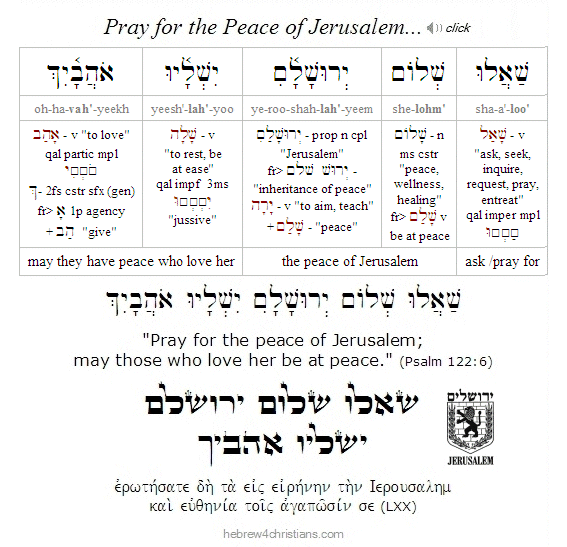
Friends, how can we forget Zion, "the city of the living God, the heavenly Jerusalem" (Heb. 12:22)? Is she not "our mother" (Gal. 4:26)? Are we not her citizens, indeed, her exiles in this age? As the psalmist said, "If I forget you, O Jerusalem, let my right hand forget its skill! Let my tongue stick to the roof of my mouth, if I do not remember you, if I do not set Jerusalem above my highest joy!" (Psalm 137:5-6). Yes we are instructed to "pray for the peace of Jerusalem" (Psalm 126:6), but we are further told to "badger" the LORD until he makes Zion "the praise of the earth" (Isa. 62:7).
Note: Click here to learn 25 reasons why Jerusalem matters...
Sivan: Month of Revelation...

05.18.20 (Iyyar 24, 5780) The third month of the Torah's calendar (as reckoned from the month of Nisan) is called Sivan (סיון), a 30-day lunar month which usually begins during late May or early June (this year, Saturday, May 23rd). In the Torah this month is simply called "the third month" (i.e., ha'chodesh ha-shlishi: החודש השלישי), though some time after the Babylonian Captivity it assumed its present name. Sivan is mentioned only once in the Jewish Scriptures, in the Book of Esther (Esther 8:9).
Since Sivan always has 30 full days, Rosh Chodesh Sivan (i.e., the celebration of the new month) is observed for only one day. The rabbis call the second day of Sivan is called "yom hameyuchat" (the "day of distinction"), since on this day the people agreed to accept the Torah, and upon thier ratification Moses instructed the people to prepare themselves to become "a kingdom of priests and a holy nation" (Exod. 19:6-8). In some circles this "day of distinction" is celebrated as a minor festival. On the third day of month the LORD instructed Moses to "set a boundary" (hagbalah) for the people around the mountain in preparation for the coming revelation to be given "three days later" (Exod. 19:9-15). These three days are called the "Three Days of Separation" (i.e., Sheloshet Yemei Hagbalah: שְׁלשֶׁת יְמֵי הַגְּבָּלָה) to prepare for the revelation on Sivan 6th: "Make yourselves ready by the third day" (Exod. 19:11,15). The Talmud comments: "Blessed be our God who has given a threefold Torah (Torah, Prophets, Writings) to a threefold nation (Kohanim, Levites, and Israelites) through one who was third (Moses, the third child after Aaron and Miriam) in the third month."
The first five days of the month of Sivan anticipate the day that the Torah was revealed to Israel at Sinai, namely, on the sixth of Sivan, a date which the rabbis later associated with the holiday of Shavuot ("Weeks" or "Pentecost"), which occured exactly seven weeks after the Exodus from Egypt. As mentioned in the Shavuot pages, on the night of Shavuot it is customary to stay up all night reading selections from the Torah until sunrise. This custom is called tikkun leil shavu'ot: תִּקּוּן לֵיל שָׁבוּעוֹת, "Rectification for Shavuot Night," and was instituted as a "remedy" for Israel's failure to be awake on the morning of the revelation (the midrash scolds the people who overslept on the morning of the revelation and needed to be roused to salute the King). Spiritually speaking, then, the month of Sivan represents the giving of the Torah to Israel (i.e., z'man mattan Toratenu: זְמַן מַתַּן תּוֹרָתֵינוּ), when the drama which began with the Exodus from Egypt culminated with the giving of the Torah. For Messianic believers, the month of Sivan also commemorates the giving of the Ruach Ha-Kodesh (Holy Spirit) to the followers of Yeshua after His ascension into heaven.
Rosh Chodesh Blessing:
יְהִי רָצוֹן מִלְּפָנֵיךָ יהוה אֱלהֵינוּ
וֵאלהֵי אֲבוֹתֵינוּ שֶׁתְּחַדֵּשׁ עָלֵינוּ חדֶשׁ טוֹב
בַּאֲדנֵינוּ יֵשׁוּעַ הַמָּשִׁיחַ אָמֵן
ye·hee · ra·tzon · meel·fa·ney'·kha · Adonai · E·lo·hey'·noo
vei·lo·hey · a·vo·tey'·noo · she·te·cha·deish · a·ley'·noo · choh·desh tov
ba'a·do·ney'·noo · Ye·shoo'·a' · ha·ma·shee'·ach · a·mein

"May it be Your will, LORD our God and God of our fathers,
that you renew for us a good month in our Lord Yeshua the Messiah. Amen."
Download Study Card

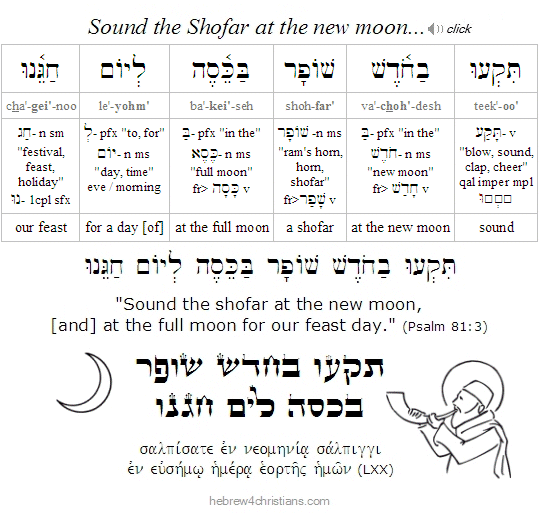
Parashat Bamidbar (פרשת במדבר)

[ Our Torah reading for this week, parashat Bamidbar, is always read before the great holiday of Shavuot (i.e., "Pentecost")... ]
05.17.20 (Iyyar 23, 5780) We have a busy week ahead of us. First, we start reading the fourth book of the Torah, namely Sefer Bamidbar, or the "Book of Numbers." Next, the month of Sivan begins Saturday, May 23 at sundown, which heralds the conclusion of the 49 day countdown from the day following Passover (see Lev. 23:15-16). The first five days of the month of Sivan anticipate the day the Torah was given to Israel at Sinai, namely, the sixth of Sivan, which marks exactly seven weeks after the Exodus from Egypt. So I will be posting things related to both the Torah portion for this week as well as the holiday of Shavuot, which begins after next week (i.e., Thurs., May 28th after sundown). May the LORD show us grace as we study his Torah and to review the significance of the Torah written upon our hearts in the Messiah (Jer. 31:31, Heb. 10:16, Jer. 32:40). Amen.
Our Torah portion for this week is called parashat Bamidbar (פרשת במדבר), and it begins where the Book of Exodus left off, that is, with the glory of the LORD hovering over the Mishkan (Tabernacle) as the Israelites were stationed at Sinai (Exod. 40:38, Num. 1:1). On the first day of the thirteenth month following the Exodus from Egypt – exactly thirty days after the Tabernacle was first consecrated – God commanded Moses to take a census of all Israelite males over 20 years of age who would bear arms. Moses and the heads of each tribe recorded the results, with 603,550 men in all. This number did not include the Levites, however, since they were designated to take care of the Tabernacle during the journeys.
The LORD then gave instructions about how the Israelite camp was to be arranged. The Tabernacle would occupy the central location, with three clans of the Levites surrounding it on the north, south, and west (Moses and Aaron's tents were placed before the entrance on the east). The twelve other tribes were divided into four groups of three. All of the tents of the Israelites were to face the Tabernacle on every side. This camp formation was to be strictly maintained while traveling throughout the desert.
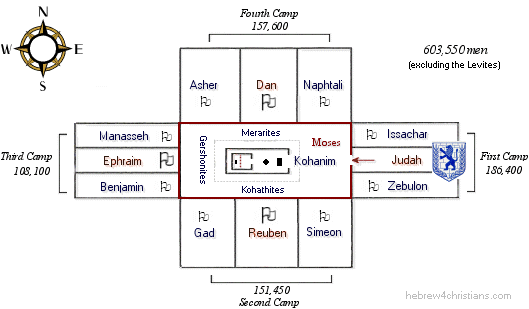 |
Each tribe had its own prince (i.e., nassi: נשׂיא), its own flag (i.e., degel: דגל) whose color corresponded with the color of its respective stone in Aaron's breastplate (Exod. 28:15-21). For example, Judah's stone was a sky-blue carbuncle and therefore the color of his flag was like the color of the sky with a "fiery lion" embroidered upon it (see Gen. 49:9).
The portion ends with a census of the three sons of Levi (בני לוי), namely Gershon (גרשׁון), Kohath (קהת), and Merari (מררי). The Gershonites were to maintain the inner tent of the Mishkan and were to be located on the west side of the courtyard; the Kohathites were to maintain the furnishings of the Mishkan such (as the Ark of the Covenant, the Menorah, etc.) and were to be located on the south side of the courtyard; and the Merarites maintained the frames and pillars of the Mishkan and were located to the north of the courtyard. Finally, though the sons of Aaron were descendants of Kohath, they were set apart to serve as priests (i.e., kohanim: כהנים) and were located before gate into the Mishkan to the east.
The Ascension of Messiah...
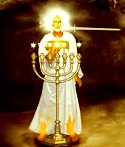
[ Monday, May 18th after sundown marks the 40th day of the Omer Count... ]
05.15.20 (Iyyar 21, 5780) We are in the midst of Sefirat Ha-Omer (the "Counting of the Omer"), a 49 day countdown that runs from Nisan 16 through Sivan 5. The first day of the omer count began on the day following Passover, and the last day occurs the day before the great jubilee of Shavuot ("Pentecost"). On our Gregorian calendars, these dates run from April 9th until May 28th this year. This is a "countdown period" leading to the giving of the Torah at Sinai and the giving of the Holy Spirit to Yeshua's disciples...
 |
Monday, May 18th after sundown (Iyyar 25) marks the 40th day of the Omer Count (i.e., Mem B'Omer), the time associated with the ascension of Yeshua back to the heavenly realm (Luke 24:44-53; Acts 1:9-11; Eph. 4:8). A thousand years before the birth of our Savior (מושׁיענו), King David prophesied of the ascension when he announced the Lord's enthronement at the right hand of God (Psalm 110:1; Matt. 22:41-46; 26:64). Recall that Yeshua told His followers that it was good that he would leave them, so that the Holy Spirit (רוח הקודש), the "Comforter" or "Advocate" (παράκλητος), would be given to them. "But I tell you the truth, it is for your advantage that I am going away. For if I do not go away, the Advocate (ὁ παράκλητος) will not come to you, but if I go, I will send him to you" (John 16:7). Notice that the word translated as "advantage" here is the Greek word συμφέρω (from σύν, "with" and φέρω, "to carry"), which suggests that we would be given power that "carries us" with the Lord during the trials of this life... Bo, Ruach Elohim (בוא רוח אלוהים) "Come, Holy Spirit..."
Note: For more on this, see "Mem B'Omer and the Ascension of Yeshua."
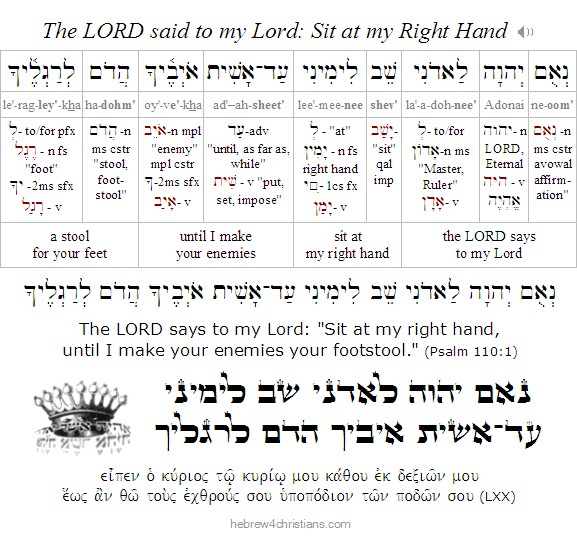 |
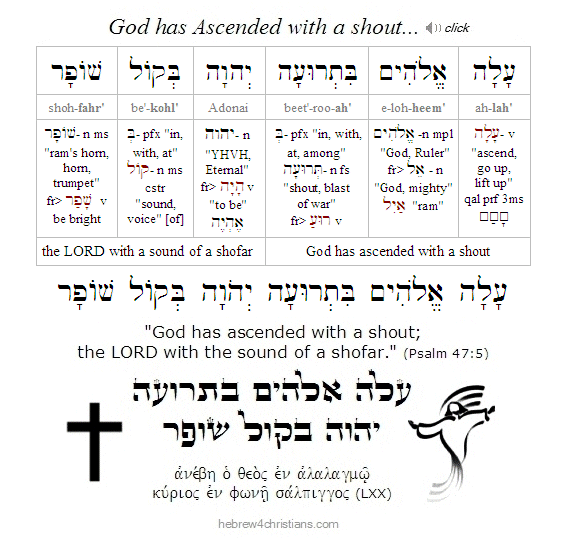 |
 |
Bound by Love's Promise...
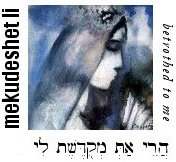
05.15.20 (Iyyar 21, 5780) From our Torah this week (i.e., Bechukotai) we read: "Then [after all the various judgments have befallen the people] I will remember my covenant with Jacob, and I will remember my covenant with Isaac and my covenant with Abraham, and I will remember the land" (Lev. 26:42). Here we note the "deeper Torah" of God's unconditional promise to the children of Israel that "contextualizes" the various tribulations they would suffer because of their disobedience to the terms of the covenant given at Sinai (Gen. 15). Therefore the Apostle Paul appealed to God's promises given to Abraham as the foundation for Torah, not to Israel's righteousness procured by means of the law (Rom. 9:31; Gal. 4:24-27). "For the promise to Abraham and his offspring that he would be heir of the world did not come through the law (οὐ γὰρ διὰ νόμου) but through the righteousness of faith" (Rom. 4:13). The better covenant of Zion was prefigured at Mount Moriah - and hearkens back to Abraham and Isaac - not the later covenant made at Sinai (Gen. 22:16-18; Heb. 6:13-15; John 3:16). As for Israel in the galut (exile), God has promised: "But I will for their sake remember the covenant with their forefathers, whom I brought out of the land of Egypt in the sight of the nations, that I might be their God: I am the LORD" (Lev. 26:45). Note again that this covenant relationship was established when we were without anything – we had no Torah, no mitzvot, nor any good deeds to commend ourselves before heaven. Nevertheless, God chose us and called us his people, and all this comes from his great love.
Bound by love's promise... Now that's Torah!!!
Dangers of Carelessness...

[ The following is related to our Torah reading for this week, parashat Bechukotai... ]
05.15.20 (Iyyar 21, 5780) This week's Torah portion (i.e., Bechukotai) includes the first great "rebuke" (i.e., tochechah: הוכחה) of the community of Israel given in the Scriptures (the second is found in Ki Tavo, i.e., Deut. 28:15-68). In this sober and ominous section, God promises the people great blessing if they would obey Him (Lev. 26:3-13), but He forewarns that exile, persecution and other progressively worse punishments would befall them if they would break faith with Him (Lev. 26:14-46). The sages note that divine censure would come if the people "forgot" about God or otherwise became careless in their observance of His laws. They point out that the refrain "if you walk contrary to me" (והלכתם עמי בקרי) - which occurs several times during the rebuke - really means "if you walk carelessly (i.e., keri: קרי) with me." Rashi notes that the verb קָרָה means "to befall" or "to happen" and therefore suggests a sense of randomness (the related word mikreh [מִקְרֶה] means "coincidence"). If the people regarded the events of life as "random," then God would reciprocate by bringing senseless trouble into their lives... For this reason the sages regard a careless attitude about God's will as the very first step to inevitable apostasy. In other words, regarding whatever happens in life as mere "coincidence" essentially denies God's Presence (hashgachah pratit), and this attitude will eventually call for God's corrective intervention. People may be "hot or cold" regarding their relationship with Him, but God will never give the option of affecting indifference toward Him... Indeed, God often brings hardship into our lives to regain our attention and cause us to return to Him. As C.S. Lewis once said, "God whispers to us in our pleasures, speaks to us in our conscience, but shouts in our pains: It is His megaphone to rouse a deaf world" (Mere Christianity).
The portion begins, "If you walk in my statutes (i.e., bechukotai: בחקתי) and guard my commandments and you do them..." (Lev. 26:3), which led Rabbi Hanina to ask why the seemingly superfluous phrase, "and you do them" (וַעֲשִׂיתֶם אתָם) was included here. After all, if the people would walk in God's statutes and guard his commandments, wouldn't they necessarily be doing them? He then suggested that the vowels of the word otam ("them") should be vocalized as atem (אַתֶּם), "you," which would then change the sense of the phrase to become, "you shall make (עָשָׂה) yourselves" (i.e., into God's image). The logical corollary of this seems to imply that if you do not walk in God's statutes and guard his commandments, you will disfigure the image of God within you...
Interestingly, God specifically cites the failure to observe the Sabbatical Year (shemittah), mentioned in parashat Behar, as part of the reason why His judgment would come (Lev. 26:34-35,43). The observance of the Sabbatical Year, of course, required complete faith that God was in control of all the "happenings" of nature. Like the Sabbath day, the Sabbatical year was designated to proclaim that God is the King of the universe. Those who disregarded this law therefore denied God's rule over nature, and thereby denied the existence of spiritual reality that ultimately governs the physical world...
יִרְאַת יְהוָה רֵאשִׁית דָּעַת
חָכְמָה וּמוּסָר אֱוִילִים בָּזוּ
yeer·at · Adonai · rei·sheet · da'·at
chokh·mah · oo·moo·sar · e·vee·leem · ba'·zoo

"The fear of the LORD is the beginning of knowledge;
fools despise wisdom and moral discipline." (Prov. 1:7)
Download Study Card


The Scriptures warn us to "pay more careful attention to what we have heard so that we do not drift away" (Heb. 2:1). We must be anchored to the truth lest we become shipwrecked in our faith. Drifting occurs slowly and almost imperceptibly, though the end result is as deadly as openly turning away from God in outright apostasy. As C.S. Lewis once wrote, "The safest road to hell is the gradual one - the gentle slope, soft underfoot, without sudden turnings, without milestones, without signposts." The devil seeks to lull you to sleep...
Spiritual danger is just as real as physical danger, though most people pretend it isn't because it isn't as easily seen. The danger today is to give up hope, to "go with the flow," to become numb, to drift off asleep, and to die inside... It is far more dangerous to tranquilly ignore God's mercy, or to make a pretense of knowing God's grace, than it is to blatantly break his law. Therefore the urgent need is to remember, to hear, and to awaken the soul to face the truth about reality. We must focus the heart, concentrate the will, and consciously "set" the Lord always before us (Psalm 16:8). Each day we must awaken from our emptiness to reaffirm the central truth: "Hear, O Israel, the LORD is our God; the LORD is one; and you shall love the LORD your God with all your heart and with all your soul and with all your might" (Deut. 6:4-5). As the Apostle Paul said, "Awake, you who sleep, Arise from the dead, And Christ will give you light" (Eph. 5:14).
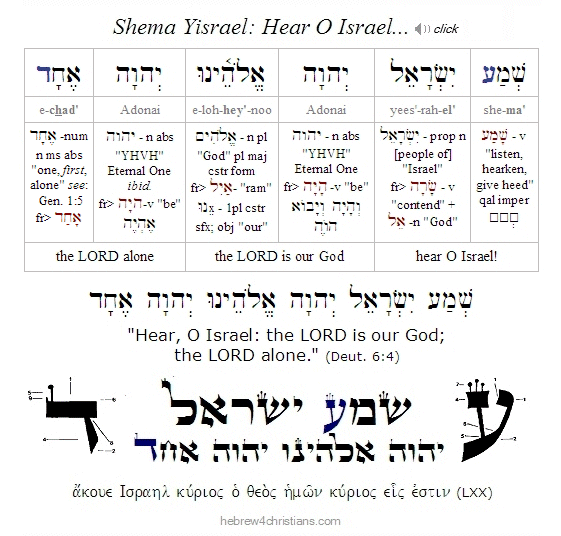 |
Therefore we must be vigilant to secure our high calling in Messiah: "Let us know; let us press on (i.e., נִרְדְּפָה, "pursue after") to know the LORD; His going out is sure as the dawn; He will come to us as the showers, as the spring rains that water the earth" (Hosea 6:3). The day is drawing near, and now - more than ever - we must remain steadfast. May God help you pursue him be'khol levavkha – "with all your heart" – because He has promised, "You will seek me and find me, when you seek me with all your heart" (Jer. 29:13). And may the love of the LORD be upon you, even as you put your hope in him (Psalm 33:22).
For more on this subject, see "The Tochechah: Further Thoughts on Bechukotai."
Shavuot and the End of Days...

[ The following is related to our Torah for this week, parashat Behar-Bechukotai... ]
05.14.20 (Iyyar 20, 5780) The number seven (i.e, sheva: שׁבע) signifies completion, fullness, or rest. It first occurs in Torah where it is written "on the seventh day (ביום השׁביעי) God finished his work that he had done, and he rested on the seventh day from all his work that he had done; and God blessed the seventh day and made it holy, because on it God rested from all he had done in creation" (Gen. 2:2). The blessing of the seventh day is memorialized as the weekly Sabbath and its observance is one of the Ten Commandments (Exod. 20:8-11). There are seven ordained mo'edim (holidays) in the Jewish year: Passover, Unleavened Bread, Firstfruits, Shavuot, Yom Teruah, Yom Kippur, and Sukkot. The seventh month of the year was to be set apart with special sanctity and shofar blasts (Lev. 23:24).
In addition to the seventh day of rest every week (i.e., Shabbat), and the holy convocations during the seventh month (the Days of Awe), every seventh year the land was commanded to rest and remain fallow. This seventh year was called a shemittah (שמיטה), a word that means "to let go" or "to withdraw." After seven of these seven-year sabbatical cycles (shemittot) had elapsed, a fiftieth year -- called Yovel (יובל), or Jubilee year -- would occur, at which time the land would rest, servants would be set free, and the original tribal inheritances would be restored to their original owners. Just as the LORD instructed us to count seven weeks of days (i.e., 49 days) from Passover until the holiday of Shavuot (i.e., "Pentecost"), so he instructed us to count seven weeks of years (i.e., 49 years) until the great Jubilee.
 |
Some people believe that the ultimate fulfillment of the holiday of Shavuot is found in the mysterious catching away (ἁρπάζω, harpazo) of believers before the time of the "Great Tribulation" and the Great Day of the LORD (1 Thess. 4:17; John 14:3; 1 Cor. 15:51-52). They reason that since Shavuot marked the day of dramatic revelation, with signs of fire and the sounds of a heavenly shofar blast, an appointed time that marks the jubilee fulfillment of Passover, it can therefore be seen as the rapturous end of redemption for those who believe, symbolic of a wedding day, when God betrothed Israel as His own people, separate from all others. Both Jew and Gentile will be "waved" before the LORD (as symbolized by shtei ha-lechem, the two loaves), representing the "one new man" of kallat Mashiach, the "bride of Messiah," or the assembly of those called out from every tribe and tongue to be a part of God's heavenly kingdom.
Though no one knows the day or hour of the return of Yeshua our Messiah (Matt. 24:36; Acts 1:7), there are clues given in Scripture about the conditions of the world before His return, and Yeshua himself gave us parables admonishing us to actively be looking (Matt. 24:2-14; 25:1-13). The Apostle Paul said that followers of the Lord can know the "season" of Messiah's return, and warned that He will come "as a thief in the night" - not in great power and glory at the end of the age (1 Thess. 5:2-6). Moreover, Paul forewarned of the rise of worldwide godlessness (2 Tim. 3:1-7) and the eventual apostasy of the "institutionalized" church (1 Tim. 4:1-3). Other Scriptures foretell of the coming One World Government, the rise of the Messiah of evil (Antichrist) and the insitution of the "security state" (Dan. 11:38), the rebirth of the nation of Israel, the desire to rebuild the Temple, the coming Great Tribulation, and so on.
In addition to these general signs or clues, however, there are amazing prophecies of Daniel that should also be taken into account. The prophet Daniel wrote of seventy "weeks of years" (שבוע של שנים), or 490 years, that would explain what would happen in the latter days and the restoration of all things (Dan. 9:24).
Daniel divided the 490 years into three distinct parts. The first part was a seven weeks of years (i.e., 49 years) that foretold the rebuilding of Jerusalem that would begin with the decree of Cyrus (in 538 BC) after the 70 year Babylonian exile (see Isa. 44:26-28; 45:1-4, Ezra 1:1-3). The second part was a sixty two "weeks of years" period (i.e., 434 years) that would end end when the Messiah was "cut off" (כרת) to make an end of sins for his people and to bring in everlasting righteousness (Dan. 9:24-26). The third part was a final "week of years" (i.e., 7 years) in which an evil ruler would ascend to power who would make a covenant of peace with the world, but in the middle of the "week" (i.e., 3 1/2 years), would treacherously break the covenant and persecute Israel (Dan. 9:27, Matt. 24:15). This period of time is otherwise known as the time of Jacob's trouble (Jer. 30:7), the day of indignation (Isa. 26:20-21), and the "Great Tribulation" (Matt. 24:21; Dan. 12:1). The subsequent judgment from heaven during this time is called Yom Adonai ha'gadol (יום־יהוה הגדול) "the great day of the LORD" (Joel 1:15; Isa. 2:12; Jer. 46:10; Ezek. 30:3; Zeph. 1:7, etc.).
What is particularly interesting from a prophetic point of view is that the climactic 70th week of years was set apart and broken off from the previous 69 weeks of years, creating a "gap" or hiatus that has been called "the age of grace" or sometimes the "church age." The gap is alluded to by the statement that Messiah the Prince (משׁיח נגיד) would be "cut off" and after that would occur an undefined time of "desolations" of the Roman wars, the destruction of the Second Temple, and the worldwide diaspora of the Jewish people (Dan. 9:26). During this time (or "dispensation"), the way to be in right relationship with God is to believe the message of the gospel of Yeshua the Messiah.
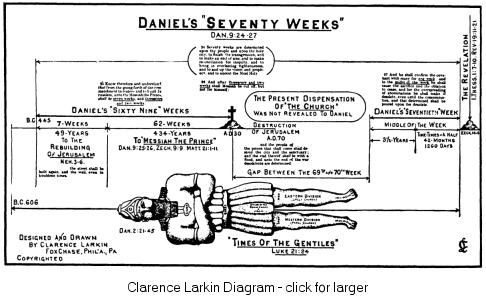 |
Now the final 70th week of years is itself divided into two equal parts: the first part will be a time of "peace," but in the middle of the week (וחצי השׁבוע) the evil ruler (המשיח השקרי) will break the covenant, stop Jewish worship practices, and declare himself to be a god. He then will persecute the Jewish people and attempt to finally exterminate them from the earth (2 Thess. 2:3-8). Before the advent of last week of years, however, the restraining power of God will be removed, which some associate with the rapture or "snatching away" of the followers of Messiah (2 Thess. 2:6-7; Gen 7:1-16). Believers will then set apart from the plagues of God's wrath mentioned in the book of Revelation (1 Thess. 5:9) to participate in the "Marriage of the Lamb" (Rev. 19:7). Seven blessings will be recited (i.e, sheva berachot) and the bride will circle the groom seven times under the chuppah (wedding canopy). After the marriage are seven days of celebration. After this the LORD will return to earth with his saints, overthrow the false Messiah, save the Jewish people, and establish the Kingdom of God (Rev. 19:11-16). The promises of the LORD spoken of the prophets concerning Zion and the blessing of the land given to Abraham, Isaac, and Jacob will be fulfilled (Isa. 2:2-4; Micah 4:1; Zech. 8:3; Psalm 86:9; Jer. 3:17) and the Seventh Millennium of history will commence (Rev. 20:4).
"Out of Zion, the perfection of beauty, God shines forth" (Psalm 50:2). Zion represents the rule and reign of God in the earth and is therefore synonymous with the Kingdom of God. The entire redemptive plan of God -- including the coming of the Messiah Himself and our very salvation -- is wrapped up in the concept of Zion. It is the "historiography" of God -- His philosophy of history, if you will. Zion represents our eschatological future -- our home in olam haba (the world to come). Even the new heavens and earth will be called Jerusalem -- "Zion in her perfection" (Rev. 21). "This is what Adonai Tzeva'ot says: I am very jealous for Jerusalem and Zion, but I am very angry with the nations that feel secure" (Zech. 1:14-15). "For Zion's sake I will not keep silent, for Jerusalem's sake I will not remain quiet, till her righteousness shines out like the dawn, her salvation like a blazing torch" (Isa 62:1). "The builder of Jerusalem is God, the outcasts of Israel he will gather in... Praise God, O Jerusalem, laud your God, O Zion" (Psalm 147:2-12).
The LORD God Almighty has vowed to break the pride of the "kings of the earth" with a rod of iron and dash them in pieces like a potter's vessel, and the shattering will be so ruthless that among its fragments not a shard will be found with which to take fire from the hearth, or to dip up water out of the cistern (Psalm 2:9; Isa. 30:14). For from His mouth comes a sharp sword with which to strike down the nations, and He will rule them with a rod of iron. He will tread the winepress of the fury of the wrath of God the Almighty (Rev. 19:15). Nebuchadnezzar's great dream will soon be fulfilled: "As you looked, a Stone was cut out by no human hand, and it struck the image on its feet of iron and clay, breaking them in pieces. Then the iron, the clay, the bronze, the silver, and the gold, all together were broken in pieces, and became like the chaff of the summer threshing floors; and the wind carried them away, so that not a trace of them could be found. But the stone that struck the image became a great mountain and filled the whole earth" (Dan. 2:34-35). "And the God of heaven will set up a kingdom that shall never be destroyed ... and it shall stand forever" (Dan. 2:44). One day the edifice of man's godless pride will come crashing down, and there will be no trace left of its rubble... Even so, come quickly, Lord!
Note: You may disagree regarding the theology of a pretribulational rapture, though it is important to walk in peace and follow holiness (Heb. 12:14). The essential thing, of course, is that we are looking to Yeshua and not to the things of this world... We are to set the Lord always before us (Psalm 16:8); we are to abide in the Lord's presence always (Psalm 105:4). If we are walking in the truth, calling upon His Name, trusting in Him for deliverance and guidance, our Lord will never fail us. The danger with end-times "hairsplitting" is that it can lead to anxious thoughts and carnal pride. Keep it simple. Follow Yeshua and everything else will take care of itself. "Sufficient unto the day is the evil thereof" (Matt. 6:33-34).
The Seven "Days" of History...
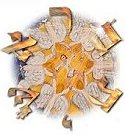
[ The following is related to our Torah for this week, parashat Behar-Bechukotai... ]
05.14.20 (Iyyar 20, 5780) Jewish tradition has long held that human history (olam hazeh) would endure for 6,000 years - from the time of the impartation of the neshamah (soul) to Adam in the Garden of Eden to the coming of the Messiah. There were two primary arguments for this view of history. First, the sages argued that a "divine day" (יוֹם) equaled 1,000 years based on Psalm 90:4: "A thousand years (אֶלֶף שָׁנִים) in your sight is as a day (i.e., ke'yom: כְּיוֹם)." They reasoned that since man was made in the image of God, and the Torah describes six days of creation followed by a day of divine rest, mankind (as a whole) was therefore allotted 6 x 1,000 years (i.e., 6,000) for "works" to be established in the world, followed by a 1,000 year Shabbat (Sanhedrin 97a, Rosh Hashana 31a). The ancient Seder Olam Rabbah catalogs historical events from the start of Creation according to the 6,000 years of history. Humanity will have his time of reign on earth for 6,000 years and then the Messiah will begin his reign in the 7th millennium, a "Sabbath" of sacred history. Later midrash goes along with this basic outline: "Six eons for going in and coming out, for war and peace. The seventh eon is entirely Shabbat and rest for life everlasting" (Pirke de Rabbi Eliezer). The Apostle Peter may also have had this outline in mind when he wrote, "With the Lord one day is as a thousand years, and a thousand years as one day" (2 Pet. 3:8).
Second, the Jewish mystics argued that since there are 6 Alephs (א) in the very first verse of the Torah, and each Aleph (אלף) represents 1,000, there must be 6,000 years of human history. The Zohar states, "The redemption of Israel will come about through the mystic force of the letter "Vav" [the sixth letter of the Aleph-bet, corresponding to the sixth Aleph] in the sixth millennium. Happy are those who will be left alive at the end of the sixth millennium to enter the Shabbat, which is the seventh millennium; for that is a day set apart for the Holy One to effect the union of new souls with old souls in the world" (Zohar, Vayera 119a).
So according to both the rabbis and the mystics, human history will last for 6,000 years - 1,000 years for each day of creation - followed by a 1,000 year "Shabbat" that represents the Messianic Age of global and universal peace. After the Messiah appears, there will be peace on earth, and all the promises of God given through the prophets will be fulfilled.
It is worth noting that in the discussion from the Talmud, the 6,000 years of human history are divided into three epochs of 2,000 years each. The period of "tohu" occurred from the time of the fall of Adam until the call of Abraham; the period of "Torah" occurred from Abraham until the time of the destruction of the Second Temple, and the period of the "Messiah" refers to the time when the Messiah could appear before the Kingdom is established in Zion. The time immediately preceding the appearance of the Messiah will be a time of testing in which the world will undergo various forms of tribulation, called chevlei Mashiach (חֶבְלֵי הַמָּשִׁיחַ) - the "birth pangs of the Messiah" (Sanhedrin 98a; Ketubot, Bereshit Rabbah 42:4, Matt. 24:8). Some say the birth pangs are to last for 70 years, with the last 7 years being the most intense period of tribulation -- called the "Time of Jacob's Trouble" / עֵת־צָרָה הִיא לְיַעֲקב (Jer. 30:7). The climax of the "Great Tribulation" (צָרָה גְדוֹלָה) is called the great "Day of the LORD" (יוֹם־יהוה הַגָּדוֹל) which represents God's wrath poured out upon a rebellious world system. On this fateful day, the LORD will terribly shake the entire earth (Isa. 2:19) and worldwide catastrophes will occur. "For the great day of their wrath has come, and who can stand?" (Rev. 6:17). The prophet Malachi likewise says: "'Surely the day is coming; it will burn like a furnace. All the arrogant and every evildoer will be stubble, and that day that is coming will set them on fire,' says the LORD Almighty. 'Not a root or a branch will be left to them'" (Mal. 4:1). Only after the nations of the world have been judged will the Messianic kingdom (מַלְכוּת הָאֱלהִים) be established upon the earth. The remnant of Israel will be saved and the 1000 year reign of King Messiah will then commence (Rev. 20:4).
 |
Some Christian scholars such as the late Dr. Clarence Larkin have divided the days somewhat differently and have added an additional "day" based on the coming eternal state of the "Heavenly Jerusalem." Hence Larkin's depiction of the Eight Days of Creation:
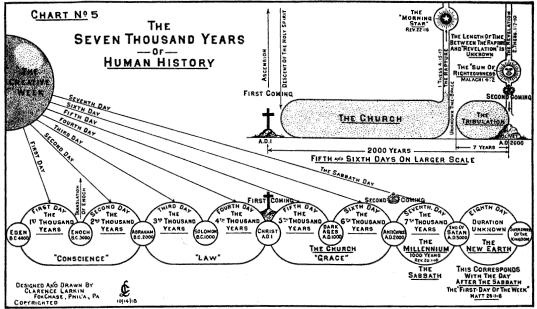 |
As for the exact timing of these events, "no one knows the day or hour." In fact, various Jewish sages have argued for "missing years" in the prophetic calendar (due to periods of exile or other factors) and therefore they say that the Day of the LORD may be delayed on account of national sins. For example, based on the gematria of the first two words of a verse from the Torah (i.e., וְהָיָה עֵקֶב, Deut. 7:12) Rashi explained that the 2,000 years of the Days of Messiah actually began 198 after the destruction of the Second Temple. "198 years after the destruction of the Temple the bells of the Messiah will be heard" (i.e., the days of the Messiah would begin). According to Rashi, the delay was the result of Israel's sin. (On the other hand, many ultra-Orthodox Jews believe they can "hasten" the Messiah's appearance through special acts of teshuvah: "Mashiach Now!").
Since Jewish tradition states that the "days of Messiah" began after 4,000 years of history (i.e., after four "days"), we can better understand the fervent Messianic expectation among the Jews during the first century in Judea. The Essenes were eagerly awaiting the advent of the "Teacher of Righteousness" and the "Zealots" wanted to establish the Kingdom of God by force of arms. if necessary. Even the common people of Israel expected that the Messiah would come soon appear to ransom captive Israel. It was in this context, then, in the "fullness of time" (Gal. 4:4), that our Lord Yeshua began His earthly ministry as the Suffering Slave (העבד הסובל) who redeemed us from the "tochechah," or the judgment of the law that held us captive (see: Lev. 26:14-45; Isa. 52:13-53:12; Gal. 3:13, Col. 2:14; 1 Pet. 2:24).
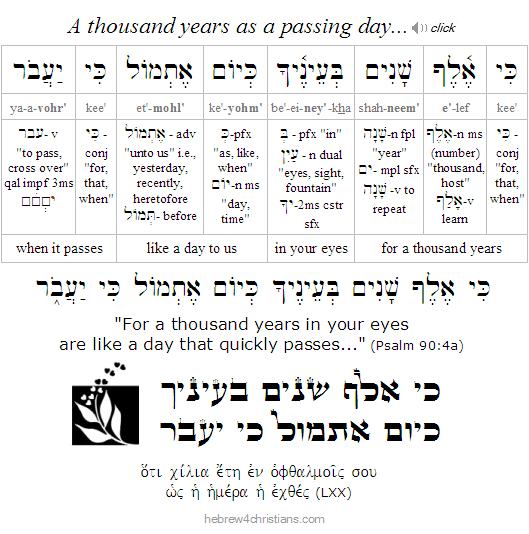 |
Note: Someone asked me whether we are presently past the 6,000 year mark now, and I replied that identifying the date since creation depends on details of which we are not entirely certain. We should not think that the year 2,000 on the Gentile calendar means the same thing as the "two days" of creation mentioned by the sages... For instance, the current Jewish year is 5780 from the creation, though there are perhaps some missing years in the genealogies and/or errors in some dates of historical significance (e.g., the exact date for the decree of Cyrus). In other words, I don't think that we can know for certain what year it is, despite the Jewish chronology given in the Seder Olam and the Christian historical chronology developed by Bishop James Ussher), though we can know we are "close" and therefore, despite not knowing the "day or hour" of his coming, we should be READY! Shalom.
Comfort ye My People...
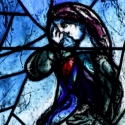
05.14.20 (Iyyar 20, 5780) "The LORD ... has sent me to bind up the brokenhearted, to proclaim liberty to the captives, and the opening of the prison to those who are bound" (Isa. 61:1). Note here that Messiah our Savior (משיח מושיענו) was explicitly sent to "bind up" the wounds of the brokenhearted. The Hebrew verb chavash (חָבַשׁ), "to bind up," can also mean to govern or to restrain... The LORD is near to the nishbar lev, the one with a broken heart. He restrains its woundedness and salves its hurt (Psalm 34:18). The Hebrew word "lev" (לב) metaphorically refers to our inner life, that is, our affections, mind, and will. This is revealed in the letters of the Hebrew word itself: the Lamed (ל) depicts a "staff" used to direct something (i.e., the will), and the Bet (בּ) depicts the "house" of the physical body. Lev then represents our inner life of thought and feeling expressed in our actions. Those who are broken in heart – the nishberei lev (נִשְׁבְּרֵי־לֵב) – have discovered that they cannot control their own lives, that they are inwardly "shattered," and therefore need divine help. Yeshua comes to those who are "poor in spirit" and viscerally humbled by their sin; He is near to those cut to the heart, to those who have bruised and wounded spirits and who live in great pain. It is for these the Savior rises to bring comfort....
This seems to be the divine pattern. "Truly, truly, I say to you, unless a grain of wheat falls into the earth and dies, it remains alone; but if it dies, it bears much fruit" (John 12:24). The hard "outer shell" of the seed must be broken so that the life of the Spirit can come through... Plainly put, God (and only God) can "deconstruct" the self so that life's priorities, focus, and passions are redirected to Him alone, the true Source of life.
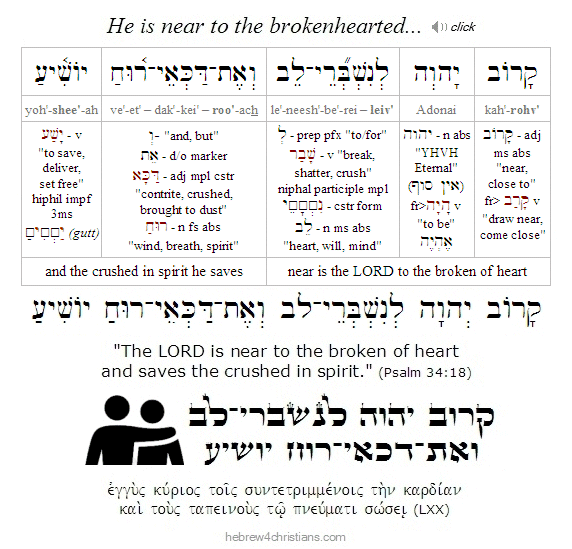 |
For more see: "The Spirit and Freedom: Further Thoughts on Shavuot."
Knowing the Heart of Torah...

05.14.20 (Iyyar 20, 5780) Though it is indeed true that "you are saved by grace through faith" (τῇ χάριτί ἐστε σεσῳσμένοι διὰ τῆς πίστεως) -- that is, you are declared "righteous" (צַדִּיק), set free from the curse of the law (Deut. 27:26, Gal. 3:13), and are given eternal life by means of trusting in the promise of God's love -- it is dangerous to assume that the freedom God gives you negates the significance of the law (תּוֹרָה) and its expression of God's holy will. Chas v'chalilah - God forbid! The sacrificial system of the law was a means of provision to find healing for our sin until the Messiah came to deliver us from the sickness of spiritual death. The cross means nothing apart from the law, and the law means nothing apart from the cross: Only the cross allows God's love and truth to meet (Psalm 85:10); only the cross reveals the true Holy of Holies where the blood was placed over the Ark of the Law; and only the cross intimates the Inner Sanctum of God's heart. Because of the cross, a holy God is able to truly love and help the trusting sinner (Rom. 3:26). It is written: "Righteousness and justice are the foundation of your throne (צֶדֶק וּמִשְׁפָּט מְכוֹן כִּסְאֶךָ); steadfast love and faithfulness go before you" (Psalm 89:14). Because of Yeshua, God is vindicated as entirely just - and the Justifier of those who trust in His redemptive love (Rom. 3:24-26). This is the deeper unity of the Name YHVH (יהוה), the Savior and LORD, revealed to Moses after the sin of the Golden Calf (Exod. 34:6-7), and this is the essential meaning of the cross of Yeshua, where the LORD passionately "prayed within Himself" so that His compassion would overcome His fearful judgment for our sins. "... that they may be one, even as we are one" (John 17:22). Yeshua is the prayer of God the Father for His children...
חֶסֶד־וֶאֱמֶת נִפְגָּשׁוּ
צֶדֶק וְשָׁלוֹם נָשָׁקוּ
che'·sed ve·e·met neef·ga'·shoo
tze'·dek ve·sha·lom na·sha'·koo

"Love and truth meet;
righteousness and peace have kissed."
(Psalm 85:10)

Download Study Card
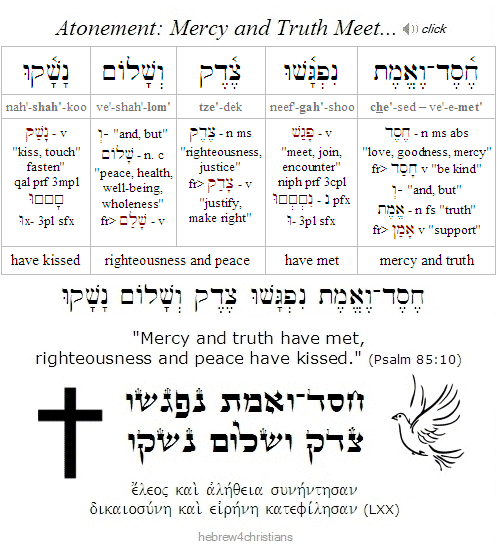
There is always a spiritual temptation to disregard the importance of the law and to offer various excuses why it no longer applies to the Christian. We must be wary about how our lower nature seeks to justify its own lawlessness... As Paul said, "Do we then overthrow the law by this faith? By no means! On the contrary, we establish the law (Rom. 3:31). The commandment is "holy and just and good" (Rom. 7:12). Please understand that I am not advocating Torah observance as the means of attaining righteousness before God (since that centers on the former covenant given at Sinai) and yet neither am I saying the Christian should ignore the law and regard it as obsolete or without divine voice (since the new covenant is a matter of the law being written upon the heart). Yeshua is the eternal Word of God, the Voice in the midst of the Fire, and yet he warned that many who professed faith in him would one day be rejected because they spurned God's law: "On that day many will say to me, 'Lord, Lord, did we not prophesy in your name, and cast out demons in your name, and do many mighty works in your name?' And then will I declare to them, 'I never knew you; depart from me, you workers of lawlessness' (i.e., ἀνομία, from -α ('not') + νομος, 'torah'). If God is love, he is, by definition, something more than mere kindness. And it appears, from all the records, that though he has often rebuked and condemned us, he has never regarded us with contempt. He has paid us the intolerable compliment of loving us in the deepest, most tragic, most inexorable sense" (C.S. Lewis: Problem of Pain). We are given a "severe mercy." The harrowing agony of the cross, the torture and suffering of our Lord, should shock us into understanding the weight of the law. The spectacle of the cross puts an end to all mawkish sentimentality about God's love. As Lewis said, the Lord loves you "tragically," at the expense of his own precious life offered for your deliverance...
Living in response to the love of God never leads to spiritual anarchy or "lawlessness," since the Law of Messiah (תּוֹרַת הַמָּשִׁיחַ) is to "bear one another's burdens" (Gal. 6:2) by emulating the sacrificial love that Yeshua has revealed and bestowed to us (John 13:15, 34, 15:12, etc.). God's love transforms and changes us. "If you love me," Yeshua said, "keep my commandments" (John 14:15, 15:10). God loves you just the way you are, yes, but he loves you so much he will never leave you just the way you are... Living in genuine faith means living by means of the agency of the Holy Spirit (רוּחַ הַקּדֶשׁ) -- also called the Comforter (παρακλητος) -- through whom the inner intent of the law is "written upon the heart" by faith (Jer. 31:33; Gal. 5:18, 22-23). The heart of the law, then, is the law of the Gospel message itself - to love God and to serve others through the miraculous agency of God's redemptive grace (Gal 5:13). It is a circle of divine communion, a result of our union with Messiah. Ultimately the love of God is the fulfillment of the law (Rom. 13:8-10, Gal. 5:14; James 2:8), and this love is manifest in the Person and Presence of Yeshua, the perfect fulfillment of the law of love (John 1:1, 13:34-35, 1 John 4:10-12, 2 John 1:6, etc.). The love of Yeshua imparts "righteousness to every one who believes" (Rom. 6:22; 10:4).
For more see: "The Heart of the Law and the Law of the Gospel."
 |
He makes all things new...
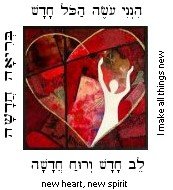
05.13.20 (Iyyar 19, 5780) Only God can help us die to ourselves - to let go of the "self life" and to be set free from the tyranny of what we naturally are... The old nature is never "reformed" by religion but is put to death by a supernatural act of God, as it says: "I have been crucified (συνεσταύρωμαι) with Messiah; it is no longer "I" who live, but Messiah who lives in me. And the life "I" now live in the flesh "I" live by faith in the Son of God, who loved me and gave himself for me" (Gal. 2:20). By faith we trust that we already have been crucified with him, just as by faith we trust that we already have newness of life, though all this is only "theoretical" unless and until the Spirit of God makes it real in our lives: "The wind blows where it wishes, and you hear its sound, but you do not know where it comes from or where it goes. So it is with everyone who is born of the Spirit" (John 3:8). Only the LORD can put a new heart within us; only God can make the new "I" walk in the flesh; only the Spirit can breathe upon dry bones raised from the dust to make them live (Ezek. 37:5).
עיני תמיד אל־יהוה
כי הוא־יוציא מרשׁת רגלי
ei·nai · ta·meed · el -Adonai
kee · hoo · yotz·ee · mei·re'·shet · rag·lai

"My eyes are always toward the LORD,
for he will free my feet from of the net."
(Psalm 25:15)

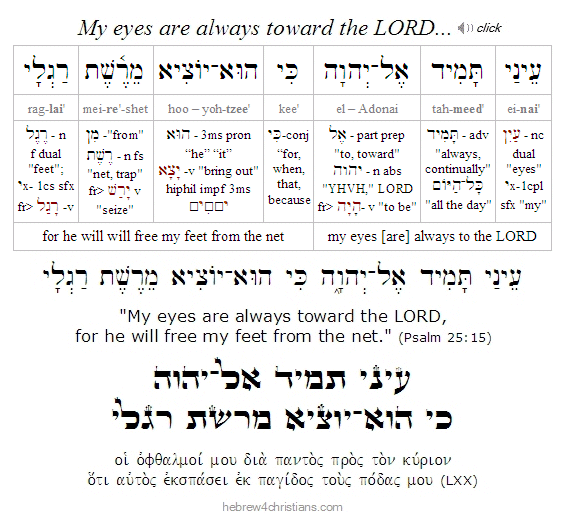
We believe not only that Yeshua died as our substitute for sin - saving us from its penalty - but also that our old nature has died with him - delivering us from its power: "We know that our old self was crucified with him in order that the body of sin might be brought to nothing, so that we would no longer be enslaved to sin" (Rom. 6:6). As it is written: "For by grace you are saved through faith, and this is not from yourselves, it is the gift of God; not a result of works, so that no one may boast. For we are his workmanship (αὐτοῦ γάρ ἐσμεν ποίημα), created in Yeshua the Messiah for good works, which God prepared beforehand that we should walk in them" (Eph. 2:8-10). Note the use of the word "works" and "workmanship" in this passage. Human works (ἔργοι) here refer to religious or ethical acts that are performed in order to secure divine favor, and this is contrasted with God's work of righteousness that justifies the one who trusts in Yeshua for salvation. Salvation is a matter of God's "workmanship" (ποίημα) done through the agency of his Spirit, and not as a result of our of religious efforts or practices. We are saved by trusting in God's grace alone and healing, though our regeneration initiates a process wherein we are made to resemble the image of Messiah, doing works that bear witness of his life and spirit within us (Rom. 8:29; John 15:5). "For as many of you as were baptized into Messiah have put on the Messiah" (Gal. 3:27) [by "baptism" think identification, not some ritual act]. We work out what God has worked in our hearts. May the LORD our God make the truth of what He has done for us alive and breathing freely within us -- by the power of his salvation in Yeshua!
 |
Confession's Conviction...

05.13.20 (Iyyar 19, 5780) "Faith is the foundation (i.e., ὑπόστασις: the "substance," reality, underlying essence, etc.) of our hope, the conviction of the unseen... Without faith it is impossible to please God, for whoever would draw near must believe that God exists and rewards (μισθαποδότης) those who seek him" (Heb. 11:1,6). Note that God is pleased when we seek his presence, that is, when we when we look past the ephemera and ambiguity of the phenomenal world for the truth about spiritual reality (2 Cor. 4:18). For our part, faith resolves to confession (ὁμολογέω), that is, aligning our perspective and focus to agree with the revelation and message of divine truth and verbally declaring our conviction. We must say that we believe and affirm it with all our heart (Rom. 10:9). As it says, "I will make Your faithfulness known with my mouth" (Psalm 89:2). When you encounter tribulation, or experience some crisis of faith, boldly reaffirm your hope: "I believe in God's promise..." Physically expressing your faith is itself an act of faith, and this encourages your soul to trust in God's healing reward even in the present struggle or darkness...
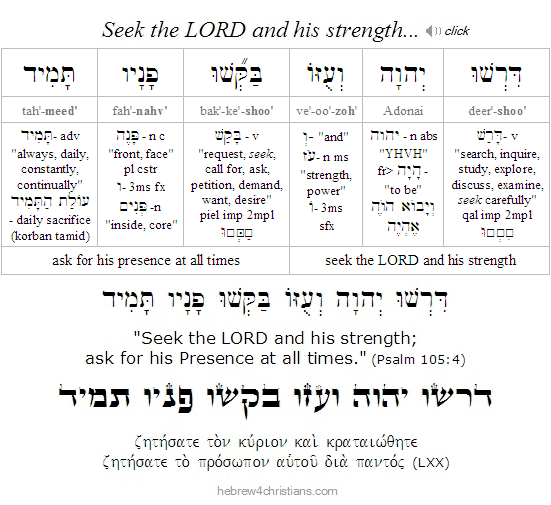 |
 |
Yeshua and the Torah...

05.12.20 (Iyyar 18, 5780) Yeshua said, "Do not think that I have come to abolish the Torah or the Prophets; I have not come to abolish them but to fulfill them. For truly, I say to you, until heaven and earth pass away, not an Yod (י), not a stroke (קוץ), will pass from the Torah until all is accomplished. Therefore whoever breaks one of the least of these commandments and teaches others to do the same will be called least in the kingdom of heaven, but whoever does them and teaches them will be called great in the kingdom of heaven" (Matt 5:17-19).
Notice how highly our Lord esteemed the Torah, saying that "kotzo shel Yod" (קוֹצוֹ שֶׁל יוֹד), that is, the smallest stroke atop the smallest Hebrew letter, has its holy purpose.
Now some Christians teach that the "law" (or Torah) is no longer applicable to followers of Yeshua, which seems an odd thing to say in light of this passage from the gospel, though I think that by this they mean that the law was abolished by means of Yeshua's death upon the cross. We need to be careful here. Yeshua's sacrificial death fulfilled the terms of the covenant at Sinai (ברית סיני) for our eternal atonement (כפרה), but the moral law of God (חוק מוסר) is not only repeated in the New Testament but is amplified (see Matt. 5:21-48). Moreover Yeshua plainly said that the Torah would have its voice and message for us "until heaven and earth pass away," which means that it still has its voice and message for our generation, since heaven and earth have not yet passed away, of course.
Indeed, far from being anti-Torah, only Christians can truly be "Torah observant," since Yeshua fulfills the sacrificial requirements of the law by means of his atonement at the cross, and he imparts the Holy Spirit within us so that the inner meaning of Torah is written upon our hearts (Jer. 31:33). Once again we must be careful to distinguish between the idea of "covenant" and "Torah." A covenant (ברית) is a specific agreement that establishes a relationship between God and man, whereas Torah (תורה) is a more general word that refers to instruction, direction, and teaching (ירה). The meaning of Torah is expressed in various commandments (מצוות), rules (משפטים), decrees (חוקים), and observances (עדויות). In the important passage from Jeremiah 33:31-33 -- the only place in the "Old Testament" that explicitly mentions the "new covenant" (בּרית חדשׁה) -- we note that the though the people broke the covenant given at Sinai, the LORD would establish a new covenant by putting the Torah within them and inscribe upon their hearts. This "unilateral" or "unconditional" covenant was foreshadowed by the earlier covenant God had made with Abraham regarding the promise that Abraham would become the father of a multitude that would one day inherit the kingdom of God (see Gen. 15).
Therefore it is only fitting that we love the Torah and celebrate its significance in our lives. After all, without the Torah, how could we understand the meaning and significance of the New Testament? How would we understand the basic concepts of sin, the need for blood atonement, and therefore the meaning of the cross? The principle of "a text without a context is a pretext" applies here. If we are not firmly grounded and rooted in the truth of the Torah, we will be liable to all sorts of errors of interpretation and erroneous conclusions. We see the tragic result in many of the apostate churches of our day. They forgot the role and importance of the Torah, falsely thinking they were "free from the law," which led to compromise after compromise, until there was nothing of substance left to believe in. "He that turns away his ear from hearing the Torah, even his prayer shall be abomination" (Prov. 28:6).
Where it is written, "all Scripture is breathed out by God (θεόπνευστος / עַל־פִּי רוּחַ אֱלהִים) and is profitable for teaching, for reproof, for correction, and for training in righteousness, that the man of God may be complete, equipped for every good work" (2 Tim 3:16-17), it is evident that the Scriptures referred to here are the Jewish Scriptures (i.e., the Torah, the Prophets, and the Writings), since they are the foundation, the context, and the overarching matrix for the later New Covenant revelation... These were the Scriptures Yeshua used to contextualize and explain his ministry to his followers: "And beginning with Moses and all the Prophets, he interpreted to them in all the Scriptures the things concerning himself" (Luke 24:27; John 1:45). In other words, the Torah has both a logical, a linguistic, and a theological priority regarding our understanding of the New Testament Scriptures, and the failure to read in context invariably leads to faulty interpretations and doctrinal errors of various kinds. "To the Jew first, and [then] to the Greek" (Rom. 1:16) is a principle not only of how the gospel message would transcend ethnic Israel to be offered to all the nations, but also about how we should approach the subject of Biblical hermeneutics.... God "breathed out" his revelation in order, and the message itself must be understood in light of that order (Gal. 4:4-5).
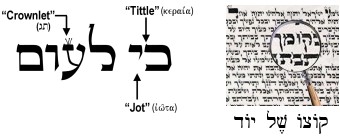 |
The Scriptures declare: "Blessed is the one who delights in the Torah of the LORD
(בְּתוֹרַת יְהוָה); and in His Torah meditates day and night ... all that he does shall prosper" (Psalm 1:1-3). We depart from the way of Torah whenever we heed of the counsel of the wicked -- whenever we begin making their words our own.... When we listen to various news reports from the mass media, or when we listen to the prevarications of politicians, for example, and uncritically accept their distorted versions of reality, we are "taking counsel of the wicked." The same can be said regarding heeding the messages of the advertisers, of television shows, movies, popular music, and so on. Often the messages are subliminal and attempt to cajole us to accept alternative versions of reality... Is it any wonder that television is referred to as "programming"? Advertisers, politicians, educational psychologists, sociologists, social engineers, etc., all understand that manipulating how people think determines what they will eventually do... Getting you to uncritically accept their messages is the first step to entrapping you.
If we are not careful, we might find ourselves believing the twisted versions of reality that are passed off as true in our world. If we find ourselves complaining, murmuring, or despairing over things of this world, we are seeing the evil that we are "scripted" to see, and therefore we become wicked ourselves. The "counsel of the wicked" is assimilated into our thoughts, our words, and our actions... Who we listen to is of vital importance, chaverim.
The way of the righteous is faith, hope, and love. In Hebrew hakarat tovah (הַכָּרַת טוֹבָה) means recognizing or being conscious of the good, i.e., gratitude. Hakarat tovah is one of the middot ha-lev (qualities of heart) that should mark the lives of those who are grace-based and focused. Gratitude is the product of joy (χαρα) obtained from the gift of being conscious of God's grace (χαρις). Faith accepts that all things work together for good - gam zu l'tovah ("this too is for the good") and therefore rejects assumptions that foster bitterness and anger.
The truly prosperous person - ashrei ha-ish - finds delight in the Torah of the LORD. Note that the Hebrew word asher (אָשֵׁר) means to go straight, to walk or press on, or to make progress. Pressing on in righteousness leads us to true happiness, a state of blessedness. The "happy man" (אַשְׁרֵי־הָאִישׁ) represents the ideal man of God who is not ensnared by the ways of the wickedness that surrounds him. His victory over the world is found in his faith. The way forward is the Torah-perspective. For more on this see the audio link below.
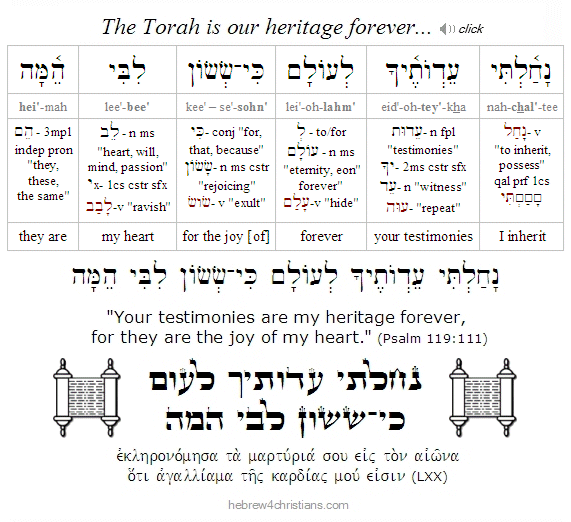 |
In Hebrew the word chinukh (חִנּוּךְ) means "education," a word that shares the same root as the word "chanukah" (חֲנֻכָּה, "dedication"). Unlike the Greek ideal that regards education as "enlightenment" (i.e., being "led out" of the cave of ignorance), the Jewish ideal implies dedication to God and His concrete purposes on the earth. This ideal goes beyond the process of merely transmitting information, since dedication must be modeled (lived) as well as intellectually taught. Maimonides noted that the Hebrew word chinukh comes from the Torah's description of dedicating a tool for use at the Holy Altar, "habituating the tool for its work." In other words, godly education is a process of modeling how to be made into a "fit vessel" for the service of God in this world. All other ends of knowledge ultimately exist for this purpose, and rightly understood, then, education may be regarded as a form of worship.
Disciples of Yeshua are called talmidim (תַּלְמִידִים) - a word that comes from lamad (לָמַד) meaning "to learn" (the Hebrew word for teacher is melamad (מְלַמֵּד) from the same root). Education is therefore foundational to being a disciple of the Messiah, and the great commission is for each of us to share His teaching with others (Matt. 28:19-20). May God help each of us to be students who are dedicated to living for the sake of Yeshua's Name.
Additional Note: We "walk in the Spirit" -- the same Spirit that writes the inner meaning of Torah upon our hearts (Jer. 31:33). I do not think the LORD wasted his breath giving Israel the laws of the Sabbath, food laws, sacrificial laws, etc., but the question we have is how to understand these now in relation to the finished work of Yeshua given on our behalf. As mentioned above, surely Yeshua did not want us to neglect the Law (Torah of Moses) or the Prophets, etc., as he repeatedly said (e.g. Matt. 5:17-19; Luke 24:27; John 5:46, etc.). Likewise the Apostle Paul said that the Torah was profitable for teaching, reproof, and training in righteousness (2 Tim. 3:16), and that it provided invaluable object lessons for us: "These things happened to them as examples and were written for our instruction, on whom the ends of the ages have come" (1 Cor. 10:11). "For everything that was written in former times was written for our instruction, so that through endurance and through encouragement of the Scriptures (i.e., the Torah) we may have hope" (Rom. 15:4). Moreover Peter also said, "the prophetic word [of the Scriptures] is an altogether reliable thing" (2 Pet. 1:9).
 |
Good Tradition, and Bad...
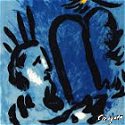
[ The following is related to our Torah reading for this week, Parashat Behar.... ]
05.12.20 (Iyyar 18, 5780) How important are the Jewish roots of our faith? How important is our heritage in relation to our understanding of God's ways? Our Torah portion this week is called "Behar," from the phrase behar Sinai (בְּהַר סִינַי) found its opening verse (Lev. 25:1). But why does the word Sinai appear in a portion of Torah that discusses social and agricultural laws that were to be observed only later, in the promised land? What does the subject of the Sabbatical Year (shemittah) have to do with the revelation given at Sinai?
The sages say that the Sabbatical year was mentioned in connection with Sinai in order to teach that Moses received not only the Ten Commandments and the revelation of the Tabernacle there, but also specific laws regulating future social and economic practices of the people as well. The law of the Sabbatical year is a case in point, since it would have been absurd for a law that required farmers to abandon their farming practices once every seven years to have been proclaimed while the people wandered in the desert...
How important is tradition in our lives? So important that we could not understand even the first word of the Scriptures without it... After all, the Torah does not come with a built-in dictionary, so we must rely on others to teach us the meaning of its words. Indeed the very concept of "Torah" (or Scripture) is bound up with trust and community... This is true of the written word (i.e., trusting in scribal traditions that preserved the Scriptures for us), as well as the oral word (i.e., the customs, interpretations, translations, and wisdom that explain the meaning of the words themselves). Knowledge has been defined as "justified true belief," which implies that there can never be knowledge without trust. It is ludicrous to think that we can translate the Scriptures in a vacuum - all by ourselves without any help from others... We must humble ourselves and become "like little children" to learn from those who have gone before us, and this is why the Jewish value of Talmud Torah - teaching children the words and values of Torah - is regarded as so important. As the Talmud puts it, "The world exists because of the breath of the schoolchildren who study Torah" (Shabbat 119b).
For more on this topic see: "Remembering our Roots: Further thoughts on Behar."
 |
Come just as you are...

05.12.20 (Iyyar 18, 5780) Since God knows the number of hairs on our heads, he also knows those character defects that we do not see in ourselves... Nevertheless we must come to God "just as we are," since what we are is ultimately unknowable by us. This implies that we can't wait to turn to God until we have already confessed our sins, since we often do not know what they are. "Those who are well have no need of a physician, but those who are sick" (Mark 2:17), which means that we come in a state of unknowing blindness to find healing. We don't see so we can turn; we turn so we can see. Confession turns to see God's remedy for our sin, and true teshuvah must begin with hope, with the vision that the LORD is our Helper and the Healer of our souls.
אשׂא עיני אל־ההרים מאין יבא עזרי
עזרי מֵעִם יהוה עשׂה שׁמים וארץ
es·sa · ei·nai · el · he·ha·reem · me·a'·yeen · ya·vo · ez·ree
ez·ree · mei·eem · Adonai · o·seh · sha·ma'·yeem · va·a'·retz

"I lift up my eyes to the hills. From where does my help come?
My help comes from the LORD, the Maker of heaven and earth."
(Psalm 121:1-2)

Download Study Card
Just as King David prayed, שְׁגִיאוֹת מִי־יָבִין מִנִּסְתָּרוֹת נַקֵּנִי, "who can understand his errors; cleanse me from nistarot chata'ot, secret sins" (Psalm 19:12), so we likewise trust that God's remedy for our sin will heal even that which is hidden from our own awareness...
Bread from Heaven...
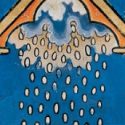
[ The following is related to our Torah reading for this week, Parashat Behar.... ]
05.12.20 (Iyyar 18, 5780) It is remarkable that the commandment of "shemittah" (שמיטה) – that is, the responsibility to let the land lie fallow for an entire year every seven years – was introduced with the statement that God gave this law "behar Sinai" (בּהר סיני) – on the mountain of Sinai (see Lev. 25:1-7). This is remarkable for a variety of reasons, first because the people had no idea of the farming conditions of the promised land as they wandered in the desert, but also because the commandment to leave the land fallow every seventh year was given with the stern warning that the failure to do so would result in judgment and exile from the land (Lev. 26:24-35; Jer. 29:10; 2 Chron. 36:21). In this connection the sages taught that the Torah could only have been given to the generation that partook of the manna – only to those who understood that their survival depended entirely on God's gracious provision (Deut. 8:3). Likewise, every seven years the shemittah would reinforce the lesson of the manna, namely, that man's efforts do not give sustenance, but God alone gives and sustains life. As Yeshua attested: "Man does not live by bread alone, but by every word that comes from the mouth of God" (Matt. 4:4).
The shemittah teaches us to let go of our devices, to forsake our "need" to control, and to therefore to completely trust in God's care for our lives... That is its personal application. Indeed the word "shemittah" (שמיטה) means "release" (i.e., שָׁמַט, to "let drop") which suggests letting go of the past, forgiving, restoring, and allowing ourselves to be carried, sustained, and brought forward by faith. The LORD promises us an "extra portion" of manna to sustain us when we honor his request that we get out of the way, when we let go of our devices and let things be, trusting our heavenly Father to take care of things...
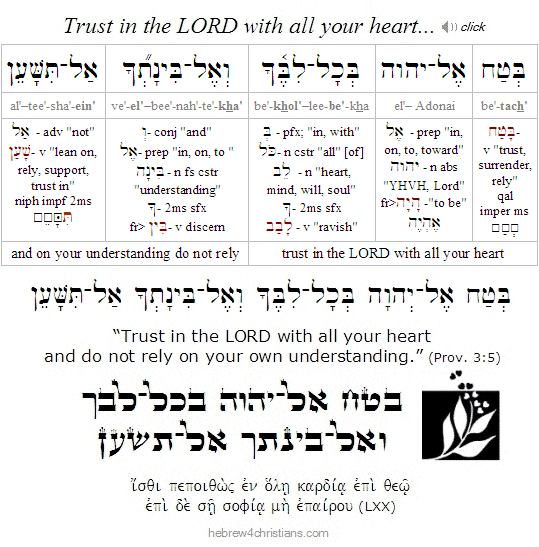 |
 |
Shekhinah of Humility (שכינה של ענוה)
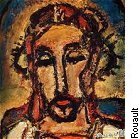
[ The following is related to our Torah reading for this week, parashat Behar... ]
05.11.20 (Iyyar 17, 5780) Why is it, the sages asked, that God bypassed all of the world's great and lofty mountains and chose to give the Torah behar Sinai - on the humble mountain of Sinai? Because God's Spirit rests with the lowly, the humble of heart. Therefore humility (ענוה) is considered one of the greatest of middot ha-lev (heart qualities). "For this is what the high and exalted one says, the one who rules forever, whose Name is Holy: "I dwell in an exalted and holy place, but also with the crushed and lowly of spirit (דַּכָּא וּשְׁפַל־רוּחַ), to revive the spirit of the lowly and to revive the heart of the crushed" (Isa. 57:15).
כּי כֹה אמר רם ונִשׂא
שֹׁכֵן עד וקדושׁ שׁמו
מָרום וקדושׁ אֶשׁכּון
ואת־דַּכָּא וּשְׁפַל־רוּחַ
לְהַחֲיות רוּח שׁפלים
וּלְהַחֲיות לב נִדכּאים
kee · kho · a·mar · rahm · ve·nee·sa
sho·khen · ad · ve·ka·dosh · she·mo
ma·rohm · ve·ka·dosh · esh·kohn
ve·et · dak·ka - oosh·fahl - roo'·ach
le·ha·cha·yoht · roo'·ach · she·fa·leem
oo·le·ha·cha·yoht · lev · need·ka·eem

"For this is what the high and lifted up One says,
the One who abides forever,
whose Name is Holy:
"I dwell in a high and holy place,
but also with the broken and lowly of spirit,
to revive the spirit of the lowly
and to revive the heart of the crushed.

Download Study Card
This pasuk teaches that God reveals Himself to the "lowly in spirit" (i.e., shefal ruach: שְׁפַל־רוּחַ), that is, to those who understand their own nothingness and complete dependence on Him.... Notice that the word translated as "broken" (i.e., dakka: דַּכָּא) refers to being crushed into dust, the very same word used to describe how Yeshua was crushed for our iniquities (Isa. 53:10). William James called this deep work of the spiritual life Zerrissenheit, a term that can be translated as "torn-to-pieces-hood," or a state of being utterly broken and in disarray... From the point of view of our dependence on God for salvation, dakka refers to humility and contrition we express in light of God's unmerited love for our souls... We identify with the death of Messiah offered on our behalf; we find healing and acceptance in the Presence of the One who was torn to pieces and made dust for our merit. Humility is essential for the awareness of God in the truth...
 |
Note: Suffering is ultimately a mystery... Some people experience a deeper sort of breaking, for reasons we cannot fathom, though all people who come to the Lord will experience breaking, an abandonment of self-reliance, and a yearning for deliverance. As Yeshua said of our relationship to the Rock of God's Salvation: "Anyone who falls on this stone will be broken to pieces; anyone on whom it falls will be crushed to the dust" (Matt. 21:44).
Bones of Reality...

[ "For now we see in a mirror dimly, but then face to face. Now I know in part; then I shall know fully, even as I have been fully known" (1 Cor. 13:12)... ]
05.11.20 (Iyyar 17, 5780) From our Torah portion for this week we read: "For you are strangers and sojourners (גרים ותושׁבים) with me" (Lev. 25:23). When we are strangers to this world, we reside with God: we are called residents of heaven. To be a stranger to this world is a great blessing, since it means we identify our home in the heart of God. By extension, reality is measured by proximity to the Eternal, and the material world - when regarded as an end in itself - is nothing but an illusion, since it cannot exist apart from the sustaining power of God (Heb. 1:3; Col. 1:16-17; Rev. 4:11). The sages note that in Hebrew there is no language of categorical ownership, since all things are conditioned by time. We say yesh li (יש לי) - "there is to me" (for this time) rather than "I have" or own. Ownership is related to the "bone" (עצם) of something, its inner structure and essence. God alone is koneh shamayim va'aretz (קנה שׁמים וארץ), the Owner of Reality (Gen. 14:19). "For from him and through him and to him are all things. To him be glory forever. Amen" (Rom. 11:36).
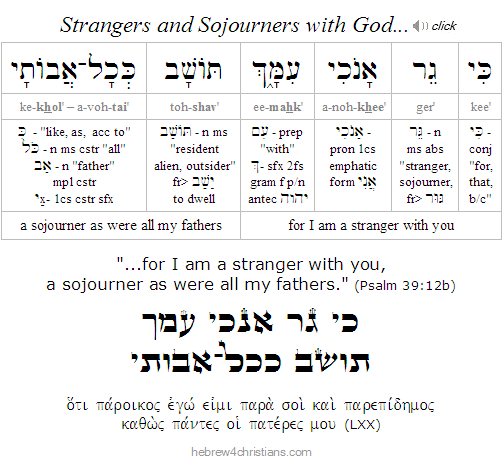 |
Abraham "sojourned" in the land of promise, as in a foreign land, living in tents with his children because he looked for a city whose builder and maker was God (Heb. 11:9-11). Likewise we are strangers and exiles here, on the journey to the reach "the City of Living God, to heavenly Jerusalem, to the assembly of the firstborn who are enrolled in heaven" (Heb. 12:22-23). When we take up the cross and follow Yeshua, we die to this world and its dreams. We die to ourselves in order to find life (Mark 8:35-36). We give up houses, lands, all our possessions, family relationships, and even our own lives in order to find residence with God (Matt. 19:29; Luke 14:26). We reckon ourselves "dead" to this world as our home and "look not to the things that are seen but to the things that are unseen; for the things that are seen are transient, but the things that are unseen are eternal" (2 Cor. 4:18). We walk by faith, not by sight. Faith is the conviction (ἔλεγχος) of things unseen (Heb. 11:1) - and that includes the conviction that God will visibly care for our needs even if we let our gardens go fallow and release our claim on all our debtors...
 |
Parashat Behar-Bechukotai...

[ Happy Mother's Day to all you moms out there! We love and appreciate you! ]
05.10.20 (Iyyar 16, 5780) Shavuah Tov, chaverim. This week we have another "double portion" of Torah. Our first Torah portion is called parashat Behar (פרשׁת בהר) which begins with the commandment that an Israelite farmer must let his land rest by remaining fallow every seventh year. This is called the "Sabbatical year" (i.e., shemittah: שמיטה), and the inhabitants of the land were permitted to glean whatever the farmland produced naturally. In addition, the people were told to count seven cycles of seven years – a total of 49 years – and to mark the arrival of the fiftieth year with blasts of the shofar on the Day of Atonement (Yom Kippur). This fiftieth year would be a time of "Jubilee" (i.e., yovel: יוֹבֵל) – a year of "release" for the land and all its inhabitants. All slaves would be set free, all debts would be canceled, and the stewardship of the land would revert to its original titleholders.
In this connection, you can determine whether a given year is a Sabbatical year (i.e., shemittah) by simply taking the current Jewish year and dividing by seven; if there is no remainder, it is a shemittah year; otherwise it is not. For example 5780 is not a Sabbatical year because divided by 7 leaves a remainder, whereas year 5782 is a Sabbatical year (note that the Jewish year begins on Rosh Hashanah, on Tishri 1, in the fall). The Jubilee year (i.e, yovel: יובל) of course follows the seventh of the seven year cycles (i.e., 7 x 7 + 1), though there are some questions about which iteration (1st, 2nd, ... 7th) is currently active. According to some authorities, the last Jubilee year was on Yom Kippur 5776, that is, Tues. Oct. 11th, 2016, so the next would be 50 years later (i.e., in the year 5826).
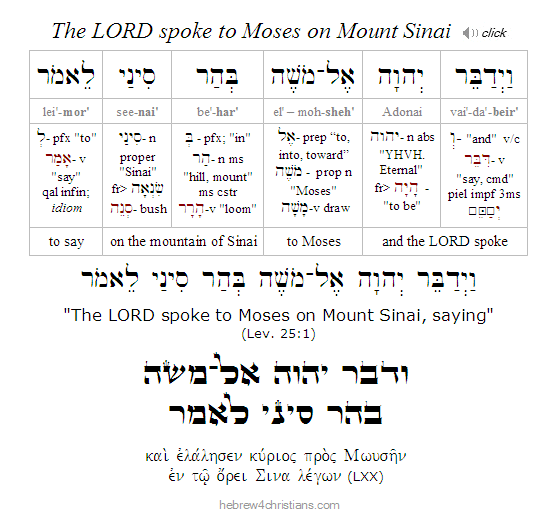 |
Our second Torah reading this week, called parashat Bechukotai (פרשׁת בחקתי), is the final portion of the central book of the Torah (i.e, Leviticus), and it begins with the promise that if the Israelites would walk in the LORD's statutes (chukkot) and commandments (mitzvot) and perform them, then they would enjoy material blessings and dwell securely in the promised land. Moreover the LORD Himself would make His dwelling with them and would walk among them as their God. The people of Israel would then truly be am segulah (עַם סְגֻלָּה) - a treasured people among all the nations of the earth.
On the other hand, if the people disobeyed God and disregarded His commandments, then they would be considered covenant-breakers, and they would experience all manner of distress and tribulation in their lives. They would experience panic attacks, diseases, heartache, and all manner of tsuris (vexation, trouble); their enemies would eat their increase, and those who hate them would rule over them; they would flee at the rustle of a leaf, and their lives would be full of terror and misery – all because they refused to put the LORD God first in their lives. And if after all this trouble the people would still refuse to return to the LORD, the worst punishment of all would befall them: exile from the promised land and banishment from the Presence of the LORD Himself.
Nonetheless, despite their disobedience, God's love and mercy for Israel would never fully depart, for "if they confess their iniquity and the iniquity of their fathers in their treachery that they committed against me, and also in walking contrary to me, so that I walked contrary to them and brought them into the land of their enemies – if then their uncircumcised heart is humbled and they make amends for their iniquity, then I will remember my covenant with Jacob, and I will remember my covenant with Isaac and my covenant with Abraham, and I will remember the land" (Lev. 26:40-42). Moreover, even while they are in exile, in the land of their enemies, God vowed: "I will not cast them away; nor will I ever abhor them to destroy them and to break My covenant with them; for I am the LORD their God" (Lev. 26:44).
This portion (and the scroll of Leviticus) ends with a discussion of various laws pertaining to vows and tithes that a person may make to contribute towards the upkeep of the Sanctuary. These include dedications of persons, animals, houses, and lands. The scroll of Leviticus ends with the emphatic statement: "These are the commandments that the LORD commanded Moses for the people of Israel on Mount Sinai" (Lev. 26:46).
Countdown to Pentecost...

05.10.20 (Iyyar 16, 5780) After sundown Monday, May 11th, marks the 33rd day of the omer count, called Lag B'Omer (ל״ג בעומר), which later became a "Kabbalistic" (i.e., mystical) holiday that commemorated the teaching of Rabbi Shimon bar Yochai (i.e, Rashbi: רשב"י), the purported author of the Zohar, a fundamental text of Kabbalah (Jewish mysticism). According to tradition, on the day of his death, Rabbi Shimon revealed the deepest secrets of the Kabbalah to his followers and insisted that they would thereafter celebrate the anniversary of his death (Yahrzeit) with joy. His followers then associated his death on Iyyar 18 with the anniversary of the revelation of Kabbalah (Torat Ha-Nistar) to Israel. Among Kabbalists, Lag B'Omer celebrates the giving of the "mystical Torah" to Israel just as the holiday of Shavuot celebrates the giving of the written Torah. Today special Lag B'Omer "bonfire" celebrations are held in the village of Meron (near Safed, Israel) where the Rashbi is buried to mystically recall the "sparks that fly upward," back to God...
According to later Jewish tradition, all of Akiva's students died during the time of the Omer Count, but Akiva "started over" with a new batch of just five students. Of these, his most famous student was Shimon bar Yochai. The Talmud (Yevamot 62b) recalls the tragedy of Bar Kochba and commemorates it as a "Scholar's Festival," in honor of Rabbi Akiva.
Note: It should be evident that Lag B'Omer is not a Christian/Messianic Jewish holiday, but on the contrary celebrates occultic speculations that further separate many Jewish people from the liberating truth of Yeshua the Messiah. During this time of "countdown," chaverim, let us pray that the eyes of many Jewish people will soon be opened to see that Yeshua is indeed the Messiah and Savior of Israel.
 |
 |
The Day Draws Near..
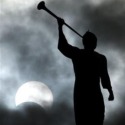
05.09.20 (Iyyar 15, 5780) Shalom chaverim... We are living through prophetically weighty times, and I believe the hour is drawing near for the return of Yeshua according to his promise. The release of the Covid-19 virus has imploded the world's economies and constricted personal freedoms for billions of people on the earth today. The search for a "cure" is connected with a larger, global vision to implement a worldwide vaccination program with nanotechnology that will biometrically track people and that could be used to control political expression and "freedoms." These are unprecedented times, and people around the world are desperately seeking remedy for the impending social unrest and inevitable economic chaos. The stage is being set for the rise of the "man of sin," otherwise known as the Messiah of Evil (anti-Christ), to appear as the feigned "savior" of the world...
Meanwhile we must press on, trusting that the LORD will equip and empower us for "such a time as this" (זמן כזה). To his faithful, the Lord gives more grace in hours of testing. We must be brave, strongly equipped for battle, and full of conviction that the message of the gospel is the only hope for this moribund and decadent world. We must be on guard lest we fear, for fear is the greatest tool of the enemy of our souls, and therefore we must resist him steadfast and full of divine assurance. "The Lord is faithful: He will establish you and guard you against the evil one" (2 Thess. 3:3). The Spirit says, "Fear not, for I am with you always." "He will sustain you to the end, guiltless in the Day of our Yeshua the Messiah" (1 Cor. 1:8). He who calls you is forever faithful; He will surely do it (1 Thess. 5:24).
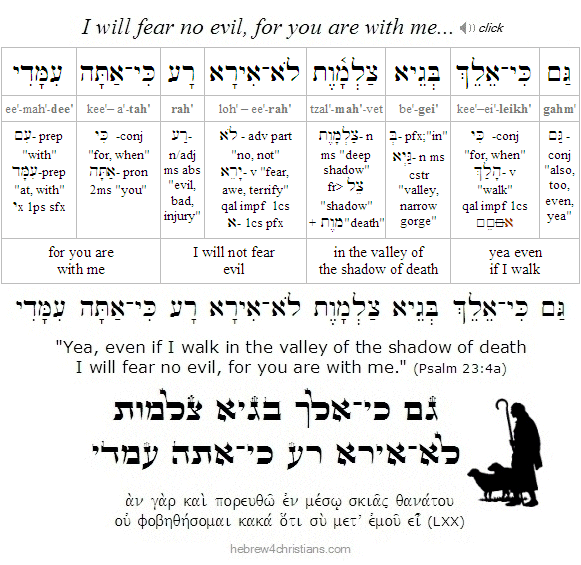 |
"The night has advanced toward dawn; the day draws near. So then we must lay aside the works of darkness, and put on the weapons of light" (Rom. 13:2). "Let's get rid of every weight and the sin that clings so closely, and run with endurance the race set out for us, keeping our eyes focused on Yeshua, the pioneer and perfecter of our faith" (Heb. 12:1-2). Friends, it is no time to give up now! The finish line is just up ahead!
Trusting and Seeing...
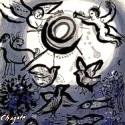
05.08.20 (Iyyar 14, 5780) How we see is a spiritual decision... As it says in the Torah: "See the land, what it is ... whether it be good or bad ... and strengthen yourselves" (Num. 13:18-20). Here note that rightly seeing – even the negative aspects of the land such as the presence of "giants" – can only be achieved by the courage derived from faith. When you see things that appear bad, you are to "strengthen yourselves," a Hebrew verb (i.e., וְהִתְחַזַּקְתֶּם) that means to intently decide to see the good despite the present veil of appearances. When we encounter things that are bad, we must refuse to be overwhelmed by carnal reasoning and fear by looking beyond the moment to behold a promised good (2 Cor. 4:18). Whether things are good or bad, trust that God is with you, in your midst....
Finding Real Treasure...

05.08.20 (Iyyar 14, 5780) "The kingdom of heaven is like treasure hidden in a field, which a man found and covered up. Then in his joy he goes and sells all that he has and buys that field. Again, the kingdom of heaven is like a merchant in search of fine pearls, who, on finding one pearl of great value, went and sold all that he had and bought it" (Matt. 13:44-46). Here Yeshua teaches us that a relationship with God is the true source of joy and value in life, and that all other passions and desires are like "fools gold" when compared with its overwhelming worth... In this connection Soren Kierkegaard wrote: "If anyone thinks he is a Christian and yet is indifferent toward being that, then he really is not one at all. Indeed, what would we think of a person who gave assurances that he was in love and also that it was a matter of indifference to him?" (Works of Love). The Shema, the "first and greatest commandment," is to love God "bekhol levavkha" (בְּכָל־לְבָבְךָ) with all our hearts, and yet how is that love possible apart from the revelation of the passion of love itself? "We love because God first loves us" (1 John 4:19), and therefore teshuvah ("repentance") is a matter of being in love, celebrating God's heart for us, awakening to its wonder, and being thrilled and overjoyed at its reality. Isn't this the essence of the matter?
"Shimon ben Yonah, atah ohev oti?" – "Simon son of Jonah, do you love me?" (John 21:17). But how can we love the Lord apart from trusting his heart for us? "Come unto Me," Yeshua says, "live in Me and I will live in you." O Lord God our Savior, deliver us from apathy and indifference! Soften our hearts and awaken us to our great desire and need for you! Hashivenu, Adonai: turn us, O LORD, and we shall be turned; heal us, and we shall be healed... Help us to come to you and to know the breadth and length and height and depth of your great love for us.
So for what do you hope, friend? What are your dreams? Your deepest desires? Where is your treasure? Yeshua cautioned those who sought their happiness in this world: "Do not store up for yourselves treasures upon earth... be rich toward God" (Matt. 6:19-20; Luke 12:21). When we treasure God, our focus is directed toward the eternal reality, and our interest in this world is minimal. We trust God to meet our daily needs and surrender our future to His care. The only worry we face concerns our own deficiencies in our obligations to the Savior. Our duty is to love God in the truth - bekhol levavkha - with all our heart, having no thought of ourselves. Indeed, self-denial means to quit thinking about yourself (from α-, "not," + ῥέω, "to speak") by accepting what God has done for you. "It is not my business to think about myself. My business is to think about God. It is for God to think about me" (Simone Weil). Shabbat shalom, chaverim....
מִי־לִי בַשָּׁמָיִם
וְעִמְּךָ לא־חָפַצְתִּי בָאָרֶץ
mee'·lee · va·sha·ma'·yeem
ve·ee·me·kha · lo-cha·fatz'·eei · va·a'·retz

"Whom have I in heaven but you?
And there is nothing on earth that I desire besides you."
(Psalm 73:25)

Download Study Card
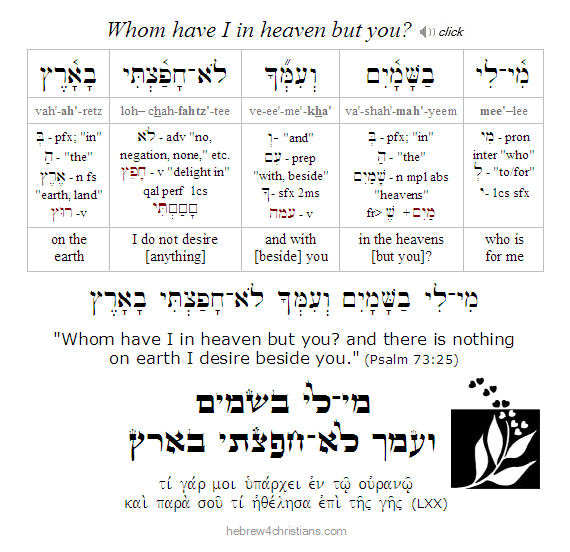
Reciprocity of the Heart...
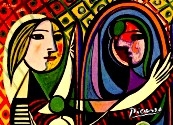
05.07.20 (Iyyar 13, 5780) If you were ask to God for just one thing, what would it be? Our deepest yearnings are like prayers. Whatever the heart genuinely seeks, it will find. The person who pursues righteousness will find it, just as evil comes to the person who searches for it (Prov. 11:27). Therefore the voice of wisdom cries out, "I love those who love me, and those who seek me diligently find me" (Prov. 8:17), and the prophet shouts, "Seek the LORD while he may be found, call upon him while he is near" (Isa. 55:6). God is near to us in Yeshua, who said, "Ask, and it will be given to you; seek, and you will find; knock, and it will be opened to you. For everyone who asks receives, and the one who seeks finds, and to the one who knocks it will be opened." As you believe, so you will receive (Matt. 21:22).
This is the "like for like" principle of faith. Forgive us as we forgive; judge us as we judge; love us as we love; make us righteous as we take hold of righteousness, give us courage as we believe, and so on. As Isaiah said to fearful king Ahaz: "If you will not be firm in faith, you will not be firm at all" (Isa. 7:9). Your "amen" echoes the "amen" of heaven: "Let it be done for you according to your faith" (Matt. 9:29).
It is written in our Scriptures: "Whoever pursues righteousness and kindness will find life, righteousness, and honor" (Prov. 21:21). The subject of this verse is a participle that comes from the verb radaf (רָדַף), which means to follow after, or to pursue, as in a chase or a hunt. This same verb is used when King David exclaimed, "surely goodness and love will pursue me (יִרְדְּפוּנִי) all the days of my life" (Psalm 23:6). King David understood that as he pursued God, so God's love would pursue him! In other words, as we seek, so we are sought by God; as we draw near to God, so He will draw near to us (James 4:8).
Notice the repeated use of the word "righteousness" (i.e., tzedakah: צְדָקָה) in this verse. When we pursue God's righteousness, we will find it, and we will be declared righteous (i.e., tzaddik: צַדִּיק) and given life (i.e., chayim: חַיִּים) and honor (i.e., kavod: כָּבוֹד). "In the path of righteousness is life, and in its pathway there is no death" (Prov. 12:28). Therefore Yeshua calls us to "seek first the kingdom of God and His righteousness, and all these things will be added to you" (Matt 6:33).
The prophet expresses hope: "Let us know; let us press on to know the LORD; his going out is sure as the dawn; he will come to us as the showers, as the spring rains that water the earth" (Hos. 6:3). Salvation is "of the LORD." May God help us pursue him b'khol levavkha - with all our heart - because the He has promised, "You will seek me and find me, when you seek me with all your heart" (Jer. 29:13).
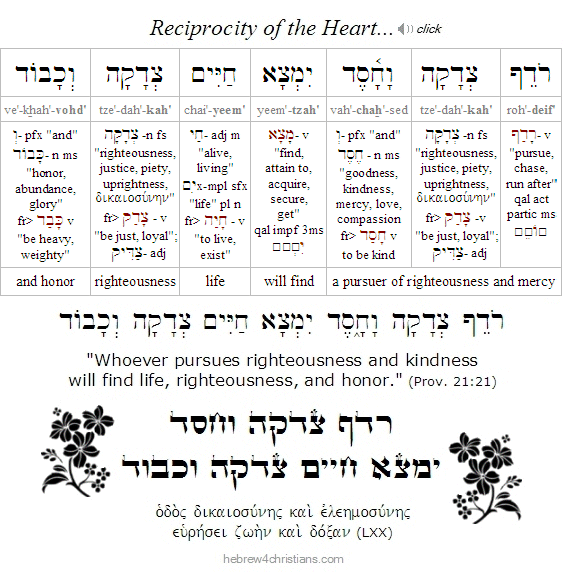 |
 |
The Torah of Love...

05.07.20 (Iyyar 13, 5780) "Whoever has my commandments and keeps them, such is the one who loves me. And the one who loves me will be loved by my Father, and I will love him and will manifest myself to him" (John 14:21). Note that the Greek word translated "manifest" means to "shine inside" (i.e., ἐμφανίζω, from ἐν, "in" and φαίνω, "shine"), indicating that the revelation would be inward light of the Presence of Messiah himself (Χριστὸς ἐν ὑμῖν, ἡ ἐλπὶς τῆς δόξης, Col. 1:27). As we receive God's love, as we embrace it as our own, the love of Messiah will become inwardly visible to you. This comes from a place of surrender and acceptance. As Paul Tillich said, "Sometimes in a moment of weakness light breaks into darkness, and it is as though a voice says, 'You are accepted; you are accepted... Do not seek for anything; do not perform anything; do not intend anything. Simply accept the fact that you are accepted.' If that happens to you, then you experience grace, and everything will be transformed." Dear Lord, Light of Salvation, shine your light upon us!
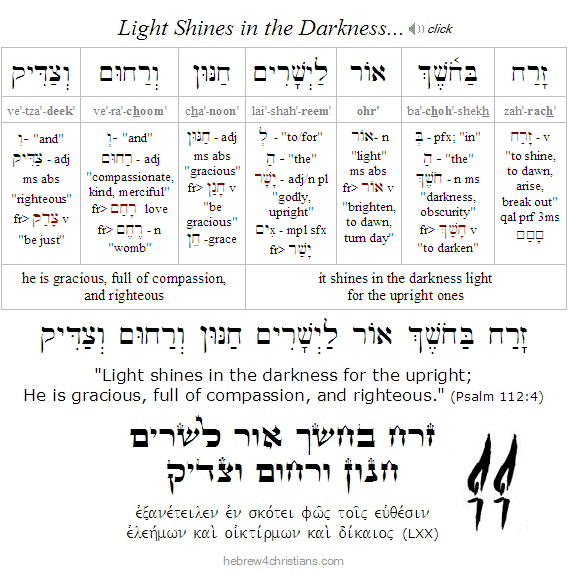 |
 |
Words of Listening...

05.07.20 (Iyyar 13, 5780) In heaven there is only the language of truth, and truth is the language of heaven. "If we ask according to his will, he hears us..." (1 John 5:14). This means that words find their traction only in honesty of the heart, in the midst of our deepest need. Only in "fear and trembling" can we talk with God, though when we pray fervently, our words may trail off until we become silent.... But it is there, in the silence of the soul, that we may learn to listen to the Spirit and hear God's voice. When we seek first the kingdom of God, we will lay aside everything else, quiet our hearts, and focus our will. Seeking God in this way is an end in itself, for whatever else we may seek must be subordinated to this greater seeking. "You will seek me and find me, when you seek me with all your heart" (Jer. 29:13).
 |
Soren Kierkegaard wrote, "No person is saved except by grace; but there is one sin that makes grace impossible, and that is dishonesty; and there is one thing God must forever and unconditionally require, and that is honesty." Confession means "saying the same thing" about ourselves that God says - and that means not only acknowledging our sins, but also affirming that we are loved by God. πάντα ἐλπίζει - Love "hopes all things" (1 Cor. 13:7), and therefore the language of truth is always heard in hope....
Ground of our Spiritual Life...

05.06.20 (Iyyar 12, 5780) Simply knowing about God is insufficient for a transformed life; something more is needed, namely, receptivity of the heart - a sense of concern, a hunger and a thirst for life, and the willingness to believe in the truth of love. Yeshua taught that the condition of our heart is revealed by how we hear. Without charity and a deep sense of concern, loss will inevitably occur: "Take heed therefore how you hear: for whoever has will be given more, but whoever does not have, even what he thinks he has will be taken from him" (Luke 8:18). Like the "good eye" (העין הטובה) that searches for what is good, so the "good ear" listens to the word of hope; yet like the evil eye (העין הרעה) searches for what is evil, so the "evil ear" attends to the message of loss and despair. As we inwardly receive the truth of Yeshua, more truth is revealed; but if we resist, untruth will take root and grow....
Yeshua often employed parables (משׁלים), or analogical stories, in his teaching because they simultaneously conceal and reveal spiritual truth. A parable obscures the truth to those who don't really want it, so that "seeing they may not see, and hearing they might not understand" (Luke 8:9-10; Isa. 6:9-10), and yet it reveals truth to the humble of heart. Since Yeshua's whole life was a parable of sorts - a "disguise" that led to the victory of our deliverance (Phil. 2:7) - it is not surprising that he regularly used "figures of speech" to provoke people to examine their own heart condition and the quality of their faith... In this connection note that Yeshua never explained the "mysteries of the kingdom of God" directly to the crowds, nor did He ever pander to the crowd's clamor or interests. God's word is freely "sown" to all, but it is received only by those who are willing to hear. The message is always directed to the individual willing to follow Him -- to the one who has "ears to hear."
Listening to Yeshua's parables help us take inventory of our lives. For example, the famous "Parable of the Sower" (Luke 8:4-8) teaches us that God is like a farmer who sows seed upon the "soil" of the human heart, the quality of which may be hard, shallow, choked, or good.
A "hard heart" (לב קשה) is likened to impenetrable soil that repels the "seed" of the promise of God (ὁ λόγος τοῦ θεοῦ, Luke 8:11). Because of bitterness, a person can become indifferent and numb inside, and this heart condition enables the devil to snatch the seed of hope from the heart like a ravenous bird (Luke 8:12).
A "shallow heart" (לב רדוד) is likened to topsoil that overlays bedrock. At first the soil receives the seed and quickly begins to grow, but since there is no depth of soil, the growth fails to take root and the growth withers for lack of nutrients and moisture. When tested, the shallow heart reveals its lack of commitment and does not persevere (Luke 8:13).
A "choked heart" (נחנק לב) is likened to weedy soil that hides other roots that exhibit "thorns," namely worldly fears, the desire for riches, and the pursuit of comfort or pleasures. Such people are double-minded and their spiritual life becomes obstructed, throttled by busyness, distracted by desires for comfort, security, and worldly vanities. They are full of inner conflict and despair and consequently become stunted in their growth (Luke 8:14).
Finally, a "good heart" (לב טוב) is likened to tilled and receptive soil that receives the seed to yield an abundant harvest: "yielding thirty, sixty, or a hundredfold." Because the righteous honor the seed and nurture its presence, the hidden power of the Life is powerfully released (Luke 8:15). They are also likened to a tree planted by rivers of living water that bring forth fruit in their season (Psalm 1:3). In this connection it is helpful to remember that fruit does not immediately crop up but requires time and its own season... The process of spiritual growth is ultimately mysterious and divine: "The kingdom of God is like someone who spreads seed on the ground. He goes to sleep and gets up, night and day, and the seed sprouts and grows, though he does not know how. By itself (αὐτομάτη, "automatically") the soil produces a crop, first the stalk, then the head, then the full grain in the head. And when the grain is ripe, he comes in with his sickle because the harvest has come" (Mark 4:26-29). With God all things are possible, and the life of God is a miracle that comes from God's own source of Life. It is the fruit of the Spirit, after all, and not the result of human effort or moral reformation...
So the "parable of the sower" teaches us that how we hear will determine the quality of the ground of our spiritual life. If we are honest with ourselves, we will see our own hardness, shallowness, and selfishness in contrast to the fruitfulness marked by the good heart, and this should provoke us to seek God for help... Again, only a new heart (לב חדש) created by power of God's Spirit can possibly yield the fruit of the Spirit (פרי הרוח). "Take care then how you hear, for to the one who has, more will be given, and from the one who has not, even what he thinks that he has will be taken away" (Luke 8:18).
Believers are likened to earthen vessels that hold the treasure of God's truth, and therefore they are in constant need of God's grace to persevere. Therefore Yeshua told his disciples: "I am the true vine, and my Father is the gardener. Every branch in me that does not bear fruit he takes away, and every branch that does bear fruit he prunes, that it may bear more fruit" (John 15:1-2). Note that it is the healthy branch that will be cut back - not the withered one that will be altogether removed – and this purging process may be painful at times. The heavenly Gardener's goal is for the fruitful branch to reveal more and more the connection to the heart of the Vine, so that God is glorified (see John 15:8). The end here is the beatific vision: "Blessed are the pure in heart, for they shall see God" (Matt. 5:8). The goal of "purging" is fruitfulness and blessing, but the agency is not the will of man but the power of God. You are made "clean" through the word of God spoken within your own heart (John 15:3). This is the acceptance of the Messiah's life within you. Your sanctification, however, depends on your communion with God, staying connected to what is real, central, vital, the core truth of God's Presence and love, the ultimate Reality of Life itself.
In light of these things I hope we might better appreciate and understand Yeshua's admonition: "Abide in me, and I in you. As the branch cannot bear fruit by itself, unless it abides in the Vine, neither can you, unless you abide in me. I am the vine; you are the branches. The one who remains in me – and I in him – bears much fruit, because apart from me you can accomplish nothing" (John 15:3-5). Our connection to Yeshua is intended to bear fruit that glorifies God, but if we refuse to find life in him, we would wither and die (John 15:6). We find sustenance and healing only as we remain connected to the Source and Conduit of life, who is the Messiah, the Savior and LORD. True life grows out a heart connection with Him, and without that connection our lives become vain and yield no eternal significance. Nevertheless we must remain encouraged, friend, since God calls us to Himself. This is "the work of faith." Look to heavenly reality and not to the vanity and deceits of this world (Col. 3:1-4). Find life in connection with Yeshua, drawing strength and vitality from your relationship with Him. The fruit of the Spirit is produced as we open our hearts and yield ourselves to the love and presence of the Lord. May you grow in grace and be fruitful in God's love. Amen.
 |
Mercy's Like-for-Like...

[ The following is related to our Torah reading for this week, Parashat Emor.... ]
05.06.20 (Iyyar 12, 5780) In our Torah portion this week we read, "whatever injury he has given a person shall be given to him" (Lev. 24:20). Some of the sages comment that this is not so much about "eye for eye, tooth for tooth" retributive justice as it is about reciprocity of the will. As you see others, so you will see yourself; as you cause a defect in another, so it will be given to you. Therefore the Baal Shem Tov observed, "Other people are like mirrors: the faults we see in others our own." Indeed Yeshua taught us: "condemn not and you will not be condemned; release, and you will be released" (Luke 6:37). As we forgive others, so we find our own forgiveness. "Love covers all offenses (Prov. 10:12).
Loving the Stranger (אהבת הגר)...

[ The following is related to our Torah reading for this week, Parashat Emor.... ]
05.06.20 (Iyyar 12, 5780) Did you know that one of the most frequently occurring commandments of Torah is to love the stranger? The commandment is repeated in various forms over 30 times in the Jewish Scriptures, for instance "You shall love your neighbor as yourself: I am the LORD" (Lev. 19:18); "You shall treat the stranger who sojourns with you as the native among you, and you shall love him as yourself, for you were strangers in the land of Egypt: I am the LORD your God" (Lev. 19:34); "Love the stranger, therefore, for you were sojourners in the land of Egypt" (Deut. 10:19); "You shall not wrong a sojourner or oppress him, for you were sojourners in the land of Egypt" (Exod. 22:21); "When a stranger sojourns with you in your land, you shall not do him wrong" (Lev. 19:33); "Do not oppress the stranger" (Zech. 7:10); "Cursed be anyone who perverts the justice due the stranger" (Deut. 24:19); "The stranger shall be as the native born children of Israel among you" (Ezek. 47:22), "There shall be one law for the native and for the stranger who sojourns among you"(Exod. 12:49; Num. 15:16), and so on. Clearly the LORD does not want people to feel ostracized, excluded, or otherwise left out of His providential and loving plans... Indeed, the message of the universal love of God is at the heart of the gospel itself, harkening back to God's earliest promises to redeem humanity and restore paradise lost. "Religion," tribalism, prejudice, ethnic pride, and so on, are anathema to the Kingdom of God.
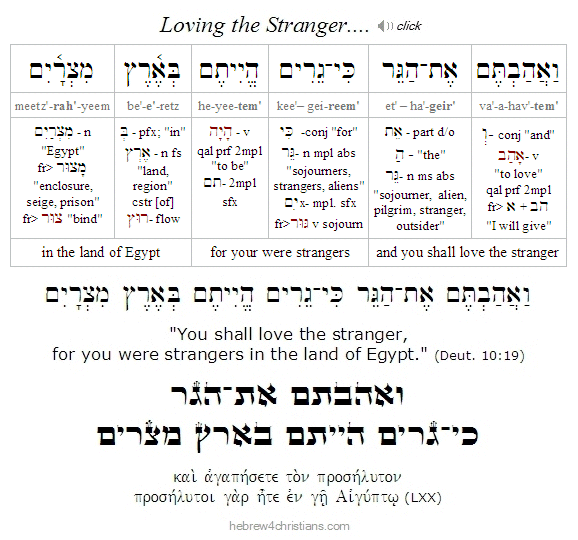 |
Jewish tradition says that King David was born on Shavuot ("Pentecost"), the holiday of shtei ha-lechem, the "two loaves" that prophetically foretold of the advent of the "one new man" (Eph. 2:14-22) and of the mysterious inclusion of the Gentiles into the covenant promises of God (Eph. 3:6). God has a great compassion for the outsider, for the lost, for the orphan and those who are without inheritance in this world. During Shavuot it is customary to read the Book of Ruth which tells the story about redeeming love and the advent of King David. Recall that King David was a direct descendant of Ruth, who as a Moabitess was an outsider and "stranger" to the promises of God (Ruth 4:17). Despite being part of an despised and rejected group of people (see Deut. 23:3), Ruth overcame the law's demand by believing in the love and acceptance of a redeemer of Israel (Ruth 3:9). Ruth's great grandson was named David (דָוִד), meaning "beloved," which has the same numerical value as the word "hand" (יָד). It is no wonder that the LORD chose David to represent God's extended hand of love for the stranger, for the convert, for the outsider, the leper, and the lost, since his descendant Yeshua the Messiah came to love and redeem the entire world by means of His outstretched hand. ברוך הוא יהוה ישוע
"I was a stranger and you welcomed me" (Matt. 25:35). We are commanded (i.e., blessed) to practice ahavat ha'geir (אהבת הגר), the "love of the stranger." This means showing compassion and empathy to an "outsider" who may question their worth and place in your midst... On a somewhat deeper level, the duty to "love the stranger" applies not only to someone whom we regard as an "outsider," but more radically to the "stranger within ourselves," that is, to those aspects of ourselves we censor, deny, or reject. Like the prodigal son, we have to "come to ourselves" to return home (Luke 15:17), yet we can't know that we are unconditionally loved until we venture complete disclosure and seek acceptance. That is the great risk of trusting in God's love for your soul. Those parts of ourselves that we "hide" need to be brought to the light, healed, and reconciled. After all, if we don't find healing for our self-rejection and pain, how can we hope to love and accept others? Dear Lord, deliver us from the torment of self-hatred, in the Name and passion of your love, amen..
 |
A Blessed Recompense...
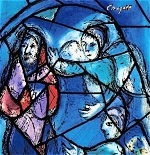
05.06.20 (Iyyar 12, 5780) Our Torah for this week (i.e., parashat Emor) contains more mitzvot (i.e., commandments, blessings) regarding holiness than any other Torah portion (the sages cite no less than 63 distinct commandments). In addition, the portion provides a list of the eight main holidays, or "appointed times" (i.e., mo'edim: מוֹעֲדִים), found in the Jewish Scriptures. These "festivals of life" are sometimes called mikra'ei kodesh (מִקְרָאֵי קדֶשׁ), "times in which holiness is proclaimed" (Lev. 23:2). Note that this is the first time that the Torah reveals a comprehensive description of the festivals of the year, which include the following:
- The Sabbath (יום השבת) - The weekly observance of Shabbat that commemorates God as the Creator of the world. According to the sages, Shabbat is the most important of the appointed times, even more important than Yom Kippur and the Ten Days of Awe. There are 54 weekly Sabbaths in a "leap year" and 50 for regular years... In addition to the Sabbath are monthly Sabbaths (שבתות חודשיות) called Rosh Chodeshim.
- Pesach (חג פסח), also called Passover. This reveals the redemption from death that comes from the sacrificial blood of the Lamb of God...
- Unleavened Bread (חג המצות) - This denotes the sanctification of the people of God, the "crossing over" into the realm of Promise. Note that the Counting of the Omer (ספירת העומר) is also first mentioned in this section of Torah (Lev. 23:9-16).
- Firstfruits (ום בכורים), also called Yom HaBikkurim or Reishit Katzir. This marked the first wave offering (תנופת העומר) of the new harvest which symbolized the time of the resurrection of Messiah and the victory of Life over the powers of hell and death.
- Shavuot (חג השבועות), also called "Weeks" or "Pentecost." This marks the climax of the Passover Season, the giving of Torah at Sinai and the giving of the Ruach (Spirit) at Zion. It is the advent of the New Covenant for all nations, tribes, and tongues...
- Yom Teru'ah (יום תרועה), also called "Rosh Hashanah" (note that this is the first time this is revealed in Torah). This marks the start of the final "week of years" of the End of Days and time of worldwide judgment... the "Great Tribulation."
- Yom Kippur (יום כיפור) also called the Day of Atonement. This denotes the national cleansing and restoration of the Jewish people at the end of the Tribulation Period.
- Sukkot (חג סוכות) also called "Tabernacles" (note that this is the first time the commandments to dwell in a Sukkah and to wave the arba minim (four species) are mentioned in the Torah). This denotes the Millennial Kingdom and Sukkah of God established as Zion. (The two winter holidays of Chanukah and Purim are alluded to in this portion as well: see the parashah summary for more information.)
Notice that there is a restatement of the commandment to leave food for the poor and the stranger (pe'ah, leket, shikhah) that appears right in the midst of the list of the Biblical holidays (see Lev. 23:22), which the sages said was intended to remind us to help those in need, especially during these times. Hence the giving of tzedakah is a regular part of the Jewish holidays (e.g., giving ma'ot chittim [מַעוֹת חִטִּים] "money for wheat" during Passover, matanot la'evyonim [מַתָּנוֹת לָאֶבְיוֹנִים] for Purim, and so on). The sages ask, "Why did the Torah place the mitzvah of helping the poor while speaking about the holidays and their particular sacrifices? To teach us the greatness of charity: 'God credits whoever gives charity to the poor as if they built the Holy Temple and presented offerings therein to God.' Indeed, Yeshua taught us that giving a gift to the poor is giving a gift to God Himself (Matt. 25:40).
מלוה יהוה חונן דל
וגמלו ישׁלם־לו
mal·veih · Adonai · kho·nein · dahl
oo·ge·moo·loh · ye·sha·lem-loh

"Whoever is generous to the poor lends to the LORD,
and He will repay him for his kindness."
(Prov. 19:17)

Hebrew Study Card
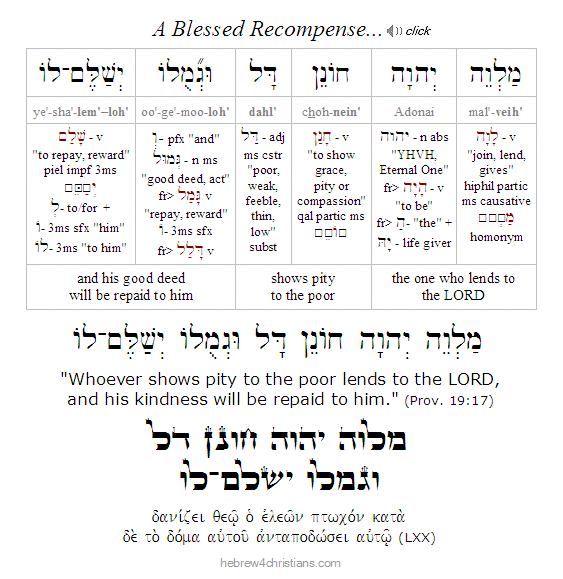
Since there are at least 50 weekly Sabbaths in a Jewish year in addition to the seven prescribed holidays (not to mention Rosh Chodesh and the other holidays such as Purim, Chanukah, Israel Independence Day, etc.), it is no wonder that the Scriptures declare: "A person with a cheerful heart has a continual celebration" (Prov. 15:15). The moedim are times to cheerfully give thanks to the LORD for all He has done.... Amen.
Repentance and Faith...

05.05.20 (Iyyar 11, 5780) Some people are scandalized by what they call "easy believism," or the idea that we only need to believe in Yeshua to be saved. Sometimes they call this teaching "cheap grace" or "sloppy agape," though in fairness it must be stressed that there is nothing easy about truly believing. What is easy, however, is professing that you believe without undergoing a miraculous heart transformation. Anyone can say, "I believe in Yeshua," but the test is whether he lives within you. Is he the source of your life? Do you draw life from Him? Anyone can claim they are saved, but it is a miracle greater than splitting the sea to undergo divine metamorphosis, to be given a heart that loves unconditionally, that dies to pride, and that lives as the servant of all. Yeshua asks, "Do you really believe? Many will say to me in that day, 'Lord, Lord...' but I will say to them, 'I never knew you...' (Matt. 7:22-23). It's not just hard to believe (obey), it's impossible apart from God's radical intervention. It is the Spirit that gives life; the flesh is no help at all (John 6:33).
Living by faith does not mean we profess Christianity or "talk theology" like some college professor. It's one thing to believe that, and another to believe in... Human reason can rightly infer that a morally good, all-powerful Creator exists, for example (Rom. 1:20), but it is unable to know God's love that way... Love requires trust, "taking to the heart." We are to "know this day and turn to your heart (והֲשֵׁבתָ אֶל־לְבָבֶךָ) that the LORD is God in heaven above and on the earth beneath; there is no other" (Deut. 4:39). We need to know truth (cognitive) and to be moved by the heart (emotional); we need both Spirit and Truth (John 4:24). "For all things come from You (כִּי־מִמְּךָ הַכּל), and from your hand we give to you" (1 Chron. 29:14). Teshuvah centers on Yeshua our Savior: turn to believe in Him!
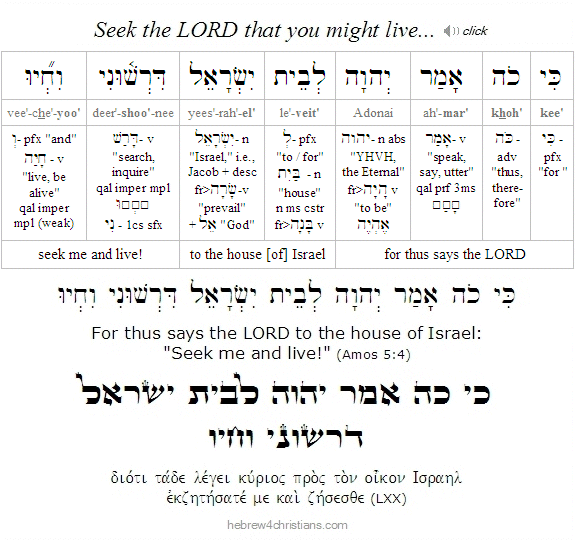 |
 |
Broken to be Remade...

05.05.20 (Iyyar 11, 5780) "See to it that no one fails to obtain the grace of God; that no root of bitterness springs up and causes trouble, and by it many become defiled; that no one is immoral or profane like Esau, who sold his birthright for a single meal. For you know that afterward, when he desired to inherit the blessing, he was rejected, for he found no chance to repent, though he sought it (the blessing) with tears" (Heb. 12:15-17; Gen. 27:38). "For my people have committed two evils: they have forsaken Me, the fountain of living waters (מְקוֹר מַיִם חַיִּים), and hewed out cisterns for themselves, broken cisterns that can hold no water" (Jer. 2:13). Spiritually speaking, there are two basic sorts of breaking. One is to be broken by the inevitable sin and ruin of this world, and the other is to be made lev-nishbar (לֵב־נִשְׁבָּר), a broken heart, before the LORD. The former breaking comes from the vain attempt to find life in the broken vessels of this world, and "repentance" is expressed as remorse over perceived temporal loss. This sorrow eventually leads the soul to death (2 Cor. 7:10). To be inwardly broken, on the other hand, requires mourning over your life and returning to God for deliverance (Matt. 5:4). In hunger and thirst for God's righteousness the soul finds eternal satisfaction, since God alone provides the vessel of "living water" we need to live (John 4:14; 7:38). We all must drink from God's fountain of life (מְקוֹר חַיִּים), lest we suffer spiritual dehydration and death....
 |
Are you haunted by an inner ache for love, joy, peace, and life? "Blessed are those who hunger and thirst for righteousness, for they shall be satisfied" (Matt. 5:6). Our inner poverty and need is a disguised grace; our desire for healing reveals the Spirit's invitation. Faith begins with the recognition of our need, since only then will we come to Yeshua for the "Bread of Life" (לֶחֶם הַחַיִּים) and the "Living Water" (מַיִם חַיִּים). Everything we need is found in him, though we must reach out in faith: "For without faith (אֱמוּנָה) it is impossible to please him, for whoever would draw near to God must believe that he exists, and that he rewards those who seek him" (Heb. 11:6). God rewards those who seek him; he answers the heart's cry; he responds to all who trust in his love and salvation. Therefore "ask, and it will be given to you; seek, and you will find; knock, and it will be opened to you. For everyone who asks receives, and the one who seeks finds, and to the one who knocks it will be opened" (Matt. 7:7-8). We are not saved by faith in our own faith, but in the Reality and Power of the LORD God who alone can raise the dead to new life....
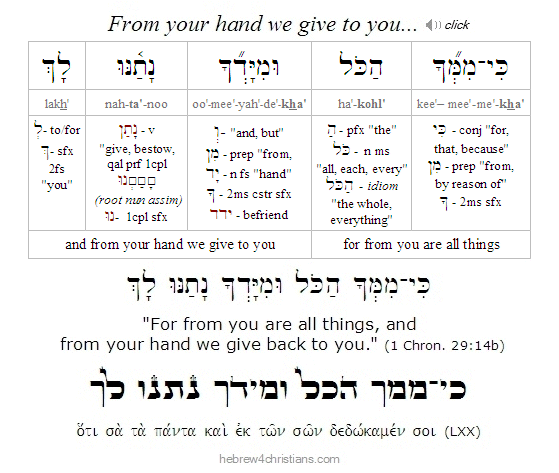 |
 |
Lord, teach us to pray...

05.05.20 (Iyyar 11, 5780) Yeshua told his followers, "You did not choose me, but I chose you and appointed you to go forth and bear fruit..." (John 15:16). Religious pride recoils at these words, thinking, "I don't want to be chosen by God; I want to be in control; I want to choose God first." The ego seeks some reason for revelation, some merit that commends the self to God. It's hidden assumption is, "thank you, God, that I am not like other men" (Luke 18:11). The choice of God is scandalous because it is based on God's love, not our own (1 John 4:19). We were spiritually reborn, not as the result of anything in the realm of nature, nor even through our personal decision, but solely on account of God's sovereign prerogative (John 1:13). The carnal ego is quick to suggest, however, that God "needs you" to do his will, or that you have something unique to offer heaven by your service, though it is idolatrous to elevate the self this way. "Not by might nor by power, but by my Spirit, says the LORD of Hosts" (Zech. 4:6). We don't seek to please God so that we can be chosen; we are chosen so that we can please him... God's grace and love for us is always the starting point: "Lord, teach us to pray," that is, choose the words for us, the groaning of your Spirit, in accordance with your perfect will for our lives...
It is the fruit of his Spirit, not the fruit of our own that matters (Gal. 5:22-23). We are God's workmanship, created in the Messiah for good works, which God prepared beforehand that we should walk in them" (Eph. 2:10). We are able to live for God through the agency of His love and sustaining grace, all for the sake of the glory of His Name. "For from Him and through Him and to Him are all things. To Him be glory forever. Amen" (Rom. 11:36).
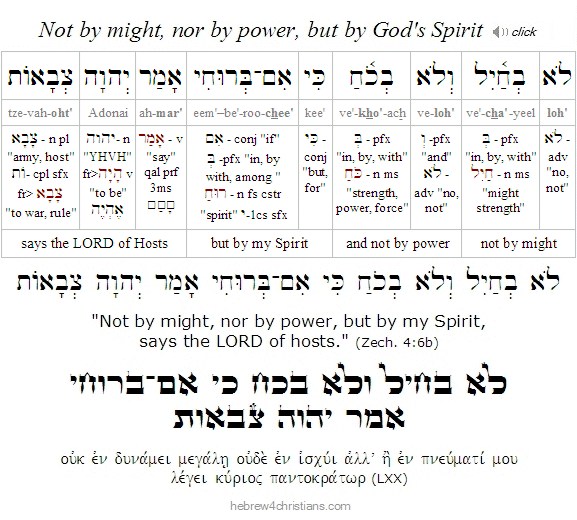 |
 |
True and False Worship...

05.04.20 (Iyyar 10, 5780) Asks the Savior: "Why do you call me 'Lord, Lord,' and not do what I tell you?" (Luke 6:46). Regarding this question Kierkegaard comments: "True worship quite simply consists in doing God's will. But that kind of worship was never to people's liking. What occupies people in every age is to arrange another kind of worship that consists of doing their own will, but in such a way that God's name, calling upon God, is connected with it, whereby people think themselves protected against being ungodly – alas, although precisely this is the most definite kind of ungodliness" (The Moment: 1854). It is easy to go wrong here. The will of God is forever to trust in his Son, and indeed, this is the "work of God" (John 6:28-29). Yet this means suffering for God, needing him, yearning for his daily blessing, being abandoned to his care for your life... When out of the depth of our need – without pretense and in despair over ourselves – we cry out to the LORD, he will surely help us. As it is written: "If we ask according to his will, he hears us" (1 John 5:14), and therefore it is the heart's need for Him that is the will of God...
"Not everyone who says to me, 'Lord, Lord,' will enter the kingdom of heaven, but the one who does the will of my Father who is in heaven. On that day many will say to me, 'Lord, Lord, did we not prophesy in your name, and cast out demons in your name, and do many mighty works in your name?' And then will I declare to them, 'I never knew you; depart from me, you workers of lawlessness'" (Matt. 7:21-23). Despite the profession and practice of their faith, these people were strangers to God... They had a false sense of assurance, believing that they were "serving God" while they really were not... Therefore the essential question here is whether Yeshua truly knows you and the need of your heart. You may know a lot about God, religion, spirituality, and yet you may remain unknown by him... Where do you find life? What are you loving? Where are you going?
"On that day many will say to me, 'Lord, Lord, did we not ... do many mighty works in your name?' And then will I declare to them, 'I never knew you" (Matt. 7:22-23). From this we understand that good works - even those done in the name of Messiah - are insufficient for life, and that something more is needed... That "something more" is the reality of relationship with him. However, even Yeshua's sacrifice on the cross can't bring you into relationship with him apart from personally receiving it for your healing... By faith you encounter Yeshua clothed in your flesh, your sin, and suffering death for you. "As long as Christ remains outside of us we are separated from him."
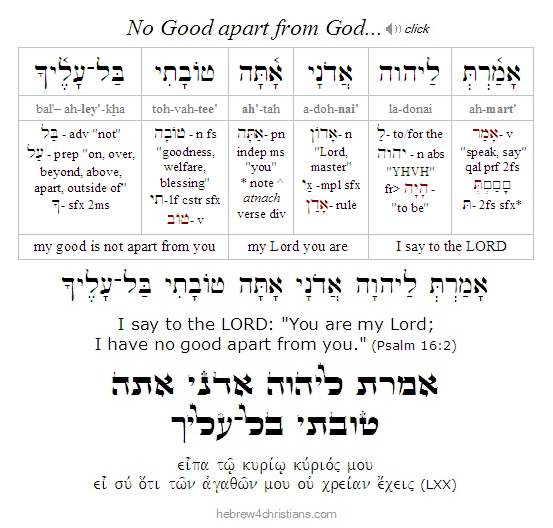 |
 |
Passion and Torah...

05.04.20 (Iyyar 10, 5780) From our Torah we read: "You shall therefore keep my decrees and my judgments (chukkot u'mishpatim); if a person does them, he shall live by them: I am the LORD" (Lev. 18:5). This idea is repeated later in the Torah, when Moses admonished Israel: "The whole commandment that I command you today you shall observe and do, so that you may live..." (Deut. 8:1). The Hebrew phrase kol ha'mitzvah (כָּל־הַמִּצְוָה), here translated as "the whole commandment," refers to the heart attitude, or the inner passion of the soul. Some have linked the word "commandment" (מִצְוָה) with the word "connection" (צוותא), suggesting that God's commandments are the means by which we cleave to Him, as is written: "this is the love of God (אַהֲבַת אֱלהִים), that we keep his commandments" (1 John 5:3). The commandments are "for life" (Lev. 18:5), which means they serve as the call of the Beloved to rise to something far greater... The "Whole Commandment," then, is the path of God's love. As it is written, tamim yiyeh im Adonai Elohekha: "You shall be wholehearted with the LORD your God" (Deut. 18:13), and "fear God and keep his commandments - ki zeh kol-ha'adam - כִּי־זֶה כָּל־הָאָדָם - for this is the whole man" (Eccl. 12:13).
We should never imagine that the whole purpose of the Torah is its outer form, but rather the inward meaning. Indeed, the sacrificial blood for our atonement was placed over the tablets of the law (i.e., the blood sprinkled on the kapporet, or the "crown" of the Ark), inside the darkness of the Holy of Holies, just as Yeshua offered up his blood in the dark cloud during his crucifixion (Matt. 27:45-46; Luke 23:45-46). The life is "in the blood," which represents God's passion, the deepest truth of Torah. And this is the message of the gospel itself, of course, since the blood of Yeshua passionately shed for our sake has opened up a new and everlasting way for us to be rightly related to God (Heb. 9:12).
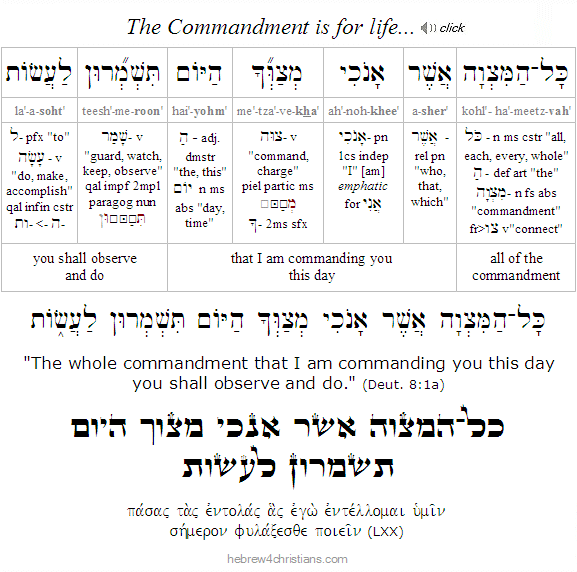 |
 |
Respect Precedes Torah...

05.04.20 (Iyyar 10, 5780) A fundamental axiom of the "godward life" may be summarized as "respect precedes Torah" (דרך ארץ קדמה לתורה), which means that we must esteem ourselves and others properly as image bearers of God. This is foundational to all else. We must first care; we must be willing to give up our sickness; we must want to be healed. This also means that we are willing to give up blaming others and confess the truth about how we have brought pain to our lives. After we learn to forgive ourselves, we can let go of the pain, the weary anger, and forgive others of their missteps, too. It is impossible to be joyful apart from such humility. Therefore each of us must rebuff demonic impulses and turn to God for healing. And we must beseech the Lord to help us stay awake and to resist being lulled back into the unconsciousness of the world and its delusions.
Theodor Herzl Day...
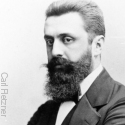
05.03.20 (Iyyar 9, 5780) Today is "Herzl Day" in Israel (i.e., Yom Herztl: יום הרצל), a national holiday established by the Knesset to commemorate the achievements and Zionist vision of Theodor Herzl (1860-1904), a man considered by many to be the father of the modern State of Israel. During Herzl Day a memorial service held on Mount Herzl in Jerusalem, the site of Israel's national cemetery, where Herzl's tomb is located.
In this connection it should be noted that though Herzl was a remarkable man, he was greatly helped by Christians who foresaw the vision of Zion and the reestablishment of the State of Israel and who therefore assisted him by providing support for his political vision.
Note: For more information about Herzl Day, click here.
Parashat Emor - אמור
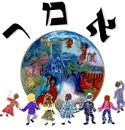
05.03.20 (Iyyar 9, 5780) Our Torah portion for this week (parashat Emor) lists the eight main holidays explained in the Jewish Scriptures. In the Torah, these "holidays" are called "appointed times" (i.e., mo'edim: מוֹעֲדִים), a word which comes from the Hebrew root meaning "witness" (עֵד). Other words from this root include edah (עֵדָה), a "congregation," edut (עֵדוּת), a "testimony," and so on. The related verb ya'ad (יָעַד) means "to meet," "to assemble," or even "to betroth." The significance of the holy days, then, is for the covenant people of the LORD to bear witness to God's love and faithfulness. As it is written:
כל־ארחות יהוה חסד ואמת
לנצרי בריתו ועדתיו
kohl - or·khot · Adonai · che'·sed · ve·e·met
le·no·tze·rei · ve·ree·to · ve·e·do·tahv

"All the paths of the LORD are compassion and truth
to those keeping his covenant and his testimonies."
(Psalm 25:10)

Hebrew Study Card

Metaphorically the "paths of the Lord" (i.e., orechot Adonai: ארחות יהוה) are likened to ruts or grooves created by the wheels of a caravan (i.e., orechah: ארְחָה) passing repeatedly over the same ground. These paths signify the Divine Presence journeying with God's children in this world. In temporal terms, we are able to discern the path by means of the divine calendar. God's love and faithfulness attend to His covenant (brit) and to the commemorations of the yearly "appointed times" that testify of God's faithful love. Keeping God's testimonies, then, means that we will be careful to observe the holidays in order to witness to God's truth...
"Speak to the people of Israel and say to them, 'These are the appointed times of the LORD (מוֹעֲדֵי יְהוָה) that you shall proclaim as holy convocations (מִקְרָאֵי קדֶשׁ); they are My appointed times'" (Lev. 23:2). Note that these hallowed times - the very first of which is the weekly Sabbath - are "of the LORD," and that means they should be regarded as appointments given by God Himself to help draw us closer to Him, to reveal His prophetic truth, and to remind ourselves of His great plan for our lives. God did not give us the Torah in vain, friends, neither does He speak out of two sides of his his mouth... Yeshua was the Voice of the LORD speaking the words of Torah to Israel at Sinai, and therefore every "jot and tittle" (קוֹצוֹ שֶׁל יוֹד) is indeed relevant to our lives as his followers (Matt. 5:18-19).
Rejoicing in Hope...

05.01.20 (Iyyar 7, 5780) "Rejoice in the Lord always, and again I say rejoice" (Phil. 4:4). In this world, such praise is truly counter-cultural, radical, and in defiance of all worldly scorn, mockery, fear and despair... The heart of faith affirms, on the other hand, that "whether we live or whether we die, we are the Lord's" (Rom 14:8), and that the LORD has given us the cheer of victory (נִצָחוֹן) and the song of life (שיר החיים) that rises above the despondent clamor of this moribund world. Therefore we do exult in the sacred triumph of Yeshua over all the powers of sin and death (1 Cor. 15:57). Rejoice, dear friends, because we are healed – eternally and everlastingly – by the love of God that frees us from our sins and bestows upon us a never-ending and all-consuming grace. כל הנשׁמה תהלל יה הללו־יה – "Let everything that has breath praise the LORD! Praise ye the LORD!" (Psalm 150:6). Shabbat Shalom!
Keeping a Joyful Focus...

05.01.20 (Iyyar 7, 5780) We are to take "every thought captive" to the truth of Messiah (2 Cor. 10:5). Practically speaking, this means that whenever you "catch yourself" thinking a negative thought, you reject it instantly and turn your attention to the Presence of God. As King David said, שִׁוִּיתִי יהוה לְנֶגְדִּי תָמִיד - "I have set the Lord always before me" (Psalm 16:8). This is the first act of will that opens the "path of life" (ארַח חַיִּים) and discovers the place (הַמָּקוֹם) of fullness of joy (Psalm 16:11). Make the decision to believe, friend. This is not too difficult for you, neither is it far off, "for the matter is very near you; it is in your mouth and in your heart, so that you can do it" (Deut. 30:14).
שׁויתי יהוה לנגדי תמיד
כי מימיני בל־אמוט
shee·vee'·tee · Adonai · le·neg·dee · ta·meed
kee · mee·mee·nee · bal · e·moht

"I have set the LORD always before me;
because he is at my right hand, I shall not be shaken"
(Psalm 16:8)
Hebrew Study Card

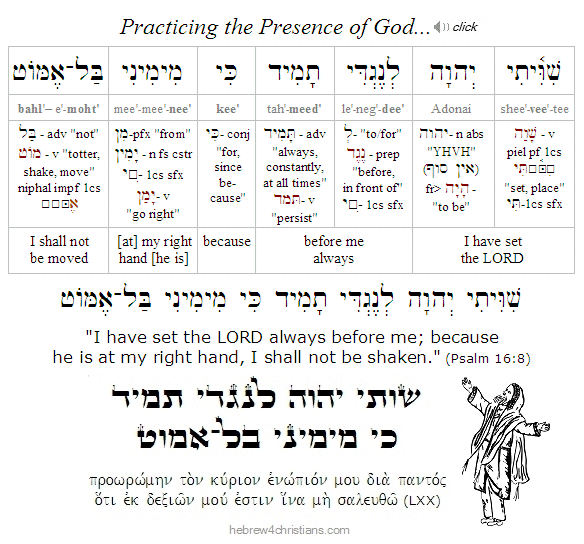
The devil's strategy is as banal as it is tedious, namely, to seduce us to forget the truth of God and to live in a state of virtual exile and pain. Therefore Shema - listen and remember - is the basic commandment. Since the LORD is the Center of all that is real, to become anxious is to "practice the absence" of God's presence instead of practicing His Presence. We have to remember the future, as well as the present and past.... Watch, for the hour draws near!
Standing for the Truth...

[ The following is related to our Torah reading this week, parashat Kedoshim... ]
05.01.20 (Iyyar 7, 5780) Our Torah portion this week (i.e., parashat Kedoshim) includes the statement, Lo ta'amod al dahm re'ekha: "You must not stand idly by when your neighbor's life is at stake" (Lev. 19:16). The principle of lo ta'amod (לא תַעֲמד) means that we have a moral duty to speak the truth when others are victimized. "Standing idly by" can therefore mean refusing to come forward with the truth about a situation from fear of the consequences, but it can also mean excusing the sin of our culture and of our friends. "A truthful witness (עֵד אֱמֶת) rescues lives, but the one who breathes lies (יָפִחַ כְּזָבִים) brings deception" (Prov. 14:25). As it is written, "You shall not spread a false report. You shall not join hands with a wicked man to be a malicious witness (עֵד חָמָס)" (Exod. 23:1). It is the truth that sets people free to serve God, but this presupposes the ability to discern how we all become enslaved to deception. "You are to distinguish between the holy (i.e., ha-kadosh: הַקּדֶשׁ) and the common (i.e., ha-chol: הַחל), and between the unclean (i.e., ha-tamei: הַטָּמֵא) and the clean (i.e., ha-tahor: הַטָּהוֹר)" (Lev. 10:10, see also Ezek. 44:23). Just as God separated the light from the darkness (Gen. 1:4), so we are called to discern between (בֵּין) the realms of the holy and the profane, the sacred and the common, and the clean and the unclean. Indeed, the Torah states "God called the light Day, and the darkness he called night," thereby associating His Name with the light but not with the darkness (Gen. 1:5). "For you all are sons of the light and sons of the day. We are not of the night nor of the darkness" (1 Thess. 5:5). We are instructed therefore to wear the "armor of light" (Rom. 13:12) and to be equipped to wage spiritual warfare in God's Name (Eph. 6:11-18).
Yeshua testified before the godless rulers of this world: "For this reason I was born, and for this reason I came into the world - to testify to the truth. Everyone who belongs to the truth listens to my voice" (John 18:38). The people of God are the people of truth! For more on this topic, see "Parashat Kedoshim: Battle Against the Lie."
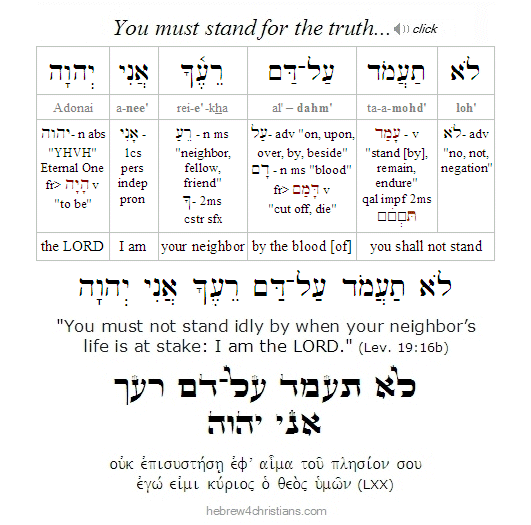 |
 |
|













































































